

Is Time Travel Possible?
We all travel in time! We travel one year in time between birthdays, for example. And we are all traveling in time at approximately the same speed: 1 second per second.
We typically experience time at one second per second. Credit: NASA/JPL-Caltech
NASA's space telescopes also give us a way to look back in time. Telescopes help us see stars and galaxies that are very far away . It takes a long time for the light from faraway galaxies to reach us. So, when we look into the sky with a telescope, we are seeing what those stars and galaxies looked like a very long time ago.
However, when we think of the phrase "time travel," we are usually thinking of traveling faster than 1 second per second. That kind of time travel sounds like something you'd only see in movies or science fiction books. Could it be real? Science says yes!

This image from the Hubble Space Telescope shows galaxies that are very far away as they existed a very long time ago. Credit: NASA, ESA and R. Thompson (Univ. Arizona)
How do we know that time travel is possible?
More than 100 years ago, a famous scientist named Albert Einstein came up with an idea about how time works. He called it relativity. This theory says that time and space are linked together. Einstein also said our universe has a speed limit: nothing can travel faster than the speed of light (186,000 miles per second).
Einstein's theory of relativity says that space and time are linked together. Credit: NASA/JPL-Caltech
What does this mean for time travel? Well, according to this theory, the faster you travel, the slower you experience time. Scientists have done some experiments to show that this is true.
For example, there was an experiment that used two clocks set to the exact same time. One clock stayed on Earth, while the other flew in an airplane (going in the same direction Earth rotates).
After the airplane flew around the world, scientists compared the two clocks. The clock on the fast-moving airplane was slightly behind the clock on the ground. So, the clock on the airplane was traveling slightly slower in time than 1 second per second.
Credit: NASA/JPL-Caltech
Can we use time travel in everyday life?
We can't use a time machine to travel hundreds of years into the past or future. That kind of time travel only happens in books and movies. But the math of time travel does affect the things we use every day.
For example, we use GPS satellites to help us figure out how to get to new places. (Check out our video about how GPS satellites work .) NASA scientists also use a high-accuracy version of GPS to keep track of where satellites are in space. But did you know that GPS relies on time-travel calculations to help you get around town?
GPS satellites orbit around Earth very quickly at about 8,700 miles (14,000 kilometers) per hour. This slows down GPS satellite clocks by a small fraction of a second (similar to the airplane example above).
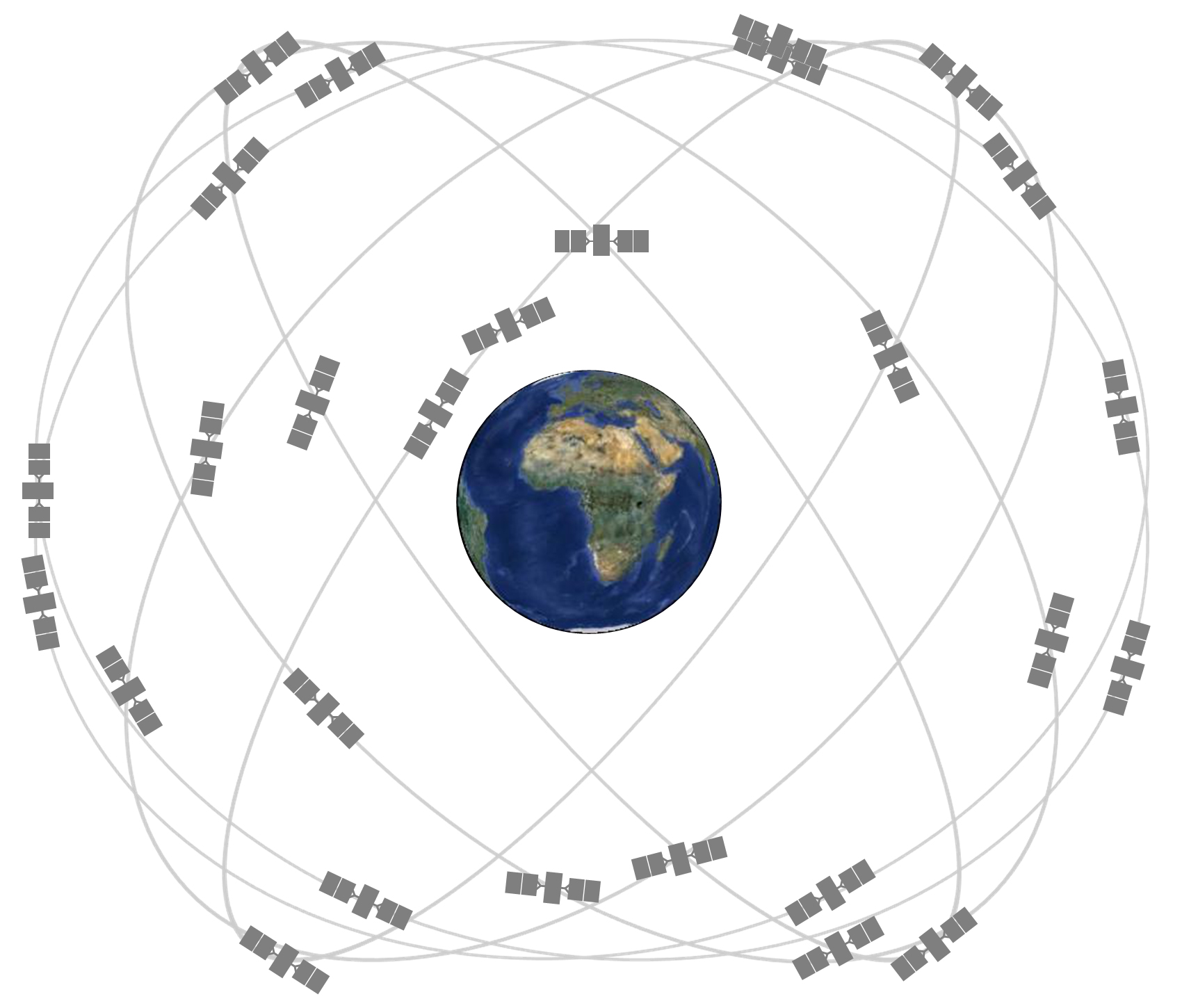
GPS satellites orbit around Earth at about 8,700 miles (14,000 kilometers) per hour. Credit: GPS.gov
However, the satellites are also orbiting Earth about 12,550 miles (20,200 km) above the surface. This actually speeds up GPS satellite clocks by a slighter larger fraction of a second.
Here's how: Einstein's theory also says that gravity curves space and time, causing the passage of time to slow down. High up where the satellites orbit, Earth's gravity is much weaker. This causes the clocks on GPS satellites to run faster than clocks on the ground.
The combined result is that the clocks on GPS satellites experience time at a rate slightly faster than 1 second per second. Luckily, scientists can use math to correct these differences in time.

If scientists didn't correct the GPS clocks, there would be big problems. GPS satellites wouldn't be able to correctly calculate their position or yours. The errors would add up to a few miles each day, which is a big deal. GPS maps might think your home is nowhere near where it actually is!
In Summary:
Yes, time travel is indeed a real thing. But it's not quite what you've probably seen in the movies. Under certain conditions, it is possible to experience time passing at a different rate than 1 second per second. And there are important reasons why we need to understand this real-world form of time travel.
If you liked this, you may like:
April 26, 2023
Is Time Travel Possible?
The laws of physics allow time travel. So why haven’t people become chronological hoppers?
By Sarah Scoles

yuanyuan yan/Getty Images
In the movies, time travelers typically step inside a machine and—poof—disappear. They then reappear instantaneously among cowboys, knights or dinosaurs. What these films show is basically time teleportation .
Scientists don’t think this conception is likely in the real world, but they also don’t relegate time travel to the crackpot realm. In fact, the laws of physics might allow chronological hopping, but the devil is in the details.
Time traveling to the near future is easy: you’re doing it right now at a rate of one second per second, and physicists say that rate can change. According to Einstein’s special theory of relativity, time’s flow depends on how fast you’re moving. The quicker you travel, the slower seconds pass. And according to Einstein’s general theory of relativity , gravity also affects clocks: the more forceful the gravity nearby, the slower time goes.
On supporting science journalism
If you're enjoying this article, consider supporting our award-winning journalism by subscribing . By purchasing a subscription you are helping to ensure the future of impactful stories about the discoveries and ideas shaping our world today.
“Near massive bodies—near the surface of neutron stars or even at the surface of the Earth, although it’s a tiny effect—time runs slower than it does far away,” says Dave Goldberg, a cosmologist at Drexel University.
If a person were to hang out near the edge of a black hole , where gravity is prodigious, Goldberg says, only a few hours might pass for them while 1,000 years went by for someone on Earth. If the person who was near the black hole returned to this planet, they would have effectively traveled to the future. “That is a real effect,” he says. “That is completely uncontroversial.”
Going backward in time gets thorny, though (thornier than getting ripped to shreds inside a black hole). Scientists have come up with a few ways it might be possible, and they have been aware of time travel paradoxes in general relativity for decades. Fabio Costa, a physicist at the Nordic Institute for Theoretical Physics, notes that an early solution with time travel began with a scenario written in the 1920s. That idea involved massive long cylinder that spun fast in the manner of straw rolled between your palms and that twisted spacetime along with it. The understanding that this object could act as a time machine allowing one to travel to the past only happened in the 1970s, a few decades after scientists had discovered a phenomenon called “closed timelike curves.”
“A closed timelike curve describes the trajectory of a hypothetical observer that, while always traveling forward in time from their own perspective, at some point finds themselves at the same place and time where they started, creating a loop,” Costa says. “This is possible in a region of spacetime that, warped by gravity, loops into itself.”
“Einstein read [about closed timelike curves] and was very disturbed by this idea,” he adds. The phenomenon nevertheless spurred later research.
Science began to take time travel seriously in the 1980s. In 1990, for instance, Russian physicist Igor Novikov and American physicist Kip Thorne collaborated on a research paper about closed time-like curves. “They started to study not only how one could try to build a time machine but also how it would work,” Costa says.
Just as importantly, though, they investigated the problems with time travel. What if, for instance, you tossed a billiard ball into a time machine, and it traveled to the past and then collided with its past self in a way that meant its present self could never enter the time machine? “That looks like a paradox,” Costa says.
Since the 1990s, he says, there’s been on-and-off interest in the topic yet no big breakthrough. The field isn’t very active today, in part because every proposed model of a time machine has problems. “It has some attractive features, possibly some potential, but then when one starts to sort of unravel the details, there ends up being some kind of a roadblock,” says Gaurav Khanna of the University of Rhode Island.
For instance, most time travel models require negative mass —and hence negative energy because, as Albert Einstein revealed when he discovered E = mc 2 , mass and energy are one and the same. In theory, at least, just as an electric charge can be positive or negative, so can mass—though no one’s ever found an example of negative mass. Why does time travel depend on such exotic matter? In many cases, it is needed to hold open a wormhole—a tunnel in spacetime predicted by general relativity that connects one point in the cosmos to another.
Without negative mass, gravity would cause this tunnel to collapse. “You can think of it as counteracting the positive mass or energy that wants to traverse the wormhole,” Goldberg says.
Khanna and Goldberg concur that it’s unlikely matter with negative mass even exists, although Khanna notes that some quantum phenomena show promise, for instance, for negative energy on very small scales. But that would be “nowhere close to the scale that would be needed” for a realistic time machine, he says.
These challenges explain why Khanna initially discouraged Caroline Mallary, then his graduate student at the University of Massachusetts Dartmouth, from doing a time travel project. Mallary and Khanna went forward anyway and came up with a theoretical time machine that didn’t require negative mass. In its simplistic form, Mallary’s idea involves two parallel cars, each made of regular matter. If you leave one parked and zoom the other with extreme acceleration, a closed timelike curve will form between them.
Easy, right? But while Mallary’s model gets rid of the need for negative matter, it adds another hurdle: it requires infinite density inside the cars for them to affect spacetime in a way that would be useful for time travel. Infinite density can be found inside a black hole, where gravity is so intense that it squishes matter into a mind-bogglingly small space called a singularity. In the model, each of the cars needs to contain such a singularity. “One of the reasons that there's not a lot of active research on this sort of thing is because of these constraints,” Mallary says.
Other researchers have created models of time travel that involve a wormhole, or a tunnel in spacetime from one point in the cosmos to another. “It's sort of a shortcut through the universe,” Goldberg says. Imagine accelerating one end of the wormhole to near the speed of light and then sending it back to where it came from. “Those two sides are no longer synced,” he says. “One is in the past; one is in the future.” Walk between them, and you’re time traveling.
You could accomplish something similar by moving one end of the wormhole near a big gravitational field—such as a black hole—while keeping the other end near a smaller gravitational force. In that way, time would slow down on the big gravity side, essentially allowing a particle or some other chunk of mass to reside in the past relative to the other side of the wormhole.
Making a wormhole requires pesky negative mass and energy, however. A wormhole created from normal mass would collapse because of gravity. “Most designs tend to have some similar sorts of issues,” Goldberg says. They’re theoretically possible, but there’s currently no feasible way to make them, kind of like a good-tasting pizza with no calories.
And maybe the problem is not just that we don’t know how to make time travel machines but also that it’s not possible to do so except on microscopic scales—a belief held by the late physicist Stephen Hawking. He proposed the chronology protection conjecture: The universe doesn’t allow time travel because it doesn’t allow alterations to the past. “It seems there is a chronology protection agency, which prevents the appearance of closed timelike curves and so makes the universe safe for historians,” Hawking wrote in a 1992 paper in Physical Review D .
Part of his reasoning involved the paradoxes time travel would create such as the aforementioned situation with a billiard ball and its more famous counterpart, the grandfather paradox : If you go back in time and kill your grandfather before he has children, you can’t be born, and therefore you can’t time travel, and therefore you couldn’t have killed your grandfather. And yet there you are.
Those complications are what interests Massachusetts Institute of Technology philosopher Agustin Rayo, however, because the paradoxes don’t just call causality and chronology into question. They also make free will seem suspect. If physics says you can go back in time, then why can’t you kill your grandfather? “What stops you?” he says. Are you not free?
Rayo suspects that time travel is consistent with free will, though. “What’s past is past,” he says. “So if, in fact, my grandfather survived long enough to have children, traveling back in time isn’t going to change that. Why will I fail if I try? I don’t know because I don’t have enough information about the past. What I do know is that I’ll fail somehow.”
If you went to kill your grandfather, in other words, you’d perhaps slip on a banana en route or miss the bus. “It's not like you would find some special force compelling you not to do it,” Costa says. “You would fail to do it for perfectly mundane reasons.”
In 2020 Costa worked with Germain Tobar, then his undergraduate student at the University of Queensland in Australia, on the math that would underlie a similar idea: that time travel is possible without paradoxes and with freedom of choice.
Goldberg agrees with them in a way. “I definitely fall into the category of [thinking that] if there is time travel, it will be constructed in such a way that it produces one self-consistent view of history,” he says. “Because that seems to be the way that all the rest of our physical laws are constructed.”
No one knows what the future of time travel to the past will hold. And so far, no time travelers have come to tell us about it.

- Table of Contents
- Random Entry
- Chronological
- Editorial Information
- About the SEP
- Editorial Board
- How to Cite the SEP
- Special Characters
- Advanced Tools
- Support the SEP
- PDFs for SEP Friends
- Make a Donation
- SEPIA for Libraries
- Entry Contents
Bibliography
Academic tools.
- Friends PDF Preview
- Author and Citation Info
- Back to Top
Time Travel
There is an extensive literature on time travel in both philosophy and physics. Part of the great interest of the topic stems from the fact that reasons have been given both for thinking that time travel is physically possible—and for thinking that it is logically impossible! This entry deals primarily with philosophical issues; issues related to the physics of time travel are covered in the separate entries on time travel and modern physics and time machines . We begin with the definitional question: what is time travel? We then turn to the major objection to the possibility of backwards time travel: the Grandfather paradox. Next, issues concerning causation are discussed—and then, issues in the metaphysics of time and change. We end with a discussion of the question why, if backwards time travel will ever occur, we have not been visited by time travellers from the future.
1.1 Time Discrepancy
1.2 changing the past, 2.1 can and cannot, 2.2 improbable coincidences, 2.3 inexplicable occurrences, 3.1 backwards causation, 3.2 causal loops, 4.1 time travel and time, 4.2 time travel and change, 5. where are the time travellers, other internet resources, related entries, 1. what is time travel.
There is a number of rather different scenarios which would seem, intuitively, to count as ‘time travel’—and a number of scenarios which, while sharing certain features with some of the time travel cases, seem nevertheless not to count as genuine time travel: [ 1 ]
Time travel Doctor . Doctor Who steps into a machine in 2024. Observers outside the machine see it disappear. Inside the machine, time seems to Doctor Who to pass for ten minutes. Observers in 1984 (or 3072) see the machine appear out of nowhere. Doctor Who steps out. [ 2 ] Leap . The time traveller takes hold of a special device (or steps into a machine) and suddenly disappears; she appears at an earlier (or later) time. Unlike in Doctor , the time traveller experiences no lapse of time between her departure and arrival: from her point of view, she instantaneously appears at the destination time. [ 3 ] Putnam . Oscar Smith steps into a machine in 2024. From his point of view, things proceed much as in Doctor : time seems to Oscar Smith to pass for a while; then he steps out in 1984. For observers outside the machine, things proceed differently. Observers of Oscar’s arrival in the past see a time machine suddenly appear out of nowhere and immediately divide into two copies of itself: Oscar Smith steps out of one; and (through the window) they see inside the other something that looks just like what they would see if a film of Oscar Smith were played backwards (his hair gets shorter; food comes out of his mouth and goes back into his lunch box in a pristine, uneaten state; etc.). Observers of Oscar’s departure from the future do not simply see his time machine disappear after he gets into it: they see it collide with the apparently backwards-running machine just described, in such a way that both are simultaneously annihilated. [ 4 ] Gödel . The time traveller steps into an ordinary rocket ship (not a special time machine) and flies off on a certain course. At no point does she disappear (as in Leap ) or ‘turn back in time’ (as in Putnam )—yet thanks to the overall structure of spacetime (as conceived in the General Theory of Relativity), the traveller arrives at a point in the past (or future) of her departure. (Compare the way in which someone can travel continuously westwards, and arrive to the east of her departure point, thanks to the overall curved structure of the surface of the earth.) [ 5 ] Einstein . The time traveller steps into an ordinary rocket ship and flies off at high speed on a round trip. When he returns to Earth, thanks to certain effects predicted by the Special Theory of Relativity, only a very small amount of time has elapsed for him—he has aged only a few months—while a great deal of time has passed on Earth: it is now hundreds of years in the future of his time of departure. [ 6 ] Not time travel Sleep . One is very tired, and falls into a deep sleep. When one awakes twelve hours later, it seems from one’s own point of view that hardly any time has passed. Coma . One is in a coma for a number of years and then awakes, at which point it seems from one’s own point of view that hardly any time has passed. Cryogenics . One is cryogenically frozen for hundreds of years. Upon being woken, it seems from one’s own point of view that hardly any time has passed. Virtual . One enters a highly realistic, interactive virtual reality simulator in which some past era has been recreated down to the finest detail. Crystal . One looks into a crystal ball and sees what happened at some past time, or will happen at some future time. (Imagine that the crystal ball really works—like a closed-circuit security monitor, except that the vision genuinely comes from some past or future time. Even so, the person looking at the crystal ball is not thereby a time traveller.) Waiting . One enters one’s closet and stays there for seven hours. When one emerges, one has ‘arrived’ seven hours in the future of one’s ‘departure’. Dateline . One departs at 8pm on Monday, flies for fourteen hours, and arrives at 10pm on Monday.
A satisfactory definition of time travel would, at least, need to classify the cases in the right way. There might be some surprises—perhaps, on the best definition of ‘time travel’, Cryogenics turns out to be time travel after all—but it should certainly be the case, for example, that Gödel counts as time travel and that Sleep and Waiting do not. [ 7 ]
In fact there is no entirely satisfactory definition of ‘time travel’ in the literature. The most popular definition is the one given by Lewis (1976, 145–6):
What is time travel? Inevitably, it involves a discrepancy between time and time. Any traveller departs and then arrives at his destination; the time elapsed from departure to arrival…is the duration of the journey. But if he is a time traveller, the separation in time between departure and arrival does not equal the duration of his journey.…How can it be that the same two events, his departure and his arrival, are separated by two unequal amounts of time?…I reply by distinguishing time itself, external time as I shall also call it, from the personal time of a particular time traveller: roughly, that which is measured by his wristwatch. His journey takes an hour of his personal time, let us say…But the arrival is more than an hour after the departure in external time, if he travels toward the future; or the arrival is before the departure in external time…if he travels toward the past.
This correctly excludes Waiting —where the length of the ‘journey’ precisely matches the separation between ‘arrival’ and ‘departure’—and Crystal , where there is no journey at all—and it includes Doctor . It has trouble with Gödel , however—because when the overall structure of spacetime is as twisted as it is in the sort of case Gödel imagined, the notion of external time (“time itself”) loses its grip.
Another definition of time travel that one sometimes encounters in the literature (Arntzenius, 2006, 602) (Smeenk and Wüthrich, 2011, 5, 26) equates time travel with the existence of CTC’s: closed timelike curves. A curve in this context is a line in spacetime; it is timelike if it could represent the career of a material object; and it is closed if it returns to its starting point (i.e. in spacetime—not merely in space). This now includes Gödel —but it excludes Einstein .
The lack of an adequate definition of ‘time travel’ does not matter for our purposes here. [ 8 ] It suffices that we have clear cases of (what would count as) time travel—and that these cases give rise to all the problems that we shall wish to discuss.
Some authors (in philosophy, physics and science fiction) consider ‘time travel’ scenarios in which there are two temporal dimensions (e.g. Meiland (1974)), and others consider scenarios in which there are multiple ‘parallel’ universes—each one with its own four-dimensional spacetime (e.g. Deutsch and Lockwood (1994)). There is a question whether travelling to another version of 2001 (i.e. not the very same version one experienced in the past)—a version at a different point on the second time dimension, or in a different parallel universe—is really time travel, or whether it is more akin to Virtual . In any case, this kind of scenario does not give rise to many of the problems thrown up by the idea of travelling to the very same past one experienced in one’s younger days. It is these problems that form the primary focus of the present entry, and so we shall not have much to say about other kinds of ‘time travel’ scenario in what follows.
One objection to the possibility of time travel flows directly from attempts to define it in anything like Lewis’s way. The worry is that because time travel involves “a discrepancy between time and time”, time travel scenarios are simply incoherent. The time traveller traverses thirty years in one year; she is 51 years old 21 years after her birth; she dies at the age of 100, 200 years before her birth; and so on. The objection is that these are straightforward contradictions: the basic description of what time travel involves is inconsistent; therefore time travel is logically impossible. [ 9 ]
There must be something wrong with this objection, because it would show Einstein to be logically impossible—whereas this sort of future-directed time travel has actually been observed (albeit on a much smaller scale—but that does not affect the present point) (Hafele and Keating, 1972b,a). The most common response to the objection is that there is no contradiction because the interval of time traversed by the time traveller and the duration of her journey are measured with respect to different frames of reference: there is thus no reason why they should coincide. A similar point applies to the discrepancy between the time elapsed since the time traveller’s birth and her age upon arrival. There is no more of a contradiction here than in the fact that Melbourne is both 800 kilometres away from Sydney—along the main highway—and 1200 kilometres away—along the coast road. [ 10 ]
Before leaving the question ‘What is time travel?’ we should note the crucial distinction between changing the past and participating in (aka affecting or influencing) the past. [ 11 ] In the popular imagination, backwards time travel would allow one to change the past: to right the wrongs of history, to prevent one’s younger self doing things one later regretted, and so on. In a model with a single past, however, this idea is incoherent: the very description of the case involves a contradiction (e.g. the time traveller burns all her diaries at midnight on her fortieth birthday in 1976, and does not burn all her diaries at midnight on her fortieth birthday in 1976). It is not as if there are two versions of the past: the original one, without the time traveller present, and then a second version, with the time traveller playing a role. There is just one past—and two perspectives on it: the perspective of the younger self, and the perspective of the older time travelling self. If these perspectives are inconsistent (e.g. an event occurs in one but not the other) then the time travel scenario is incoherent.
This means that time travellers can do less than we might have hoped: they cannot right the wrongs of history; they cannot even stir a speck of dust on a certain day in the past if, on that day, the speck was in fact unmoved. But this does not mean that time travellers must be entirely powerless in the past: while they cannot do anything that did not actually happen, they can (in principle) do anything that did happen. Time travellers cannot change the past: they cannot make it different from the way it was—but they can participate in it: they can be amongst the people who did make the past the way it was. [ 12 ]
What about models involving two temporal dimensions, or parallel universes—do they allow for coherent scenarios in which the past is changed? [ 13 ] There is certainly no contradiction in saying that the time traveller burns all her diaries at midnight on her fortieth birthday in 1976 in universe 1 (or at hypertime A ), and does not burn all her diaries at midnight on her fortieth birthday in 1976 in universe 2 (or at hypertime B ). The question is whether this kind of story involves changing the past in the sense originally envisaged: righting the wrongs of history, preventing subsequently regretted actions, and so on. Goddu (2003) and van Inwagen (2010) argue that it does (in the context of particular hypertime models), while Smith (1997, 365–6; 2015) argues that it does not: that it involves avoiding the past—leaving it untouched while travelling to a different version of the past in which things proceed differently.
2. The Grandfather Paradox
The most important objection to the logical possibility of backwards time travel is the so-called Grandfather paradox. This paradox has actually convinced many people that backwards time travel is impossible:
The dead giveaway that true time-travel is flatly impossible arises from the well-known “paradoxes” it entails. The classic example is “What if you go back into the past and kill your grandfather when he was still a little boy?”…So complex and hopeless are the paradoxes…that the easiest way out of the irrational chaos that results is to suppose that true time-travel is, and forever will be, impossible. (Asimov 1995 [2003, 276–7]) travel into one’s past…would seem to give rise to all sorts of logical problems, if you were able to change history. For example, what would happen if you killed your parents before you were born. It might be that one could avoid such paradoxes by some modification of the concept of free will. But this will not be necessary if what I call the chronology protection conjecture is correct: The laws of physics prevent closed timelike curves from appearing . (Hawking, 1992, 604) [ 14 ]
The paradox comes in different forms. Here’s one version:
If time travel was logically possible then the time traveller could return to the past and in a suicidal rage destroy his time machine before it was completed and murder his younger self. But if this was so a necessary condition for the time trip to have occurred at all is removed, and we should then conclude that the time trip did not occur. Hence if the time trip did occur, then it did not occur. Hence it did not occur, and it is necessary that it did not occur. To reply, as it is standardly done, that our time traveller cannot change the past in this way, is a petitio principii . Why is it that the time traveller is constrained in this way? What mysterious force stills his sudden suicidal rage? (Smith, 1985, 58)
The idea is that backwards time travel is impossible because if it occurred, time travellers would attempt to do things such as kill their younger selves (or their grandfathers etc.). We know that doing these things—indeed, changing the past in any way—is impossible. But were there time travel, there would then be nothing left to stop these things happening. If we let things get to the stage where the time traveller is facing Grandfather with a loaded weapon, then there is nothing left to prevent the impossible from occurring. So we must draw the line earlier: it must be impossible for someone to get into this situation at all; that is, backwards time travel must be impossible.
In order to defend the possibility of time travel in the face of this argument we need to show that time travel is not a sure route to doing the impossible. So, given that a time traveller has gone to the past and is facing Grandfather, what could stop her killing Grandfather? Some science fiction authors resort to the idea of chaperones or time guardians who prevent time travellers from changing the past—or to mysterious forces of logic. But it is hard to take these ideas seriously—and more importantly, it is hard to make them work in detail when we remember that changing the past is impossible. (The chaperone is acting to ensure that the past remains as it was—but the only reason it ever was that way is because of his very actions.) [ 15 ] Fortunately there is a better response—also to be found in the science fiction literature, and brought to the attention of philosophers by Lewis (1976). What would stop the time traveller doing the impossible? She would fail “for some commonplace reason”, as Lewis (1976, 150) puts it. Her gun might jam, a noise might distract her, she might slip on a banana peel, etc. Nothing more than such ordinary occurrences is required to stop the time traveller killing Grandfather. Hence backwards time travel does not entail the occurrence of impossible events—and so the above objection is defused.
A problem remains. Suppose Tim, a time-traveller, is facing his grandfather with a loaded gun. Can Tim kill Grandfather? On the one hand, yes he can. He is an excellent shot; there is no chaperone to stop him; the laws of logic will not magically stay his hand; he hates Grandfather and will not hesitate to pull the trigger; etc. On the other hand, no he can’t. To kill Grandfather would be to change the past, and no-one can do that (not to mention the fact that if Grandfather died, then Tim would not have been born). So we have a contradiction: Tim can kill Grandfather and Tim cannot kill Grandfather. Time travel thus leads to a contradiction: so it is impossible.
Note the difference between this version of the Grandfather paradox and the version considered above. In the earlier version, the contradiction happens if Tim kills Grandfather. The solution was to say that Tim can go into the past without killing Grandfather—hence time travel does not entail a contradiction. In the new version, the contradiction happens as soon as Tim gets to the past. Of course Tim does not kill Grandfather—but we still have a contradiction anyway: for he both can do it, and cannot do it. As Lewis puts it:
Could a time traveler change the past? It seems not: the events of a past moment could no more change than numbers could. Yet it seems that he would be as able as anyone to do things that would change the past if he did them. If a time traveler visiting the past both could and couldn’t do something that would change it, then there cannot possibly be such a time traveler. (Lewis, 1976, 149)
Lewis’s own solution to this problem has been widely accepted. [ 16 ] It turns on the idea that to say that something can happen is to say that its occurrence is compossible with certain facts, where context determines (more or less) which facts are the relevant ones. Tim’s killing Grandfather in 1921 is compossible with the facts about his weapon, training, state of mind, and so on. It is not compossible with further facts, such as the fact that Grandfather did not die in 1921. Thus ‘Tim can kill Grandfather’ is true in one sense (relative to one set of facts) and false in another sense (relative to another set of facts)—but there is no single sense in which it is both true and false. So there is no contradiction here—merely an equivocation.
Another response is that of Vihvelin (1996), who argues that there is no contradiction here because ‘Tim can kill Grandfather’ is simply false (i.e. contra Lewis, there is no legitimate sense in which it is true). According to Vihvelin, for ‘Tim can kill Grandfather’ to be true, there must be at least some occasions on which ‘If Tim had tried to kill Grandfather, he would or at least might have succeeded’ is true—but, Vihvelin argues, at any world remotely like ours, the latter counterfactual is always false. [ 17 ]
Return to the original version of the Grandfather paradox and Lewis’s ‘commonplace reasons’ response to it. This response engenders a new objection—due to Horwich (1987)—not to the possibility but to the probability of backwards time travel.
Think about correlated events in general. Whenever we see two things frequently occurring together, this is because one of them causes the other, or some third thing causes both. Horwich calls this the Principle of V-Correlation:
if events of type A and B are associated with one another, then either there is always a chain of events between them…or else we find an earlier event of type C that links up with A and B by two such chains of events. What we do not see is…an inverse fork—in which A and B are connected only with a characteristic subsequent event, but no preceding one. (Horwich, 1987, 97–8)
For example, suppose that two students turn up to class wearing the same outfits. That could just be a coincidence (i.e. there is no common cause, and no direct causal link between the two events). If it happens every week for the whole semester, it is possible that it is a coincidence, but this is extremely unlikely . Normally, we see this sort of extensive correlation only if either there is a common cause (e.g. both students have product endorsement deals with the same clothing company, or both slavishly copy the same influencer) or a direct causal link (e.g. one student is copying the other).
Now consider the time traveller setting off to kill her younger self. As discussed, no contradiction need ensue—this is prevented not by chaperones or mysterious forces, but by a run of ordinary occurrences in which the trigger falls off the time traveller’s gun, a gust of wind pushes her bullet off course, she slips on a banana peel, and so on. But now consider this run of ordinary occurrences. Whenever the time traveller contemplates auto-infanticide, someone nearby will drop a banana peel ready for her to slip on, or a bird will begin to fly so that it will be in the path of the time traveller’s bullet by the time she fires, and so on. In general, there will be a correlation between auto-infanticide attempts and foiling occurrences such as the presence of banana peels—and this correlation will be of the type that does not involve a direct causal connection between the correlated events or a common cause of both. But extensive correlations of this sort are, as we saw, extremely rare—so backwards time travel will happen about as often as you will see two people wear the same outfits to class every day of semester, without there being any causal connection between what one wears and what the other wears.
We can set out Horwich’s argument this way:
- If time travel were ever to occur, we should see extensive uncaused correlations.
- It is extremely unlikely that we should ever see extensive uncaused correlations.
- Therefore time travel is extremely unlikely to occur.
The conclusion is not that time travel is impossible, but that we should treat it the way we treat the possibility of, say, tossing a fair coin and getting heads one thousand times in a row. As Price (1996, 278 n.7) puts it—in the context of endorsing Horwich’s conclusion: “the hypothesis of time travel can be made to imply propositions of arbitrarily low probability. This is not a classical reductio, but it is as close as science ever gets.”
Smith (1997) attacks both premisses of Horwich’s argument. Against the first premise, he argues that backwards time travel, in itself, does not entail extensive uncaused correlations. Rather, when we look more closely, we see that time travel scenarios involving extensive uncaused correlations always build in prior coincidences which are themselves highly unlikely. Against the second premise, he argues that, from the fact that we have never seen extensive uncaused correlations, it does not follow that we never shall. This is not inductive scepticism: let us assume (contra the inductive sceptic) that in the absence of any specific reason for thinking things should be different in the future, we are entitled to assume they will continue being the same; still we cannot dismiss a specific reason for thinking the future will be a certain way simply on the basis that things have never been that way in the past. You might reassure an anxious friend that the sun will certainly rise tomorrow because it always has in the past—but you cannot similarly refute an astronomer who claims to have discovered a specific reason for thinking that the earth will stop rotating overnight.
Sider (2002, 119–20) endorses Smith’s second objection. Dowe (2003) criticises Smith’s first objection, but agrees with the second, concluding overall that time travel has not been shown to be improbable. Ismael (2003) reaches a similar conclusion. Goddu (2007) criticises Smith’s first objection to Horwich. Further contributions to the debate include Arntzenius (2006), Smeenk and Wüthrich (2011, §2.2) and Elliott (2018). For other arguments to the same conclusion as Horwich’s—that time travel is improbable—see Ney (2000) and Effingham (2020).
Return again to the original version of the Grandfather paradox and Lewis’s ‘commonplace reasons’ response to it. This response engenders a further objection. The autoinfanticidal time traveller is attempting to do something impossible (render herself permanently dead from an age younger than her age at the time of the attempts). Suppose we accept that she will not succeed and that what will stop her is a succession of commonplace occurrences. The previous objection was that such a succession is improbable . The new objection is that the exclusion of the time traveler from successfully committing auto-infanticide is mysteriously inexplicable . The worry is as follows. Each particular event that foils the time traveller is explicable in a perfectly ordinary way; but the inevitable combination of these events amounts to a ring-fencing of the forbidden zone of autoinfanticide—and this ring-fencing is mystifying. It’s like a grand conspiracy to stop the time traveler from doing what she wants to do—and yet there are no conspirators: no time lords, no magical forces of logic. This is profoundly perplexing. Riggs (1997, 52) writes: “Lewis’s account may do for a once only attempt, but is untenable as a general explanation of Tim’s continual lack of success if he keeps on trying.” Ismael (2003, 308) writes: “Considered individually, there will be nothing anomalous in the explanations…It is almost irresistible to suppose, however, that there is something anomalous in the cases considered collectively, i.e., in our unfailing lack of success.” See also Gorovitz (1964, 366–7), Horwich (1987, 119–21) and Carroll (2010, 86).
There have been two different kinds of defense of time travel against the objection that it involves mysteriously inexplicable occurrences. Baron and Colyvan (2016, 70) agree with the objectors that a purely causal explanation of failure—e.g. Tim fails to kill Grandfather because first he slips on a banana peel, then his gun jams, and so on—is insufficient. However they argue that, in addition, Lewis offers a non-causal—a logical —explanation of failure: “What explains Tim’s failure to kill his grandfather, then, is something about logic; specifically: Tim fails to kill his grandfather because the law of non-contradiction holds.” Smith (2017) argues that the appearance of inexplicability is illusory. There are no scenarios satisfying the description ‘a time traveller commits autoinfanticide’ (or changes the past in any other way) because the description is self-contradictory (e.g. it involves the time traveller permanently dying at 20 and also being alive at 40). So whatever happens it will not be ‘that’. There is literally no way for the time traveller not to fail. Hence there is no need for—or even possibility of—a substantive explanation of why failure invariably occurs, and such failure is not perplexing.
3. Causation
Backwards time travel scenarios give rise to interesting issues concerning causation. In this section we examine two such issues.
Earlier we distinguished changing the past and affecting the past, and argued that while the former is impossible, backwards time travel need involve only the latter. Affecting the past would be an example of backwards causation (i.e. causation where the effect precedes its cause)—and it has been argued that this too is impossible, or at least problematic. [ 18 ] The classic argument against backwards causation is the bilking argument . [ 19 ] Faced with the claim that some event A causes an earlier event B , the proponent of the bilking objection recommends an attempt to decorrelate A and B —that is, to bring about A in cases in which B has not occurred, and to prevent A in cases in which B has occurred. If the attempt is successful, then B often occurs despite the subsequent nonoccurrence of A , and A often occurs without B occurring, and so A cannot be the cause of B . If, on the other hand, the attempt is unsuccessful—if, that is, A cannot be prevented when B has occurred, nor brought about when B has not occurred—then, it is argued, it must be B that is the cause of A , rather than vice versa.
The bilking procedure requires repeated manipulation of event A . Thus, it cannot get under way in cases in which A is either unrepeatable or unmanipulable. Furthermore, the procedure requires us to know whether or not B has occurred, prior to manipulating A —and thus, it cannot get under way in cases in which it cannot be known whether or not B has occurred until after the occurrence or nonoccurrence of A (Dummett, 1964). These three loopholes allow room for many claims of backwards causation that cannot be touched by the bilking argument, because the bilking procedure cannot be performed at all. But what about those cases in which it can be performed? If the procedure succeeds—that is, A and B are decorrelated—then the claim that A causes B is refuted, or at least weakened (depending upon the details of the case). But if the bilking attempt fails, it does not follow that it must be B that is the cause of A , rather than vice versa. Depending upon the situation, that B causes A might become a viable alternative to the hypothesis that A causes B —but there is no reason to think that this alternative must always be the superior one. For example, suppose that I see a photo of you in a paper dated well before your birth, accompanied by a report of your arrival from the future. I now try to bilk your upcoming time trip—but I slip on a banana peel while rushing to push you away from your time machine, my time travel horror stories only inspire you further, and so on. Or again, suppose that I know that you were not in Sydney yesterday. I now try to get you to go there in your time machine—but first I am struck by lightning, then I fall down a manhole, and so on. What does all this prove? Surely not that your arrival in the past causes your departure from the future. Depending upon the details of the case, it seems that we might well be entitled to describe it as involving backwards time travel and backwards causation. At least, if we are not so entitled, this must be because of other facts about the case: it would not follow simply from the repeated coincidental failures of my bilking attempts.
Backwards time travel would apparently allow for the possibility of causal loops, in which things come from nowhere. The things in question might be objects—imagine a time traveller who steals a time machine from the local museum in order to make his time trip and then donates the time machine to the same museum at the end of the trip (i.e. in the past). In this case the machine itself is never built by anyone—it simply exists. The things in question might be information—imagine a time traveller who explains the theory behind time travel to her younger self: theory that she herself knows only because it was explained to her in her youth by her time travelling older self. The things in question might be actions. Imagine a time traveller who visits his younger self. When he encounters his younger self, he suddenly has a vivid memory of being punched on the nose by a strange visitor. He realises that this is that very encounter—and resignedly proceeds to punch his younger self. Why did he do it? Because he knew that it would happen and so felt that he had to do it—but he only knew it would happen because he in fact did it. [ 20 ]
One might think that causal loops are impossible—and hence that insofar as backwards time travel entails such loops, it too is impossible. [ 21 ] There are two issues to consider here. First, does backwards time travel entail causal loops? Lewis (1976, 148) raises the question whether there must be causal loops whenever there is backwards causation; in response to the question, he says simply “I am not sure.” Mellor (1998, 131) appears to claim a positive answer to the question. [ 22 ] Hanley (2004, 130) defends a negative answer by telling a time travel story in which there is backwards time travel and backwards causation, but no causal loops. [ 23 ] Monton (2009) criticises Hanley’s counterexample, but also defends a negative answer via different counterexamples. Effingham (2020) too argues for a negative answer.
Second, are causal loops impossible, or in some other way objectionable? One objection is that causal loops are inexplicable . There have been two main kinds of response to this objection. One is to agree but deny that this is a problem. Lewis (1976, 149) accepts that a loop (as a whole) would be inexplicable—but thinks that this inexplicability (like that of the Big Bang or the decay of a tritium atom) is merely strange, not impossible. In a similar vein, Meyer (2012, 263) argues that if someone asked for an explanation of a loop (as a whole), “the blame would fall on the person asking the question, not on our inability to answer it.” The second kind of response (Hanley, 2004, §5) is to deny that (all) causal loops are inexplicable. A second objection to causal loops, due to Mellor (1998, ch.12), is that in such loops the chances of events would fail to be related to their frequencies in accordance with the law of large numbers. Berkovitz (2001) and Dowe (2001) both argue that Mellor’s objection fails to establish the impossibility of causal loops. [ 24 ] Effingham (2020) considers—and rebuts—some additional objections to the possibility of causal loops.
4. Time and Change
Gödel (1949a [1990a])—in which Gödel presents models of Einstein’s General Theory of Relativity in which there exist CTC’s—can well be regarded as initiating the modern academic literature on time travel, in both philosophy and physics. In a companion paper, Gödel discusses the significance of his results for more general issues in the philosophy of time (Gödel 1949b [1990b]). For the succeeding half century, the time travel literature focussed predominantly on objections to the possibility (or probability) of time travel. More recently, however, there has been renewed interest in the connections between time travel and more general issues in the metaphysics of time and change. We examine some of these in the present section. [ 25 ]
The first thing that we need to do is set up the various metaphysical positions whose relationships with time travel will then be discussed. Consider two metaphysical questions:
- Are the past, present and future equally real?
- Is there an objective flow or passage of time, and an objective now?
We can label some views on the first question as follows. Eternalism is the view that past and future times, objects and events are just as real as the present time and present events and objects. Nowism is the view that only the present time and present events and objects exist. Now-and-then-ism is the view that the past and present exist but the future does not. We can also label some views on the second question. The A-theory answers in the affirmative: the flow of time and division of events into past (before now), present (now) and future (after now) are objective features of reality (as opposed to mere features of our experience). Furthermore, they are linked: the objective flow of time arises from the movement, through time, of the objective now (from the past towards the future). The B-theory answers in the negative: while we certainly experience now as special, and time as flowing, the B-theory denies that what is going on here is that we are detecting objective features of reality in a way that corresponds transparently to how those features are in themselves. The flow of time and the now are not objective features of reality; they are merely features of our experience. By combining answers to our first and second questions we arrive at positions on the metaphysics of time such as: [ 26 ]
- the block universe view: eternalism + B-theory
- the moving spotlight view: eternalism + A-theory
- the presentist view: nowism + A-theory
- the growing block view: now-and-then-ism + A-theory.
So much for positions on time itself. Now for some views on temporal objects: objects that exist in (and, in general, change over) time. Three-dimensionalism is the view that persons, tables and other temporal objects are three-dimensional entities. On this view, what you see in the mirror is a whole person. [ 27 ] Tomorrow, when you look again, you will see the whole person again. On this view, persons and other temporal objects are wholly present at every time at which they exist. Four-dimensionalism is the view that persons, tables and other temporal objects are four-dimensional entities, extending through three dimensions of space and one dimension of time. On this view, what you see in the mirror is not a whole person: it is just a three-dimensional temporal part of a person. Tomorrow, when you look again, you will see a different such temporal part. Say that an object persists through time if it is around at some time and still around at a later time. Three- and four-dimensionalists agree that (some) objects persist, but they differ over how objects persist. According to three-dimensionalists, objects persist by enduring : an object persists from t 1 to t 2 by being wholly present at t 1 and t 2 and every instant in between. According to four-dimensionalists, objects persist by perduring : an object persists from t 1 to t 2 by having temporal parts at t 1 and t 2 and every instant in between. Perduring can be usefully compared with being extended in space: a road extends from Melbourne to Sydney not by being wholly located at every point in between, but by having a spatial part at every point in between.
It is natural to combine three-dimensionalism with presentism and four-dimensionalism with the block universe view—but other combinations of views are certainly possible.
Gödel (1949b [1990b]) argues from the possibility of time travel (more precisely, from the existence of solutions to the field equations of General Relativity in which there exist CTC’s) to the B-theory: that is, to the conclusion that there is no objective flow or passage of time and no objective now. Gödel begins by reviewing an argument from Special Relativity to the B-theory: because the notion of simultaneity becomes a relative one in Special Relativity, there is no room for the idea of an objective succession of “nows”. He then notes that this argument is disrupted in the context of General Relativity, because in models of the latter theory to date, the presence of matter does allow recovery of an objectively distinguished series of “nows”. Gödel then proposes a new model (Gödel 1949a [1990a]) in which no such recovery is possible. (This is the model that contains CTC’s.) Finally, he addresses the issue of how one can infer anything about the nonexistence of an objective flow of time in our universe from the existence of a merely possible universe in which there is no objectively distinguished series of “nows”. His main response is that while it would not be straightforwardly contradictory to suppose that the existence of an objective flow of time depends on the particular, contingent arrangement and motion of matter in the world, this would nevertheless be unsatisfactory. Responses to Gödel have been of two main kinds. Some have objected to the claim that there is no objective flow of time in his model universe (e.g. Savitt (2005); see also Savitt (1994)). Others have objected to the attempt to transfer conclusions about that model universe to our own universe (e.g. Earman (1995, 197–200); for a partial response to Earman see Belot (2005, §3.4)). [ 28 ]
Earlier we posed two questions:
Gödel’s argument is related to the second question. Let’s turn now to the first question. Godfrey-Smith (1980, 72) writes “The metaphysical picture which underlies time travel talk is that of the block universe [i.e. eternalism, in the terminology of the present entry], in which the world is conceived as extended in time as it is in space.” In his report on the Analysis problem to which Godfrey-Smith’s paper is a response, Harrison (1980, 67) replies that he would like an argument in support of this assertion. Here is an argument: [ 29 ]
A fundamental requirement for the possibility of time travel is the existence of the destination of the journey. That is, a journey into the past or the future would have to presuppose that the past or future were somehow real. (Grey, 1999, 56)
Dowe (2000, 442–5) responds that the destination does not have to exist at the time of departure: it only has to exist at the time of arrival—and this is quite compatible with non-eternalist views. And Keller and Nelson (2001, 338) argue that time travel is compatible with presentism:
There is four-dimensional [i.e. eternalist, in the terminology of the present entry] time-travel if the appropriate sorts of events occur at the appropriate sorts of times; events like people hopping into time-machines and disappearing, people reappearing with the right sorts of memories, and so on. But the presentist can have just the same patterns of events happening at just the same times. Or at least, it can be the case on the presentist model that the right sorts of events will happen, or did happen, or are happening, at the rights sorts of times. If it suffices for four-dimensionalist time-travel that Jennifer disappears in 2054 and appears in 1985 with the right sorts of memories, then why shouldn’t it suffice for presentist time-travel that Jennifer will disappear in 2054, and that she did appear in 1985 with the right sorts of memories?
Sider (2005) responds that there is still a problem reconciling presentism with time travel conceived in Lewis’s way: that conception of time travel requires that personal time is similar to external time—but presentists have trouble allowing this. Further contributions to the debate whether presentism—and other versions of the A-theory—are compatible with time travel include Monton (2003), Daniels (2012), Hall (2014) and Wasserman (2018) on the side of compatibility, and Miller (2005), Slater (2005), Miller (2008), Hales (2010) and Markosian (2020) on the side of incompatibility.
Leibniz’s Law says that if x = y (i.e. x and y are identical—one and the same entity) then x and y have exactly the same properties. There is a superficial conflict between this principle of logic and the fact that things change. If Bill is at one time thin and at another time not so—and yet it is the very same person both times—it looks as though the very same entity (Bill) both possesses and fails to possess the property of being thin. Three-dimensionalists and four-dimensionalists respond to this problem in different ways. According to the four-dimensionalist, what is thin is not Bill (who is a four-dimensional entity) but certain temporal parts of Bill; and what is not thin are other temporal parts of Bill. So there is no single entity that both possesses and fails to possess the property of being thin. Three-dimensionalists have several options. One is to deny that there are such properties as ‘thin’ (simpliciter): there are only temporally relativised properties such as ‘thin at time t ’. In that case, while Bill at t 1 and Bill at t 2 are the very same entity—Bill is wholly present at each time—there is no single property that this one entity both possesses and fails to possess: Bill possesses the property ‘thin at t 1 ’ and lacks the property ‘thin at t 2 ’. [ 30 ]
Now consider the case of a time traveller Ben who encounters his younger self at time t . Suppose that the younger self is thin and the older self not so. The four-dimensionalist can accommodate this scenario easily. Just as before, what we have are two different three-dimensional parts of the same four-dimensional entity, one of which possesses the property ‘thin’ and the other of which does not. The three-dimensionalist, however, faces a problem. Even if we relativise properties to times, we still get the contradiction that Ben possesses the property ‘thin at t ’ and also lacks that very same property. [ 31 ] There are several possible options for the three-dimensionalist here. One is to relativise properties not to external times but to personal times (Horwich, 1975, 434–5); another is to relativise properties to spatial locations as well as to times (or simply to spacetime points). Sider (2001, 101–6) criticises both options (and others besides), concluding that time travel is incompatible with three-dimensionalism. Markosian (2004) responds to Sider’s argument; [ 32 ] Miller (2006) also responds to Sider and argues for the compatibility of time travel and endurantism; Gilmore (2007) seeks to weaken the case against endurantism by constructing analogous arguments against perdurantism. Simon (2005) finds problems with Sider’s arguments, but presents different arguments for the same conclusion; Effingham and Robson (2007) and Benovsky (2011) also offer new arguments for this conclusion. For further discussion see Wasserman (2018) and Effingham (2020). [ 33 ]
We have seen arguments to the conclusions that time travel is impossible, improbable and inexplicable. Here’s an argument to the conclusion that backwards time travel simply will not occur. If backwards time travel is ever going to occur, we would already have seen the time travellers—but we have seen none such. [ 34 ] The argument is a weak one. [ 35 ] For a start, it is perhaps conceivable that time travellers have already visited the Earth [ 36 ] —but even granting that they have not, this is still compatible with the future actuality of backwards time travel. First, it may be that time travel is very expensive, difficult or dangerous—or for some other reason quite rare—and that by the time it is available, our present period of history is insufficiently high on the list of interesting destinations. Second, it may be—and indeed existing proposals in the physics literature have this feature—that backwards time travel works by creating a CTC that lies entirely in the future: in this case, backwards time travel becomes possible after the creation of the CTC, but travel to a time earlier than the time at which the CTC is created is not possible. [ 37 ]
- Adams, Robert Merrihew, 1997, “Thisness and time travel”, Philosophia , 25: 407–15.
- Arntzenius, Frank, 2006, “Time travel: Double your fun”, Philosophy Compass , 1: 599–616. doi:10.1111/j.1747-9991.2006.00045.x
- Asimov, Isaac, 1995 [2003], Gold: The Final Science Fiction Collection , New York: Harper Collins.
- Baron, Sam and Colyvan, Mark, 2016, “Time enough for explanation”, Journal of Philosophy , 113: 61–88.
- Belot, Gordon, 2005, “Dust, time and symmetry”, British Journal for the Philosophy of Science , 56: 255–91.
- Benovsky, Jiri, 2011, “Endurance and time travel”, Kriterion , 24: 65–72.
- Berkovitz, Joseph, 2001, “On chance in causal loops”, Mind , 110: 1–23.
- Black, Max, 1956, “Why cannot an effect precede its cause?”, Analysis , 16: 49–58.
- Brier, Bob, 1973, “Magicians, alarm clocks, and backward causation”, Southern Journal of Philosophy , 11: 359–64.
- Carlson, Erik, 2005, “A new time travel paradox resolved”, Philosophia , 33: 263–73.
- Carroll, John W., 2010, “Context, conditionals, fatalism, time travel, and freedom”, in Time and Identity , Joseph Keim Campbell, Michael O’Rourke, and Harry S. Silverstein, eds., Cambridge MA: MIT Press, 79–93.
- Craig, William L., 1997, “Adams on actualism and presentism”, Philosophia , 25: 401–5.
- Daniels, Paul R., 2012, “Back to the present: Defending presentist time travel”, Disputatio , 4: 469–84.
- Deutsch, David and Lockwood, Michael, 1994, “The quantum physics of time travel”, Scientific American , 270(3): 50–6.
- Dowe, Phil, 2000, “The case for time travel”, Philosophy , 75: 441–51.
- –––, 2001, “Causal loops and the independence of causal facts”, Philosophy of Science , 68: S89–S97.
- –––, 2003, “The coincidences of time travel”, Philosophy of Science , 70: 574–89.
- Dummett, Michael, 1964, “Bringing about the past”, Philosophical Review , 73: 338–59.
- Dwyer, Larry, 1977, “How to affect, but not change, the past”, Southern Journal of Philosophy , 15: 383–5.
- Earman, John, 1995, Bangs, Crunches, Whimpers, and Shrieks: Singularities and Acausalities in Relativistic Spacetimes , New York: Oxford University Press.
- Effingham, Nikk, 2020, Time Travel: Probability and Impossibility , Oxford: Oxford University Press.
- Effingham, Nikk and Robson, Jon, 2007, “A mereological challenge to endurantism”, Australasian Journal of Philosophy , 85: 633–40.
- Ehring, Douglas, 1997, “Personal identity and time travel”, Philosophical Studies , 52: 427–33.
- Elliott, Katrina, 2019, “How to Know That Time Travel Is Unlikely Without Knowing Why”, Pacific Philosophical Quarterly , 100: 90–113.
- Fulmer, Gilbert, 1980, “Understanding time travel”, Southwestern Journal of Philosophy , 11: 151–6.
- Gilmore, Cody, 2007, “Time travel, coinciding objects, and persistence”, in Oxford Studies in Metaphysics , Dean W. Zimmerman, ed., Oxford: Clarendon Press, vol. 3, 177–98.
- Goddu, G.C., 2003, “Time travel and changing the past (or how to kill yourself and live to tell the tale)”, Ratio , 16: 16–32.
- –––, 2007, “Banana peels and time travel”, Dialectica , 61: 559–72.
- Gödel, Kurt, 1949a [1990a], “An example of a new type of cosmological solutions of Einstein’s field equations of gravitation”, in Kurt Gödel: Collected Works (Volume II), Solomon Feferman, et al. (eds.), New York: Oxford University Press, 190–8; originally published in Reviews of Modern Physics , 21 (1949): 447–450.
- –––, 1949b [1990b], “A remark about the relationship between relativity theory and idealistic philosophy”, in Kurt Gödel: Collected Works (Volume II), Solomon Feferman, et al. (eds.), New York: Oxford University Press, 202–7; originally published in P. Schilpp (ed.), Albert Einstein: Philosopher-Scientist , La Salle: Open Court, 1949, 555–562.
- Godfrey-Smith, William, 1980, “Travelling in time”, Analysis , 40: 72–3.
- Gorovitz, Samuel, 1964, “Leaving the past alone”, Philosophical Review , 73: 360–71.
- Grey, William, 1999, “Troubles with time travel”, Philosophy , 74: 55–70.
- Hafele, J. C. and Keating, Richard E., 1972a, “Around-the-world atomic clocks: Observed relativistic time gains”, Science , 177: 168–70.
- –––, 1972b, “Around-the-world atomic clocks: Predicted relativistic time gains”, Science , 177: 166–8.
- Hales, Steven D., 2010, “No time travel for presentists”, Logos & Episteme , 1: 353–60.
- Hall, Thomas, 2014, “In Defense of the Compossibility of Presentism and Time Travel”, Logos & Episteme , 2: 141–59.
- Hanley, Richard, 2004, “No end in sight: Causal loops in philosophy, physics and fiction”, Synthese , 141: 123–52.
- Harrison, Jonathan, 1980, “Report on analysis ‘problem’ no. 18”, Analysis , 40: 65–9.
- Hawking, S.W., 1992, “Chronology protection conjecture”, Physical Review D , 46: 603–11.
- Holt, Dennis Charles, 1981, “Time travel: The time discrepancy paradox”, Philosophical Investigations , 4: 1–16.
- Horacek, David, 2005, “Time travel in indeterministic worlds”, Monist (Special Issue on Time Travel), 88: 423–36.
- Horwich, Paul, 1975, “On some alleged paradoxes of time travel”, Journal of Philosophy , 72: 432–44.
- –––, 1987, Asymmetries in Time: Problems in the Philosophy of Science , Cambridge MA: MIT Press.
- Ismael, J., 2003, “Closed causal loops and the bilking argument”, Synthese , 136: 305–20.
- Keller, Simon and Nelson, Michael, 2001, “Presentists should believe in time-travel”, Australasian Journal of Philosophy , 79: 333–45.
- Kiourti, Ira, 2008, “Killing baby Suzy”, Philosophical Studies , 139: 343–52.
- Le Poidevin, Robin, 2003, Travels in Four Dimensions: The Enigmas of Space and Time , Oxford: Oxford University Press.
- –––, 2005, “The Cheshire Cat problem and other spatial obstacles to backwards time travel”, Monist (Special Issue on Time Travel), 88: 336–52.
- Lewis, David, 1976, “The paradoxes of time travel”, American Philosophical Quarterly , 13: 145–52.
- Loss, Roberto, 2015, “How to Change the Past in One-Dimensional Time”, Pacific Philosophical Quarterly , 96: 1–11.
- Luminet, Jean-Pierre, 2011, “Time, topology, and the twin paradox”, in The Oxford Handbook of Philosophy of Time , Craig Callender (ed.), Oxford: Oxford University Press. doi:10.1093/oxfordhb/9780199298204.003.0018
- Markosian, Ned, 2004, “Two arguments from Sider’s Four-Dimensionalism ”, Philosophy and Phenomenological Research , 68: 665–73.
- Markosian, Ned, 2020, “The Dynamic Theory of Time and Time Travel to the Past”, Disputatio , 12: 137–65.
- Maudlin, Tim, 2012, Philosophy of Physics: Space and Time , Princeton: Princeton University Press.
- Meiland, Jack W., 1974, “A two-dimensional passage model of time for time travel”, Philosophical Studies , 26: 153–73.
- Mellor, D.H., 1998, Real Time II , London: Routledge.
- Meyer, Ulrich, 2012, “Explaining causal loops”, Analysis , 72: 259–64.
- Miller, Kristie, 2005, “Time travel and the open future”, Disputatio , 1: 223–32.
- –––, 2006, “Travelling in time: How to wholly exist in two places at the same time”, Canadian Journal of Philosophy , 36: 309–34.
- –––, 2008, “Backwards causation, time, and the open future”, Metaphysica , 9: 173–91.
- Monton, Bradley, 2003, “Presentists can believe in closed timelike curves”, Analysis , 63: 199–202.
- –––, 2009, “Time travel without causal loops”, Philosophical Quarterly , 59: 54–67.
- Nerlich, Graham, 1981, “Can time be finite?”, Pacific Philosophical Quarterly , 62: 227–39.
- Ney, S.E., 2000, “Are grandfathers an endangered species?”, Journal of Philosophical Research , 25: 311–21.
- Price, Huw, 1996, Time’s Arrow & Archimedes’ Point: New Directions for the Physics of Time , New York: Oxford University Press.
- Putnam, Hilary, 1975, “It ain’t necessarily so”, in Mathematics, Matter and Method , Cambridge: Cambridge University Press, vol. 1 of Philosophical Papers , 237–49.
- Reinganum, Marc R., 1986, “Is time travel impossible? A financial proof”, Journal of Portfolio Management , 13: 10–2.
- Riggs, Peter J., 1991, “A critique of Mellor’s argument against ‘backwards’ causation”, British Journal for the Philosophy of Science , 42: 75–86.
- –––, 1997, “The principal paradox of time travel”, Ratio , 10: 48–64.
- Savitt, Steven, 1994, “The replacement of time”, Australasian Journal of Philosophy , 74: 463–73.
- –––, 2005, “Time travel and becoming”, Monist (Special Issue on Time Travel), 88: 413–22.
- Sider, Theodore, 2001, Four-Dimensionalism: An Ontology of Persistence and Time , Oxford: Clarendon Press.
- –––, 2002, “Time travel, coincidences and counterfactuals”, Philosophical Studies , 110: 115–38.
- –––, 2004, “Replies to Gallois, Hirsch and Markosian”, Philosophy and Phenomenological Research , 68: 674–87.
- –––, 2005, “Traveling in A- and B- time”, Monist (Special Issue on Time Travel), 88: 329–35.
- Simon, Jonathan, 2005, “Is time travel a problem for the three-dimensionalist?”, Monist (Special Issue on Time Travel), 88: 353–61.
- Slater, Matthew H., 2005, “The necessity of time travel (on pain of indeterminacy)”, Monist (Special Issue on Time Travel), 88: 362–9.
- Smart, J.J.C., 1963, “Is time travel possible?”, Journal of Philosophy , 60: 237–41.
- Smeenk, Chris and Wüthrich, Christian, 2011, “Time travel and time machines”, in The Oxford Handbook of Philosophy of Time , Craig Callender (ed.), Oxford: Oxford University Press, online ed. doi:10.1093/oxfordhb/9780199298204.003.0021
- Smith, Joseph Wayne, 1985, “Time travel and backward causation”, Cogito , 3: 57–67.
- Smith, Nicholas J.J., 1997, “Bananas enough for time travel?”, British Journal for the Philosophy of Science , 48: 363–89.
- –––, 1998, “The problems of backward time travel”, Endeavour , 22(4): 156–8.
- –––, 2004, “Review of Robin Le Poidevin Travels in Four Dimensions: The Enigmas of Space and Time ”, Australasian Journal of Philosophy , 82: 527–30.
- –––, 2005, “Why would time travellers try to kill their younger selves?”, Monist (Special Issue on Time Travel), 88: 388–95.
- –––, 2011, “Inconsistency in the A-theory”, Philosophical Studies , 156: 231–47.
- –––, 2015, “Why time travellers (still) cannot change the past”, Revista Portuguesa de Filosofia , 71: 677–94.
- –––, 2017, “I’d do anything to change the past (but I can’t do ‘that’)”, American Philosophical Quarterly , 54: 153–68.
- van Inwagen, Peter, 2010, “Changing the past”, in Oxford Studies in Metaphysics (Volume 5), Dean W. Zimmerman (ed.), Oxford: Oxford University Press, 3–28.
- Vihvelin, Kadri, 1996, “What time travelers cannot do”, Philosophical Studies , 81: 315–30.
- Vranas, Peter B.M., 2005, “Do cry over spilt milk: Possibly you can change the past”, Monist (Special Issue on Time Travel), 88: 370–87.
- –––, 2009, “Can I kill my younger self? Time travel and the retrosuicide paradox”, Pacific Philosophical Quarterly , 90: 520–34.
- –––, 2010, “What time travelers may be able to do”, Philosophical Studies , 150: 115–21.
- Wasserman, Ryan, 2018, Paradoxes of Time Travel , Oxford: Oxford University Press.
- Williams, Donald C., 1951, “The myth of passage”, Journal of Philosophy , 48: 457–72.
- Wright, John, 2006, “Personal identity, fission and time travel”, Philosophia , 34: 129–42.
- Yourgrau, Palle, 1999, Gödel Meets Einstein: Time Travel in the Gödel Universe , Chicago: Open Court.
How to cite this entry . Preview the PDF version of this entry at the Friends of the SEP Society . Look up topics and thinkers related to this entry at the Internet Philosophy Ontology Project (InPhO). Enhanced bibliography for this entry at PhilPapers , with links to its database.
- Time Travel , entry by Joel Hunter (Truckee Meadows Community College) in the Internet Encyclopedia of Philosophy .
causation: backward | free will: divine foreknowledge and | identity: over time | location and mereology | temporal parts | time | time machines | time travel: and modern physics
Copyright © 2024 by Nicholas J.J. Smith < nicholas . smith @ sydney . edu . au >
- Accessibility
Support SEP
Mirror sites.
View this site from another server:
- Info about mirror sites
The Stanford Encyclopedia of Philosophy is copyright © 2024 by The Metaphysics Research Lab , Department of Philosophy, Stanford University
Library of Congress Catalog Data: ISSN 1095-5054

- July 2, 2024 | Scientists Uncover Brain-Boosting Potential of Vitamin B6
- July 2, 2024 | Scientists Crack the Code on Broccoli’s Health Benefits
- July 2, 2024 | Carbon Cataclysm: Scientists Shed New Light on Ancient Apocalypse That Affected the Entire Planet
- July 2, 2024 | Orion Spacecraft to Take a Test Spin in the Vacuum of Space Without Leaving Earth
- July 2, 2024 | Warning From the Deep: Ancient Extinction Holds Clues to Today’s Climate Crisis
Exploring the Reality of Time Travel: Science Fact vs. Science Fiction
By Adi Foord, University of Maryland, Baltimore County November 16, 2023
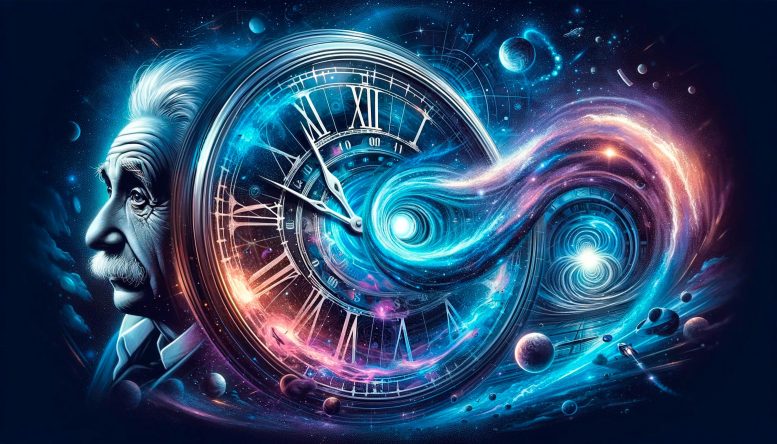
Time travel, a longstanding fascination in science fiction, remains a complex and unresolved concept in science. The second law of thermodynamics suggests time can only move forward, while Einstein’s theory of relativity shows time’s relativity to speed. Theoretical ideas like wormholes offer potential methods, but practical challenges and paradoxes, such as the “grandfather paradox,” complicate the feasibility of actual time travel.
Will it ever be possible for time travel to occur?
Have you ever dreamed of traveling through time, like characters do in science fiction movies? For centuries, the concept of time travel has captivated people’s imaginations. Time travel is the concept of moving between different points in time, just like you move between different places. In movies, you might have seen characters using special machines, magical devices or even hopping into a futuristic car to travel backward or forward in time.
But is this just a fun idea for movies, or could it really happen?
The Science Behind Time Travel
The question of whether time is reversible remains one of the biggest unresolved questions in science. If the universe follows the laws of thermodynamics , it may not be possible. The second law of thermodynamics states that things in the universe can either remain the same or become more disordered over time.
It’s a bit like saying you can’t unscramble eggs once they’ve been cooked. According to this law, the universe can never go back exactly to how it was before. Time can only go forward, like a one-way street.
Time Is Relative
However, physicist Albert Einstein’s theory of special relativity suggests that time passes at different rates for different people. Someone speeding along on a spaceship moving close to the speed of light – 671 million miles per hour! – will experience time slower than a person on Earth.
People have yet to build spaceships that can move at speeds anywhere near as fast as light, but astronauts who visit the International Space Station orbit around the Earth at speeds close to 17,500 mph. Astronaut Scott Kelly has spent 520 days at the International Space Station, and as a result has aged a little more slowly than his twin brother – and fellow astronaut – Mark Kelly. Scott used to be 6 minutes younger than his twin brother. Now, because Scott was traveling so much faster than Mark and for so many days, he is 6 minutes and 5 milliseconds younger .
Theoretical Possibilities and Challenges
Some scientists are exploring other ideas that could theoretically allow time travel. One concept involves wormholes, or hypothetical tunnels in space that could create shortcuts for journeys across the universe. If someone could build a wormhole and then figure out a way to move one end at close to the speed of light – like the hypothetical spaceship mentioned above – the moving end would age more slowly than the stationary end. Someone who entered the moving end and exited the wormhole through the stationary end would come out in their past.
However, wormholes remain theoretical: Scientists have yet to spot one. It also looks like it would be incredibly challenging to send humans through a wormhole space tunnel.
Paradoxes and Failed Dinner Parties
There are also paradoxes associated with time travel. The famous “ grandfather paradox ” is a hypothetical problem that could arise if someone traveled back in time and accidentally prevented their grandparents from meeting. This would create a paradox where you were never born, which raises the question: How could you have traveled back in time in the first place? It’s a mind-boggling puzzle that adds to the mystery of time travel.
Famously, physicist Stephen Hawking tested the possibility of time travel by throwing a dinner party where invitations noting the date, time, and coordinates were not sent out until after it had happened. His hope was that his invitation would be read by someone living in the future, who had capabilities to travel back in time. But no one showed up.
As he pointed out : “The best evidence we have that time travel is not possible, and never will be, is that we have not been invaded by hordes of tourists from the future.”
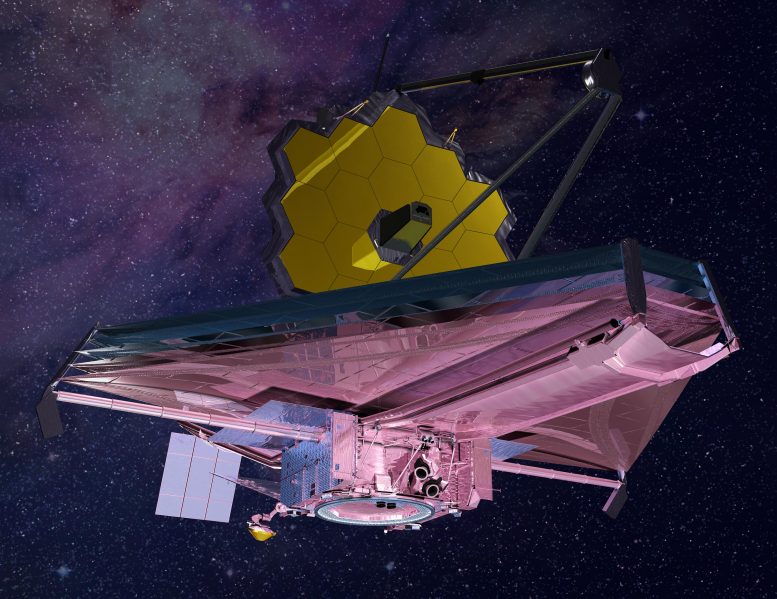
Artist’s rendering of the James Webb Space Telescope. Credit: Northrop Grumman
Telescopes Are Time Machines
Interestingly, astrophysicists armed with powerful telescopes possess a unique form of time travel . As they peer into the vast expanse of the cosmos, they gaze into the past universe. Light from all galaxies and stars takes time to travel, and these beams of light carry information from the distant past. When astrophysicists observe a star or a galaxy through a telescope, they are not seeing it as it is in the present, but as it existed when the light began its journey to Earth millions to billions of years ago.
NASA’s newest space telescope , the James Webb Space Telescope , is peering at galaxies that were formed at the very beginning of the Big Bang , about 13.7 billion years ago.
While we aren’t likely to have time machines like the ones in movies anytime soon, scientists are actively researching and exploring new ideas. But for now, we’ll have to enjoy the idea of time travel in our favorite books, movies, and dreams.
Written by Adi Foord, Assistant Professor of Astronomy and Astrophysics, University of Maryland, Baltimore County.
More on SciTechDaily

A Significant Surge: How Tropical Cyclones Increase the Cost of Carbon

Voyager’s New Horizon: NASA Engineers Tackle Thruster Buildup & Software Glitches

New ScienceCast Video Previews the ‘Opposition of Mars’

“Our Solar System May Be Unusual”: Rogue Planets Unveiled With NASA’s Roman Space Telescope

AI-Powered Lasers: A Modern Solution to Space Debris

IBS Relief: Common Drug Improves Symptoms of Irritable Bowel Syndrome

Scientists Discover Chinmo – “The Youth Gene”

Jupiter’s Moon Europa Could Be Pulling Oxygen Down Below the Ice To Feed Life
8 comments on "exploring the reality of time travel: science fact vs. science fiction".
Until the problem of the second law of thermodynamics(entropy) is solved, the concept of time travel will remain the subject of science fiction. Since this is a basic law of our universe, there is no conceivable way that we know of to do this. The great thing about our knowledge of the universe is that it continues to grow and with that our view of what is possible continues to change. After all, at one time it was believed we could never leave earth!
The 7 planets are soul pollen in the space @ life has been the world has been prepared @ The pollen of the universe is hidden @ Around the axis of the galaxy, the universe is hidden@@ The pollen of the galaxies is a hidden cluster Itis made that we thought about what wisdom is in God’s work and how it is arranged in the form of words.The verse that is made is as follows @@ John, you are in time @ worlds, planets around the axis of the branches of galaxies @@ 8 Prophets, divine prophets, God-aware witnesses @ God’s words of revelation, they are aware @@ 48 What the words of revelation that every prophet has about @ sometimes Sometimes the message of God has become a verbal cliché in the head @@ 62 The message of God was given to every prophet @ The message was made around the power of God @@ 46 The truth of the religions of the cradle of time is said in the world @ Prophets always came for justice in time @@ 62 A warrior became brave in time @ Delaver Ghahrmani Boud Taarani@@ 43 Omar Noah never died, who knows!@ Imransan Is there an unseen world, immortality!?@@ 49 Men’s rights in the sign @ Human rights, the observance of world justice @@ 40 We have God’s love @ A love that is not patched, separation!!!: @@ 39 Take one word from the end of the first and second stanzas to the bottom of these eight verbal verses, and this sentence is made @@ God-aware, the world is born, you know the sign of God @ Agah,the beginning of time, the world, eternity, the world of separation @@ The meaning of this sentence is That God, who before us humans lived on the earth, formed the earth’s crusts with full knowledge, and we humans know the sign of God, which is on the earth, on the continents and countries, and some names have been shown by God for our knowledge since the end of time.In a later video, if I have a lifetime left, I will explain exactly about these poems, God willing @@ The word of the Prophet 17 is the 17th and Muhammad (PBUH) said that the Bedouin Arabs should pray 17 rakats so that theyperform ablution and be clean and not kill and loot.From the caravans, these were all God’s will, and he is good everywhere, in every nation, God does not like evildoers, sinners, and oppressors.Muhammad (PBUH) was God’s last messenger to the Arab people, he was God’s best prophet, and the third verse is because they do not accept Muhammad (PBUH).Some Iranians who were in contact with me, that’s why in the third verse of this surah, he said that his message was given to every prophet, the message is based on divine power, and the word truth, the first two letters of which istruth, is truth, and truth is the 43rd and forty-third word, and the word is time.It is exactly 46, and this song of the Prophets was revealed at the age of 46 ببخشید اگر قبلآ مطالبی فرستادم که به مذاهب مذاهم ارتباط داد شاید به درد شما نمیخورد من در کامنت های بعدی سعی میکنم از نجوم و حیات زمین سخن بگویم این چند بیت را به خارجی انگلیسی که تبدیل کردم معنی آن حیرت انگیز تعغیر کرد گفتم برای شما بفرستم و بداند که این کلام من نبوده کلام خداوند بوده شما نظرتان در مورد خداوند چیست من میگویم خداوند که پدر ومادر انسان بودند قادر به ساختن ما بودند اما آیا آنها قادر به ساختن ستاره ها هم بودند
Your comment has validity to God. But it surely has no place here, it is only fare if the hole comment were in english and has less of a convincing push in a belief a person either believes or not.
It’s too bad physics can’t come to a complete consensus about time, I would like to add some thought about discoveries it has been proven that time travels in only one direction forward, the experiment dealt with light thru glass and how it reacts in the middle and what change happens after light exits the other side, a simple explanation of this experiment. Brings me to theorize and start that time existed before the big bang and is outside of our universes influence, when time is acted on by gravity the ( Form ) of time is changed until the influence no longer has effect, this could go hand in hand with light photons the photon has a influence in the Form that time has. This can not be a observed difference unless we were to see beyond the speed of light. We do agree that physics changes at a subatomic state and also does some strange changing once the speed of light has been exceeded.
The experiment I referred to was posted on IFL in October 2023 headlined ( Solution to complex light problem shows that time can only go Forward ).
One of the problem with travel time is the one people keep forever. And, that is that the earth is always move through space. Matter of fact, the earth is not in the same place that it was 50 years ago. So you will have to move through space as well as time.
Ironically, the only science fiction that seems to handle this is the original story “The Time Machine”.
Time travel is happening now. It has been done since the 1950s. The method satisfies all the requirements. Traveler can’t change the past, but only observe. You can’t go farther back than when the machine was first invented (1950s). There’s one more limitation, you can only observe what the machine was directed. The time machine, the common video camera, and video tape recorder. Now it’s the camera, and file capture computer. Yes, viewing a video tape is effectively going back in time. It’s more than the video, it’s the sound too. There are working versions of smell, and touch which can be recorded too. If you record, and replicate all the senses, you have effectively complete time travel. The most primitive form is the picture. This technology has been around for thousands of years, and is manually intensive. Later many pictures were strung together to make a film. Using a camera to record film was the first example of complete visual time travel (back to when the film was made). Later sound was added, and we have the movies. A way of going back in time that included sight, and sound. Now we have video systems (YouTub) that can play back past events selected by you. Yes, video systems are virtual time travel machines we have now.
How Stellar Cannibalism Illuminates Cosmic Evolution
جزایر فیلیپین دایناسوری که توسط انسان خلق شده در بیش ده ها میلیون سال و بخاطر ریخته شدن دوهزار متر خاک غرق شده بخاطر بالا آمدن آب اقیانوس اما جزایر فیلیپین شبیه دایناسوریست
The address of the above comment on the site about a thief who was trained by a dinosaur bird who was trained by humans tens of millions of years ago and who arrested murderers and robbers.The police were arrested by big birds.don’t the scientists of the world think about this?They were buried in the bed of important cities, they were buried with all the tools and machines, the traces of humans tens of millions of years ago, they had a civilization and a history of hundreds of thousands of years, they built a base underthe earth, from the meteorites that explode from the planets when they hit the sun, and they knew that several thousand meters of soil is poured on the surface of the seas and islands, and they knew that the shapes they made of the islands in thecountry of Papua may go under the ocean, of course, the Philippine islands.The picture is of a baby dinosaur that went under the ocean, but the northern island of Australia, which is Papua, is quite clear.It is a big dinosaur whose tail is towards the east and its mouth is open towards the west.There is the Philippines, but it was more difficult to take the soil to the Philippine islands to create a dinosaur than the island of Papua, that is why the height of the soil in the Philippines is lower, and when the meteorites fell a few kilometerson the surface of the ocean, the image created by humans under the ocean in the shape of a dinosaur is hidden in the American continent The picture is of a bird in the shape of a dinosaur that is flying, and this bird was made to flyby the Indians of the tribe, that bird was talking to people, but its spirit might have heard something from the police because a thief while in the bird’s mouth He was handcuffed by the police and the weapon, which is a machine gun, is fromthe east of the American continent on the coast
The country of Florida is a machine gun.When you continue to New York City, you will reach the mouth of the dinosaur, where a thief is trapped in the mouth of a bird, and the little finger of the police handcuffed the thief’s hand, and a small colt is in the hand ofthe thief, who the police caught in the mouth of the dinosaur.put in the mouth of the bird dinosaur, you can clearly see that the thief fell on the ground and was shot in the head, and it is clear that his forehead was pierced, the bird’s mouth is open in flight, the head of the birdis from the east of the American continent, and a fish is placed in the bird’s mouth in the water of the ocean.The stretched glove of the police, which is in the form of a fist, with a handcuff attached to the left hand of the thief who fell on the ground in the sea and the mouth of the bird, the head of the thief and the killer, is located towards the southwest and west coast of America.All these images were created from the American continent and islands by Humans were created, but they didn’t have enough fuel and time to create more accurate images and meteorites ruined the beauty of the images, but it is clear that all these changes were createdby humans, but you have to consider that two thousand meters of soil from meteorites are fish.And they buried the whales under the beaches, and after a very long time, the bodies of the whales turned into oil under the two thousand meters of soil on the beaches, and on the other hand, the presence of two thousand meters of soil onthe surface of the seas and droughts could not make the created images disappear.
Leave a comment Cancel reply
Email address is optional. If provided, your email will not be published or shared.
Save my name, email, and website in this browser for the next time I comment.
Time travel: Is it possible?
Science says time travel is possible, but probably not in the way you're thinking.

Albert Einstein's theory
- General relativity and GPS
- Wormhole travel
- Alternate theories
Science fiction
Is time travel possible? Short answer: Yes, and you're doing it right now — hurtling into the future at the impressive rate of one second per second.
You're pretty much always moving through time at the same speed, whether you're watching paint dry or wishing you had more hours to visit with a friend from out of town.
But this isn't the kind of time travel that's captivated countless science fiction writers, or spurred a genre so extensive that Wikipedia lists over 400 titles in the category "Movies about Time Travel." In franchises like " Doctor Who ," " Star Trek ," and "Back to the Future" characters climb into some wild vehicle to blast into the past or spin into the future. Once the characters have traveled through time, they grapple with what happens if you change the past or present based on information from the future (which is where time travel stories intersect with the idea of parallel universes or alternate timelines).
Related: The best sci-fi time machines ever
Although many people are fascinated by the idea of changing the past or seeing the future before it's due, no person has ever demonstrated the kind of back-and-forth time travel seen in science fiction or proposed a method of sending a person through significant periods of time that wouldn't destroy them on the way. And, as physicist Stephen Hawking pointed out in his book " Black Holes and Baby Universes" (Bantam, 1994), "The best evidence we have that time travel is not possible, and never will be, is that we have not been invaded by hordes of tourists from the future."
Science does support some amount of time-bending, though. For example, physicist Albert Einstein 's theory of special relativity proposes that time is an illusion that moves relative to an observer. An observer traveling near the speed of light will experience time, with all its aftereffects (boredom, aging, etc.) much more slowly than an observer at rest. That's why astronaut Scott Kelly aged ever so slightly less over the course of a year in orbit than his twin brother who stayed here on Earth.
Related: Controversially, physicist argues that time is real
There are other scientific theories about time travel, including some weird physics that arise around wormholes , black holes and string theory . For the most part, though, time travel remains the domain of an ever-growing array of science fiction books, movies, television shows, comics, video games and more.
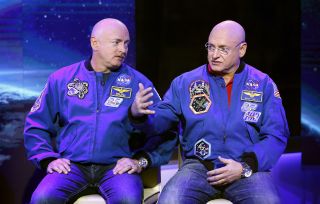
Einstein developed his theory of special relativity in 1905. Along with his later expansion, the theory of general relativity , it has become one of the foundational tenets of modern physics. Special relativity describes the relationship between space and time for objects moving at constant speeds in a straight line.
The short version of the theory is deceptively simple. First, all things are measured in relation to something else — that is to say, there is no "absolute" frame of reference. Second, the speed of light is constant. It stays the same no matter what, and no matter where it's measured from. And third, nothing can go faster than the speed of light.
From those simple tenets unfolds actual, real-life time travel. An observer traveling at high velocity will experience time at a slower rate than an observer who isn't speeding through space.
While we don't accelerate humans to near-light-speed, we do send them swinging around the planet at 17,500 mph (28,160 km/h) aboard the International Space Station . Astronaut Scott Kelly was born after his twin brother, and fellow astronaut, Mark Kelly . Scott Kelly spent 520 days in orbit, while Mark logged 54 days in space. The difference in the speed at which they experienced time over the course of their lifetimes has actually widened the age gap between the two men.
"So, where[as] I used to be just 6 minutes older, now I am 6 minutes and 5 milliseconds older," Mark Kelly said in a panel discussion on July 12, 2020, Space.com previously reported . "Now I've got that over his head."
General relativity and GPS time travel
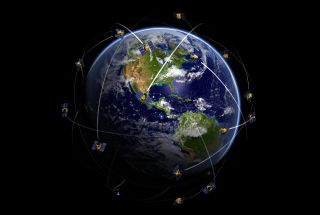
The difference that low earth orbit makes in an astronaut's life span may be negligible — better suited for jokes among siblings than actual life extension or visiting the distant future — but the dilation in time between people on Earth and GPS satellites flying through space does make a difference.
Read more: Can we stop time?
The Global Positioning System , or GPS, helps us know exactly where we are by communicating with a network of a few dozen satellites positioned in a high Earth orbit. The satellites circle the planet from 12,500 miles (20,100 kilometers) away, moving at 8,700 mph (14,000 km/h).
According to special relativity, the faster an object moves relative to another object, the slower that first object experiences time. For GPS satellites with atomic clocks, this effect cuts 7 microseconds, or 7 millionths of a second, off each day, according to the American Physical Society publication Physics Central .
Read more: Could Star Trek's faster-than-light warp drive actually work?
Then, according to general relativity, clocks closer to the center of a large gravitational mass like Earth tick more slowly than those farther away. So, because the GPS satellites are much farther from the center of Earth compared to clocks on the surface, Physics Central added, that adds another 45 microseconds onto the GPS satellite clocks each day. Combined with the negative 7 microseconds from the special relativity calculation, the net result is an added 38 microseconds.
This means that in order to maintain the accuracy needed to pinpoint your car or phone — or, since the system is run by the U.S. Department of Defense, a military drone — engineers must account for an extra 38 microseconds in each satellite's day. The atomic clocks onboard don’t tick over to the next day until they have run 38 microseconds longer than comparable clocks on Earth.
Given those numbers, it would take more than seven years for the atomic clock in a GPS satellite to un-sync itself from an Earth clock by more than a blink of an eye. (We did the math: If you estimate a blink to last at least 100,000 microseconds, as the Harvard Database of Useful Biological Numbers does, it would take thousands of days for those 38 microsecond shifts to add up.)
This kind of time travel may seem as negligible as the Kelly brothers' age gap, but given the hyper-accuracy of modern GPS technology, it actually does matter. If it can communicate with the satellites whizzing overhead, your phone can nail down your location in space and time with incredible accuracy.
Can wormholes take us back in time?
General relativity might also provide scenarios that could allow travelers to go back in time, according to NASA . But the physical reality of those time-travel methods is no piece of cake.
Wormholes are theoretical "tunnels" through the fabric of space-time that could connect different moments or locations in reality to others. Also known as Einstein-Rosen bridges or white holes, as opposed to black holes, speculation about wormholes abounds. But despite taking up a lot of space (or space-time) in science fiction, no wormholes of any kind have been identified in real life.
Related: Best time travel movies
"The whole thing is very hypothetical at this point," Stephen Hsu, a professor of theoretical physics at the University of Oregon, told Space.com sister site Live Science . "No one thinks we're going to find a wormhole anytime soon."
Primordial wormholes are predicted to be just 10^-34 inches (10^-33 centimeters) at the tunnel's "mouth". Previously, they were expected to be too unstable for anything to be able to travel through them. However, a study claims that this is not the case, Live Science reported .
The theory, which suggests that wormholes could work as viable space-time shortcuts, was described by physicist Pascal Koiran. As part of the study, Koiran used the Eddington-Finkelstein metric, as opposed to the Schwarzschild metric which has been used in the majority of previous analyses.
In the past, the path of a particle could not be traced through a hypothetical wormhole. However, using the Eddington-Finkelstein metric, the physicist was able to achieve just that.
Koiran's paper was described in October 2021, in the preprint database arXiv , before being published in the Journal of Modern Physics D.

Alternate time travel theories
While Einstein's theories appear to make time travel difficult, some researchers have proposed other solutions that could allow jumps back and forth in time. These alternate theories share one major flaw: As far as scientists can tell, there's no way a person could survive the kind of gravitational pulling and pushing that each solution requires.
Infinite cylinder theory
Astronomer Frank Tipler proposed a mechanism (sometimes known as a Tipler Cylinder ) where one could take matter that is 10 times the sun's mass, then roll it into a very long, but very dense cylinder. The Anderson Institute , a time travel research organization, described the cylinder as "a black hole that has passed through a spaghetti factory."
After spinning this black hole spaghetti a few billion revolutions per minute, a spaceship nearby — following a very precise spiral around the cylinder — could travel backward in time on a "closed, time-like curve," according to the Anderson Institute.
The major problem is that in order for the Tipler Cylinder to become reality, the cylinder would need to be infinitely long or be made of some unknown kind of matter. At least for the foreseeable future, endless interstellar pasta is beyond our reach.
Time donuts
Theoretical physicist Amos Ori at the Technion-Israel Institute of Technology in Haifa, Israel, proposed a model for a time machine made out of curved space-time — a donut-shaped vacuum surrounded by a sphere of normal matter.
"The machine is space-time itself," Ori told Live Science . "If we were to create an area with a warp like this in space that would enable time lines to close on themselves, it might enable future generations to return to visit our time."
Amos Ori is a theoretical physicist at the Technion-Israel Institute of Technology in Haifa, Israel. His research interests and publications span the fields of general relativity, black holes, gravitational waves and closed time lines.
There are a few caveats to Ori's time machine. First, visitors to the past wouldn't be able to travel to times earlier than the invention and construction of the time donut. Second, and more importantly, the invention and construction of this machine would depend on our ability to manipulate gravitational fields at will — a feat that may be theoretically possible but is certainly beyond our immediate reach.

Time travel has long occupied a significant place in fiction. Since as early as the "Mahabharata," an ancient Sanskrit epic poem compiled around 400 B.C., humans have dreamed of warping time, Lisa Yaszek, a professor of science fiction studies at the Georgia Institute of Technology in Atlanta, told Live Science .
Every work of time-travel fiction creates its own version of space-time, glossing over one or more scientific hurdles and paradoxes to achieve its plot requirements.
Some make a nod to research and physics, like " Interstellar ," a 2014 film directed by Christopher Nolan. In the movie, a character played by Matthew McConaughey spends a few hours on a planet orbiting a supermassive black hole, but because of time dilation, observers on Earth experience those hours as a matter of decades.
Others take a more whimsical approach, like the "Doctor Who" television series. The series features the Doctor, an extraterrestrial "Time Lord" who travels in a spaceship resembling a blue British police box. "People assume," the Doctor explained in the show, "that time is a strict progression from cause to effect, but actually from a non-linear, non-subjective viewpoint, it's more like a big ball of wibbly-wobbly, timey-wimey stuff."
Long-standing franchises like the "Star Trek" movies and television series, as well as comic universes like DC and Marvel Comics, revisit the idea of time travel over and over.
Related: Marvel movies in order: chronological & release order
Here is an incomplete (and deeply subjective) list of some influential or notable works of time travel fiction:
Books about time travel:

- Rip Van Winkle (Cornelius S. Van Winkle, 1819) by Washington Irving
- A Christmas Carol (Chapman & Hall, 1843) by Charles Dickens
- The Time Machine (William Heinemann, 1895) by H. G. Wells
- A Connecticut Yankee in King Arthur's Court (Charles L. Webster and Co., 1889) by Mark Twain
- The Restaurant at the End of the Universe (Pan Books, 1980) by Douglas Adams
- A Tale of Time City (Methuen, 1987) by Diana Wynn Jones
- The Outlander series (Delacorte Press, 1991-present) by Diana Gabaldon
- Harry Potter and the Prisoner of Azkaban (Bloomsbury/Scholastic, 1999) by J. K. Rowling
- Thief of Time (Doubleday, 2001) by Terry Pratchett
- The Time Traveler's Wife (MacAdam/Cage, 2003) by Audrey Niffenegger
- All You Need is Kill (Shueisha, 2004) by Hiroshi Sakurazaka
Movies about time travel:
- Planet of the Apes (1968)
- Superman (1978)
- Time Bandits (1981)
- The Terminator (1984)
- Back to the Future series (1985, 1989, 1990)
- Star Trek IV: The Voyage Home (1986)
- Bill & Ted's Excellent Adventure (1989)
- Groundhog Day (1993)
- Galaxy Quest (1999)
- The Butterfly Effect (2004)
- 13 Going on 30 (2004)
- The Lake House (2006)
- Meet the Robinsons (2007)
- Hot Tub Time Machine (2010)
- Midnight in Paris (2011)
- Looper (2012)
- X-Men: Days of Future Past (2014)
- Edge of Tomorrow (2014)
- Interstellar (2014)
- Doctor Strange (2016)
- A Wrinkle in Time (2018)
- The Last Sharknado: It's About Time (2018)
- Avengers: Endgame (2019)
- Tenet (2020)
- Palm Springs (2020)
- Zach Snyder's Justice League (2021)
- The Tomorrow War (2021)
Television about time travel:

- Doctor Who (1963-present)
- The Twilight Zone (1959-1964) (multiple episodes)
- Star Trek (multiple series, multiple episodes)
- Samurai Jack (2001-2004)
- Lost (2004-2010)
- Phil of the Future (2004-2006)
- Steins;Gate (2011)
- Outlander (2014-2023)
- Loki (2021-present)
Games about time travel:
- Chrono Trigger (1995)
- TimeSplitters (2000-2005)
- Kingdom Hearts (2002-2019)
- Prince of Persia: Sands of Time (2003)
- God of War II (2007)
- Ratchet and Clank Future: A Crack In Time (2009)
- Sly Cooper: Thieves in Time (2013)
- Dishonored 2 (2016)
- Titanfall 2 (2016)
- Outer Wilds (2019)
Additional resources
Explore physicist Peter Millington's thoughts about Stephen Hawking's time travel theories at The Conversation . Check out a kid-friendly explanation of real-world time travel from NASA's Space Place . For an overview of time travel in fiction and the collective consciousness, read " Time Travel: A History " (Pantheon, 2016) by James Gleik.
Join our Space Forums to keep talking space on the latest missions, night sky and more! And if you have a news tip, correction or comment, let us know at: [email protected].
Get the Space.com Newsletter
Breaking space news, the latest updates on rocket launches, skywatching events and more!
Vicky Stein is a science writer based in California. She has a bachelor's degree in ecology and evolutionary biology from Dartmouth College and a graduate certificate in science writing from the University of California, Santa Cruz (2018). Afterwards, she worked as a news assistant for PBS NewsHour, and now works as a freelancer covering anything from asteroids to zebras. Follow her most recent work (and most recent pictures of nudibranchs) on Twitter.
'Stellar tanning salon' brings light of alien suns to Earth
Tour the famous 'Pillars of Creation' with gorgeous new 3D views from Hubble and JWST (video)
Find a piece of SpaceX space junk? Call the hotline
Most Popular
- 2 Lego-inspired 'space bricks' could help scientists design moon habitats. Here's how
- 3 If alien terraforming emits greenhouse gases, our telescopes could detect it
- 4 Satellites watch 'extremely dangerous' Hurricane Beryl batter Carriacou island (video)
- 5 Not-so-static fire: Private Chinese rocket accidentally launches during test
Past, Present, Paradox: Writing About Time Travel
Crafting a believable time travel story requires careful consideration of the logic at play. let's crack the temporal code on traveling through time in fiction.
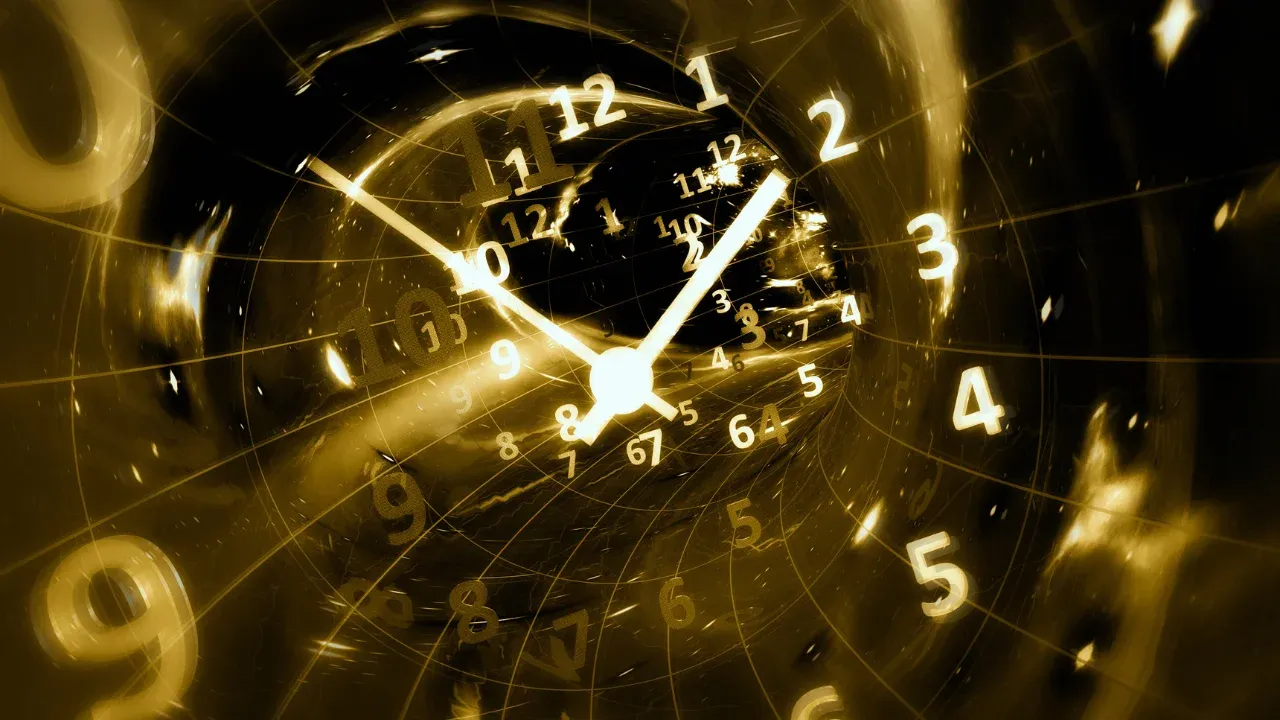
Table of Contents
Time travel in fiction can open your story to infinite possibilities. Ever wondered what it would be like if somebody taught the Romans how to make a nuclear bomb? Do you need to retcon an event in your story? Time travel!
It may seem simple for your time-traveling characters to hop in Tony’s Terrific Temporal Transport and whiz through time, but there are many hurdles to overcome when writing about time travel.
Chief among these is dealing with time travel paradoxes, so let’s look at those, discuss how you can write convincing time travel stories, and explore how some popular stories handle it.
The Problem With Time Travel
Consider an ordinary day in your life. It follows a sequence of events where one thing leads to another. This is called causality , the concept that everything that happens results from events that happened before it. The problem with time travel in fiction, especially travel to the past, is that it often breaks the rules of causality.

This can lead to time travel paradoxes and unforeseen results , including:
- Continuity paradoxes: The act of time travel renders itself impossible.
- Closed causal loop paradoxes: Traveling to the past creates a condition where an idea, object, or person has no identifiable origin and exists in a closed loop in time that repeats infinitely.
- The butterfly effect: Even the smallest action can have massive consequences.
With all that in mind, let’s embark on a journey through time and explore these further!
Grandfather Paradox
This thought experiment posits the idea of somebody traveling back in time and killing their grandfather before their parents were born. Because the grandfather never has children, the time traveler—his grandchild—cannot exist.
However, if the time traveler never existed, they couldn’t kill their grandfather, so he would go on to have children and grandchildren. One of those grandchildren is the time traveler, though, who might go back in time and kill their grandfather. If that seems confusing, it’s okay—it’s supposed to be.
The bottom line is that if somebody travels to the past and changes something that prevents them from ever traveling to the past, they have broken the timeline's continuity.
Polchinski’s Paradox
American theoretical physicist Joseph Polchinski removed human intervention from the time travel equation.
Imagine a billiard ball travels into a wormhole, tunnels through time in a closed loop, and emerges from the same wormhole just in time to knock its past self away.
Doing so prevents it from ever entering the wormhole and traveling through time, to begin with. However, if it does not travel back in time, it cannot emerge to knock itself out of the way, giving it a clear path to travel back in time.
Bootstrap Paradox
The Bootstrap Paradox is the first closed causal loop paradox we will explore. This presents a situation where an object, idea, or person traveling to the past creates the conditions for their existence, leading to it having no identifiable origin in the timeline.
Imagine sending the schematics for your time machine to your past self, from which you create a time machine. Where did the knowledge of how to create the time machine begin?
Predestination Paradox
The most nihilistic of paradoxes explores the idea that nothing we do matters, no matter what. Events are predetermined to still occur regardless of when and where you travel in time.
Suppose you time travel to the past to talk Alexander the Great out of invading Persia, but he hadn’t even considered this until you mentioned it. By traveling to the past to prevent Alexander’s conquest, you caused it.
Butterfly Effec t
Less of a paradox and more an exploration of unintended consequences, the butterfly effect explores the idea that any action can have sweeping repercussions, no matter how small.
In the 1960s, meteorologist Edward Lorenz discovered that adding tiny changes to computer-based meteorological models resulted in unpredictable changes far from the origin point. In traveling back in time, we don’t know what effect even minor changes might have on the timeline.
How to Write Convincing Time Travel Stories
Time travel can be pretty complex at the best of times, but that doesn't mean writing about it has to be a challenge. Here are a few practical tips to craft narratives that crack the temporal code.

Ask Yourself, "Why Time Travel?"
If your story has time travel, to begin with, it likely plays a pretty significant role in the narrative. Define the purpose that time travel has in your story by asking yourself questions like:
- How and why is time travel possible in your setting?
- What does it mean for your story and your characters?
- What are your characters meant to use time travel for?
- Is the actual practice of time travel different from its intent?
If you can't be clear about time travel's purpose in your story, how can you convincingly write about it? To get crafty with time, you first need to master its relevant mechanics.
Keep a Record of Everything
You're asking your reader to potentially make several mental leaps when time travel is involved in a story, so it's imperative to have all of your details sorted. Do the work of planning out dates and events ahead of time by creating a time map for yourself—like a mindmap, but for a timeline.
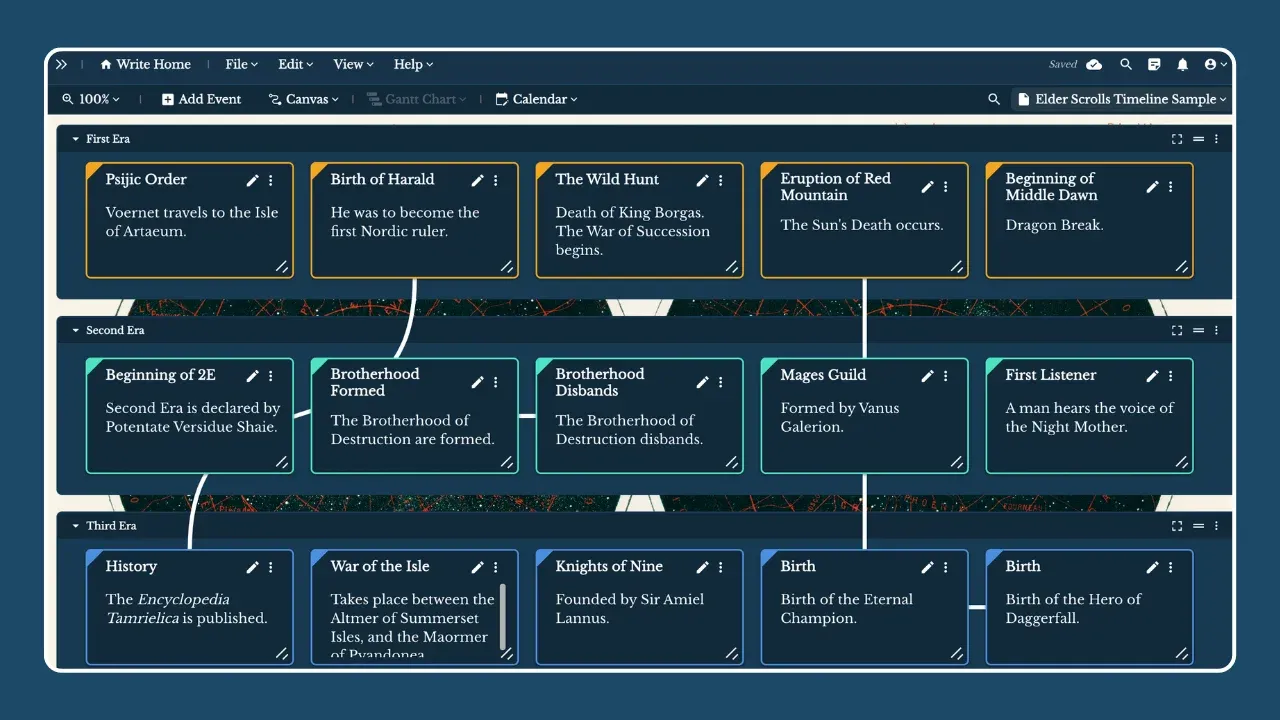
You'll be able to keep a birds-eye view of the narrative at all times, be more strategic about moving the order of events around, and ensure that you never miss a detail. You may even want to have multiple versions—a strictly linear timeline and a more loosely structured time map where you draw connections between events and in the order they appear in the narrative.
In Campfire, you can do both with the Timeline Module —create as many Timelines as you want by using the Page feature in the element. You can also connect your Timeline(s) to a custom calendar from the Calendar Module for extra fun with time wonkiness in your world.
If a new idea pops up while writing, don't stress! You'll have your handy time map already laid out so you can easily see if a new scene or chapter makes sense, as well as where it will best fit into the narrative.
Never Forget Causality
I mentioned this concept earlier in the article, but it should be reiterated: The most important rule of time travel is that every action results in a consequence. Remember cause and effect : an action is taken (your character time travels to the past), and causes an effect, the consequence (the timeline is forever changed).
"Consequence" doesn't have to be a negative thing, either, even though the word has that connotation. The resulting consequence of a given action could be a positive effect, too.
Regardless, seek to maintain causality so you don't confuse your readers (or yourself, for that matter). Establishing clear rules for how time travel works in your setting and sticking to them will help you keep your time logic consistent and avoid running into narrative dead ends or plot holes.
Tips & Tricks For the Time-Traveling Author
Now that we’ve examined several obstacles you can encounter when writing about time travel, let’s see how you can either avoid them or exploit them. That’s right! Even time travel paradoxes present opportunities for superb storytelling.
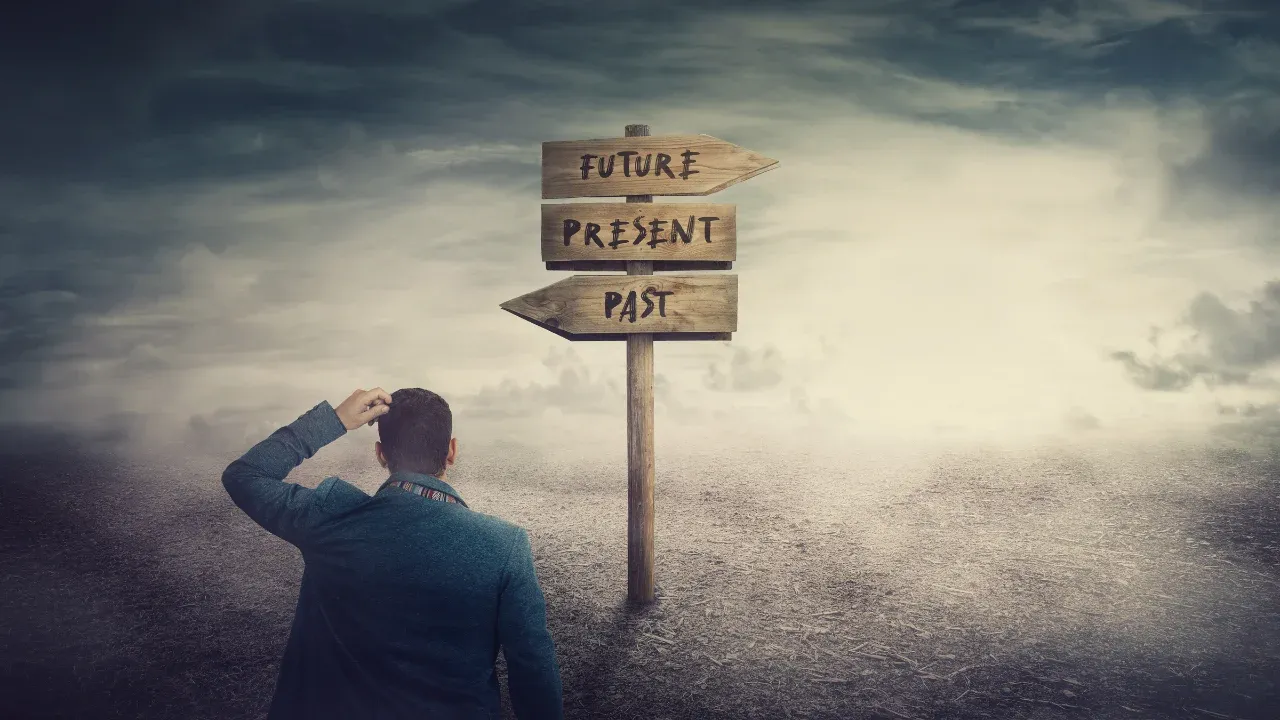
Focus on the Future
Fortunately, all the named paradoxes here involve the past, so the easy way to avoid them is to not go there! Thanks to Einstein’s theory of special relativity, you don’t even have to invent a clever way to travel instead to the future.
An aspect of Einstein's theory is time dilation , in which the faster an object moves through space, the slower it moves through time. With this, you need only zip around at near the speed of light for a few weeks or months, and when you come back to Earth, years or centuries will have gone by.
Create a Multiverse
A popular trope in science fiction today, and a theory gaining popularity among theoretical quantum physicists, is the multiverse concept. According to multiverse theory, whenever an event occurs, every possible outcome of the event happens simultaneously, splitting the universe into parallels that each contain differing outcomes.
Since all these realities exist, perhaps changing the past is simply a way for time travelers to travel between realities, shifting their perspective to a timeline where things occurred differently than in their original reality.
Get Creative With Consequences
Instead of avoiding paradoxes, maybe you want them to occur. Leading to some fascinating stories, this can be approached in a variety of ways. Perhaps you want to examine the unintended consequences of the butterfly effect, create a time-traveling police force that enforces the laws of time travel, or simply break time itself and revel in the chaos that ensues.
Just be sure to remember the action-consequence rule and keep your timeline handy for easy reference—especially if you're toying around with multiple timelines!
Best Time Travel Stories
What follows are what I think are some of the best time travel stories. As you will see, the first two fall victim to time travel paradoxes, while the other two do a great job of exploring various elements we’ve discussed.
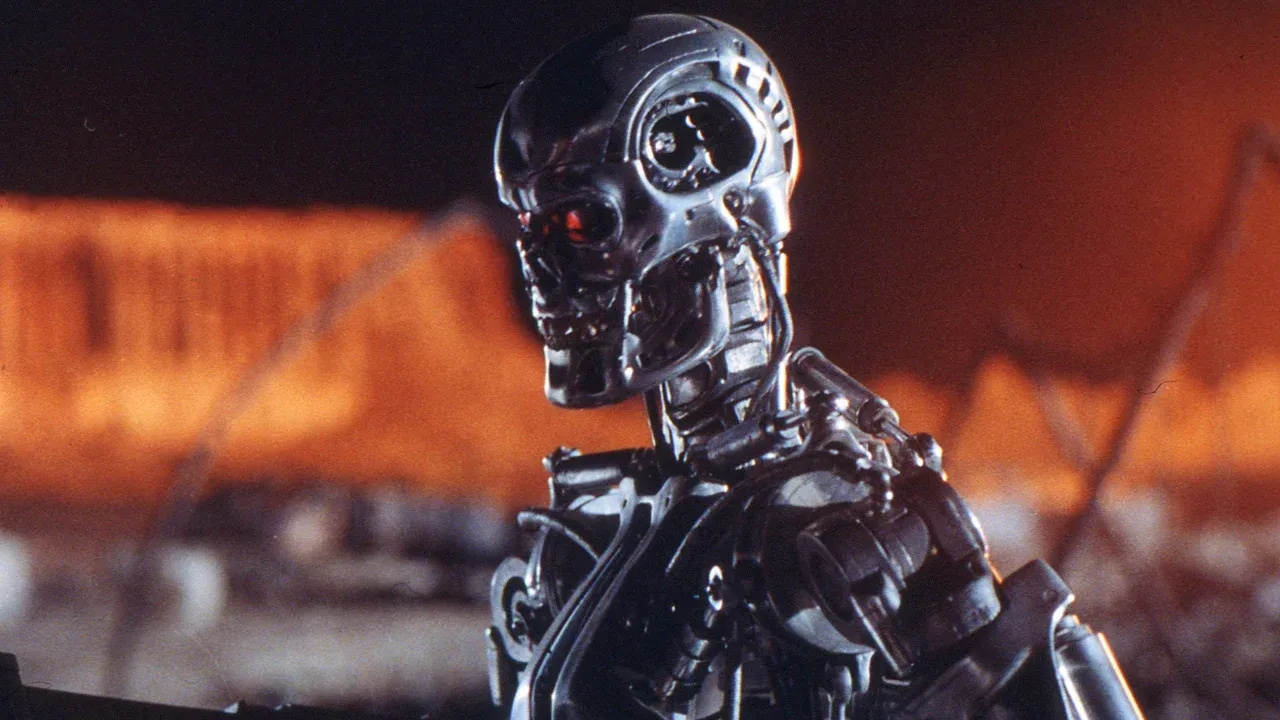
Terminator 2: Judgment Day
The corporation Cyberdyne Systems has remnants of the Terminator from the first movie, which they use to create an artificial intelligence system called Skynet. Skynet then actually creates the terminators and sends one back in time. Thus, it gives humanity the technology to create itself in a classic example of a bootstrap paradox.
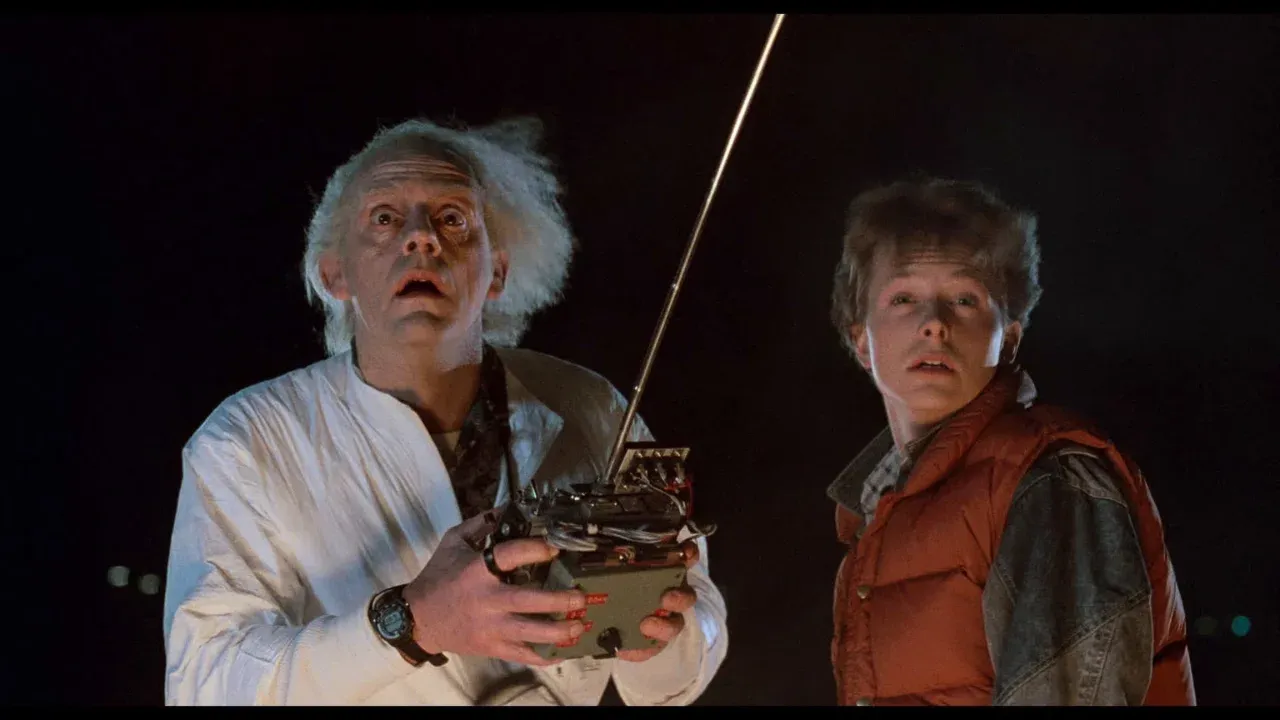
Back to the Future
In this film, Marty McFly travels to the past and inadvertently interrupts the event where his parents first meet. This causes a chain of events where Marty’s parents never get married and have children, threatening to erase Marty and his siblings from the timeline.
Some argue that the McFly offspring ceasing to exist is a great exploration of the consequences of time travel. However, they would never have been at risk had Marty not been in the past to impede their parents’ romance. And if he ceases to exist, he’ll never go back and get in the way, thus creating a grandfather paradox.
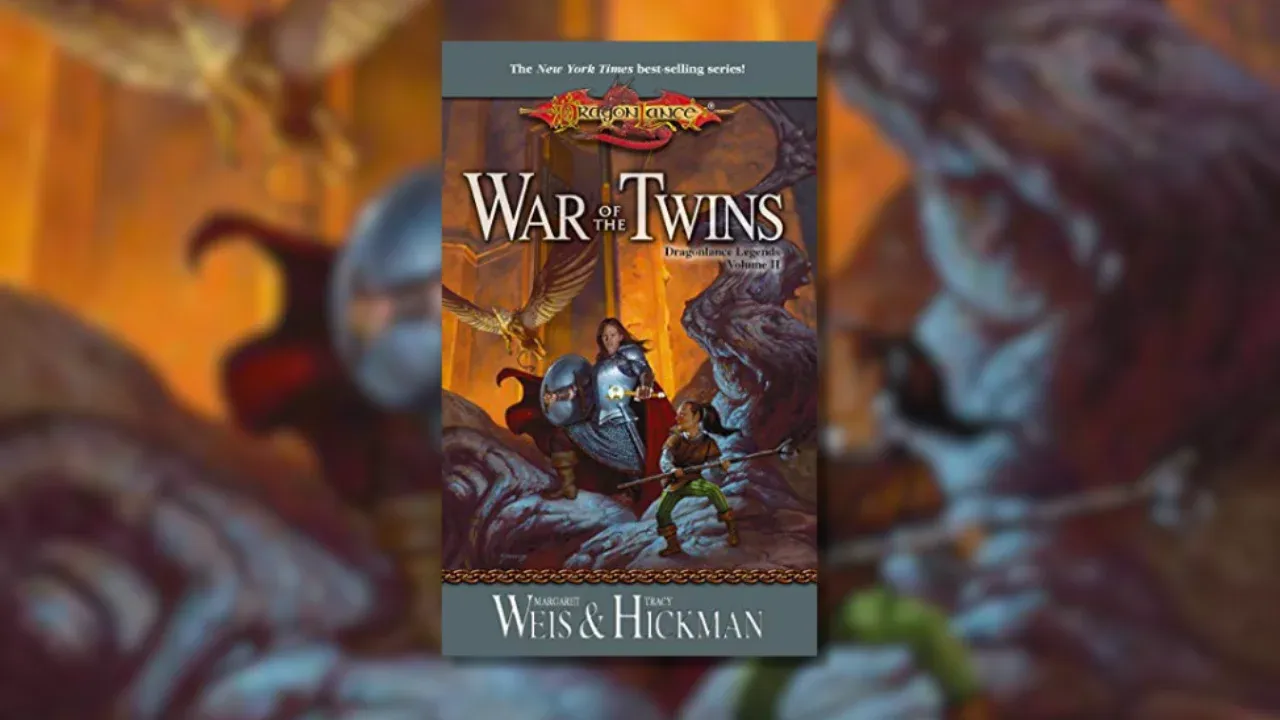
War of the Twins
In this second volume of the Dragonlance Legends trilogy by Margaret Weis and Tracy Hickman, the mage Raistlin Majere travels into the past, kills a wizard named Fistandantilus in a battle for power, and assumes his identity. Throughout the book, Raistlin unwittingly follows the historical fate of Fistandantilus, in a wonderful exploration of the predestination paradox.

It’s hard to talk about time travel in fiction these days without mentioning Loki. The show explores two suggestions from my list above: the multiverse and policing the timeline. In this series, varying outcomes of events lead to branching timelines, creating a multiverse of possibilities. However, an agency called the Time Variance Authority exists to prevent this from happening, and they set out to eliminate any branches separate from what they consider the Sacred Timeline.
Bon Voyage!
I hope this exploration of time travel leaves you prepared to tackle these obstacles and opportunities that naturally present themselves when playing around with time.
Just knowing about the complexities of time travel and the paradoxes it can bring about is the best way to avoid trouble and create innovative storytelling moments. So, dust off your DeLorean, polish your paradox-proof plot, and get ready to write your adventure through the ages!
Learn more about making a timeline with Campfire in the dedicated Timeline Module tutorial . And be sure to check out the other plotting and planning articles and videos here on Learn, for advice on how to plan your very own time travel adventures!


10 Ideas for a Time Travel Story
Here are 10 quick ideas for a time travel story, including everything from colonies in the distant past and future, to time traveling Jews, Jesus, and jealous husbands.
If one of these ideas inspires you to create a time travel story of your own, let us know and we’ll share it with out community!
1. Future War
A future dictator invades the past. He sends giant war machines into 19th Century London, Paris and Washington, and he demands that all world leaders surrender to him. It’s up to a team of time traveling heroes to stop him.
2. As Time Goes By
A scientist discovers that he can slow down time in a localized area. He can use this to visit the future (and stop off anywhere along the way), but he can never go back. At first, he uses the device to prolong his own life, spending a day inside the time-bubble as a month passes outside. Later, curiosity compels him to travel into the distant future in search of new wonders and a fresh start.
Our protagonist finds a future world full of wonders, and he begins to build a new life for himself. But when things start to go wrong, he finds himself traveling forward yet again. Eventually, the urge to travel forward becomes irresistible as he searches for perfection. Is he really searching for something, or just running from his own past?
As our traveler comes to the end of his life he realizes that, while he has seen more than most people, he hasn’t really lived at all. He’s spent his whole life running.
3. Doing Time
Using a time machine, a penal colony is established in Earths distant future – a future in which humanity is extinct and the sun is approaching the end of its natural life-cycle. When the end finally comes, do the guards evacuate the prisoners or leave them to their fate?
4. The Man You Used To Be
After his wife leaves him, a scientist travels back in time to be with her again. He’s determined to get it right the second time around, and thinks he knows what to do to keep her happy. But when he travels into the past he comes across an obstacle he hadn’t counted on – the past version of himself.
SEE ALSO: Travelling in time but NOT space
Desperate to be with his wife again, he plots to do the unthinkable – he plans to murder his past self and take his place.
There are two obvious ways in which this story could end, each equally as ironic. 1) He kills his former self and is happily reunited with his wife, but after spending one perfect day together the time paradox begins to kick in and he vanishes into oblivion. 2) He kills his former self, but his wife recognizes that he is not the man he used to be. Because of what he’s been through and what he’s done, he’s changed, and his wife can see it in his eyes. She leaves him again.
5. Future Tense
Fearing the extinction of humanity is on the horizon, a large group of humans travel into Earths distant future to avoid the catastrophe. They arrive in a time in which the Earth has recovered from the disaster, and in which all traces of human civilization have disappeared. Many animal species have evolved beyond recognition. In this new wilderness, they attempt to build a home.
Knowing that the end of human civilization is near, people are desperate to travel to the future colony. With a limited number of places available, people fight for the last remaining passes. Eventually, the future colony finds itself with too many mouths to feed.
6. Past Participants
With the destruction of Earth imminent, humanity begins colonizing the distant past. The colonization effort slowly begins to interfere with the timeline. Each group of colonists that arrives from the future has experienced a different version of history, with increasingly interesting results.
One group of time travel colonists is from a fascist timeline in which the Nazis won the Second World War, and they try to take over the colony. Another group reports having found the remains of the colony during a future archaeological dig, indicating that the colonization effort will eventually fail.
7. Populating Zion
A team of scientists rescue Jews from Nazi extermination camps by transporting them forward in time just before the moment of their deaths. Nazis are confounded when they open the doors to gas chambers and find that their victims have mysteriously vanished. In the future, thousands of rescued Jews struggle to understand what has happened to them, and they begin to hail the lead scientist as their Messiah.
8. Time Me Up, Time Me Down
After inventing a time machine, a scientist travels into his own future where he meets his beautiful future wife. Back in his own time, he meets his future wife for the first time (for her at least), but she isn’t interested in him. He tries his hardest to impress her but fails. How can this be when they are meant to be together?
Determined to win her heart, he travels back to their first meeting over and over again, trying something different each time. He even visits her past in an attempt to learn more about her, but nothing works. Becoming increasingly obsessed, he eventually resorts to kidnapping her. He takes her forward in time to show her their future life, but his actions have drastically changed the timeline.
9. Final Interview
A time travel agency sends a man to interview famous historic figures just hours before they die. The interviews are not only important to historians, they have also become a form of popular entertainment. After interviewing countless historic figures over a long and distinguished career, our protagonist has become something of a celebrity himself. One day, a younger man arrives at his home insisting that he be allowed to interview the protagonist. The protagonist realizes that the younger man is his future replacement, and that he himself is soon to die.
(Thanks to Jorgen Lundman for this idea, the full version of which can be read here )
10. Jesus vs The Time Police
The technology needed for time travel exists, but it has been outlawed by most of the world’s governments. A special police unit or federal agency uses specialist equipment to track down illegal time travelers and prevent them from damaging the timeline.
Some of the time travelers are attempting to alter their own past for personal gain, others are rich tourists seeking a thrilling but illegal encounter with the past. One day, however, they track down a time traveler who has managed to evade them for several years. He has been living in the past for all this time, and he claims to have become an important historical figure. Doing a little research, they determine his claims to be true. The time traveler has had a profound effect on the timeline, and undoing his actions might have profoundly negative consequences. He has written himself into history – a history that the time-police have always accepted to be true.
The illegal time traveler might be a famous general, monarch, or president. He might even be a religious figure, such as Jesus (as such, he may not have had an entirely positive effect on history, but a profound one nonetheless). If the illegal time-traveler is Jesus, might his ascension to heaven actually be his forced return to his own time, staged by the time-police?The time-police are faced with a dilemma – set the timeline straight and undo his actions without knowing what the result might be, or allow him to continue living in the past.
This article was written by Mark Ball . With thanks to Jorgen Lundman.
Use our Random Story Idea Generator for inspiration for more stories.

40 Best Time Travel Books To Read Right Now (2024)
This post may contain affiliate links that earn us a commission at no extra cost to you.
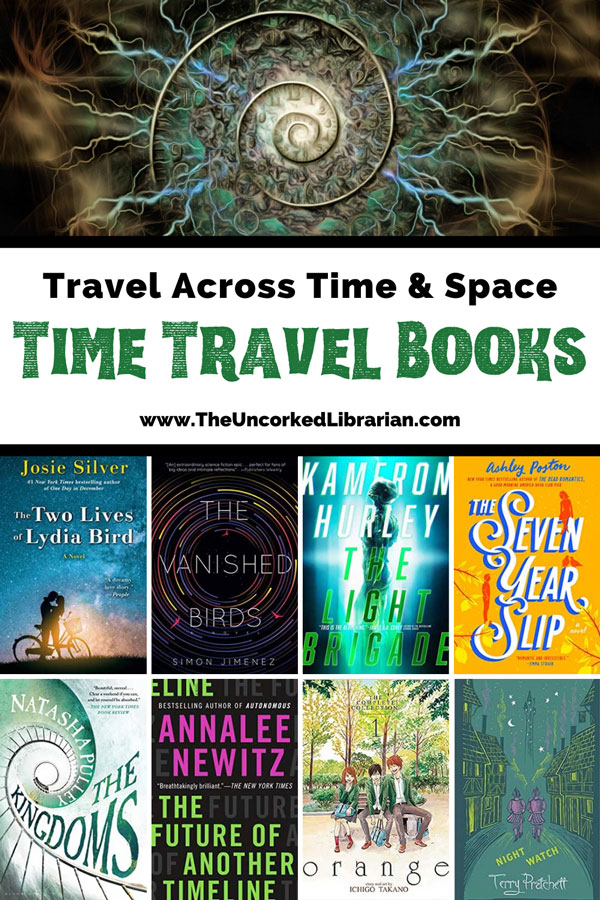
Travel back in time with the best time travel books, including engrossing thrillers, romance, contemporary lit, and mind-bending sci-fi.

What We Recommend
Best Time Travel Books
Books about time travel promise to not only transport you across time periods and space – Doctor Who-style – but also tesser you into new dimensions and around the world. Most readers already know about classics like The Time Traveler’s Wife , A Christmas Carol , and The Time Machine .
For romance time travel, grab In A Holidaze or One Last Stop . For contemporary and new time travel books, Haig’s The Midnight Library and Serle’s In Five Years captivated our hearts and minds.
Recursion re-kindled our love for science fiction, and Ruby Red transported us to 18th-century London. Books like Displacement promise intuitive and raw commentary about generational trauma and racism in graphic novel form.
Below, find the best time travel novels across genres for adults and teens, including history, romance, classics, sci-fi, YA, and thrilling fiction. Get ready to travel in the blink of an eye, and be sure to let us know your favorites in the comments. Let’s get started!
Contemporary & Literary Fiction
If you enjoy contemporary and literary fiction filled with strong main characters, these are some of the best books in the time travel genre. Uncover new releases as well as books on the bestseller lists. Of course, we’ll share a few lesser-known gems too.
In Five Years by Rebecca Serle
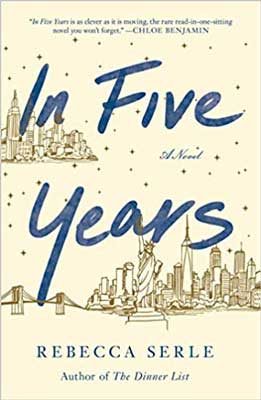
Would your life change if you had one seemingly real dream or premonition? What if some key facts were missing but you had no idea? Can we change the future?
One of the best books about time travel and friendship, don’t skip In Five Years . In fact, we read this New York City-based novel in half a day. Have the tissue box ready.
Dannie nails an important job interview and is hoping to get engaged. Of course, this is all a part of her perfect 5-year plan. Dannie has arranged every minute of her life ever since her brother died in a drunk driving accident.
On the night of Dannie’s “scheduled” engagement, she falls asleep only to have a vision of herself 5 years into the future in the arms of another man. Did she just time travel or could this be a dream? When Dannie arrives back in 2020, her life goes back to normal. …That is until she meets the man from her dream.
We were expecting In Five Years to be a time travel romance story; however, this is a different type of love and one of the best books about strong friendships .
Read In Five Years : Amazon | Goodreads
Before the coffee gets cold by Toshikazu Kawaguchi

Translated by Geoffrey Trousselot | We just love Japanese literature . One of the most debated time travel books among our readers – you’ll either love it or hate it – Before the coffee gets cold takes place at a cafe in Tokyo, Japan.
Along with coffee, this 140-year-old, back-alley cafe lets visitors travel back in time. Four visitors at the cafe are hoping to time travel to see someone for the last (or first) time. The way each patron views the cafe says a lot about them. The details and repetition are everything.
True to the title, visits may only last as long as it takes for the coffee to grow cold. If they don’t finish their coffee in time, there are ghostly consequences.
Before the coffee gets cold asks, who would you want to see one last time, and what issues you would confront?
Along with the many rules of time travel, these visitors are warned that the present will not change. Would you still travel back knowing this? Can something, anything, still change – even within you?
The story has a drop of humor with a beautiful message. We shed a tear or two. Discover even more terrific and thought-provoking Japanese fantasy novels here .
Read Before the coffee gets cold : Amazon | Goodreads
If you are looking for the most inspiring take on time travel in books, Haig’s The Midnight Library is it. This is one of those profound stories that make you think more deeply . TWs for pet death (early on) and suicide ideation.
The Midnight Library by Matt Haig
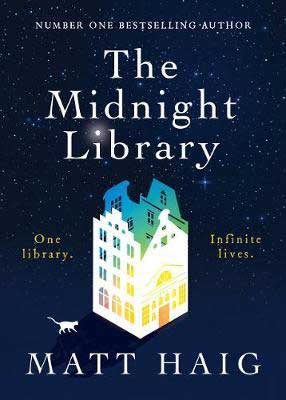
Imagine if you could see your other possible lives and fix your regrets. Would that path be better? Would these changes make you happier?
Set in Bedford, England, and at a library , Nora answers these questions as she intentionally overdoses on pills. Caught in the Midnight Library – a purgatory of sorts – Nora explores books filled with the ways her life could have turned out. She tries on these alternative lives, pursuing different dreams, marrying different people, and realizing that some parts of her root life were not as they seemed on the surface.
Find hope and simplicity in one of the most authentic and heaviest time travel novels on this list. Haig addresses mental health through a new lens that is both beautiful and moving.
With a team full of avid readers and librarians, discover our top selections featuring more books about books .
Read The Midnight Library : Amazon | Goodreads
The Two Lives of Lydia Bird by Josie Silver
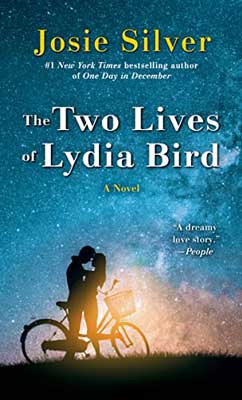
Some of the best time travel books are those with alternate realities, including The Two Lives of Lydia Bird . There are content warnings for prescription pill addiction and more.
Set in England, Lydia and Freddie are planning their marriage when the unthinkable happens. Freddie dies in a car accident on the way to Lydia’s birthday dinner. In a matter of seconds, Lydia’s world falls apart. She isn’t sure how she will survive. When Lydia starts taking magical pink sleeping pills, she enters an alternate universe where Freddie is alive and well.
Caught between her dream world and real life, Lydia must decide if she will give in to her addiction – living in a temporary fantasy world – or give it up completely.
While the repetitive and predictable plot drags a bit – slightly hurting the pacing – the overall story shows emotional growth and the nature of healing after loss. And, as Lydia soon learns via her dreams, no love is perfect. Maybe her future was destined to be different anyway, which is reminiscent of Matt Haig’s The Midnight Library .
Read The Two Lives of Lydia Bird Jose Silver : Amazon | Goodreads
The First Fifteen Lives Of Harry August by Claire North
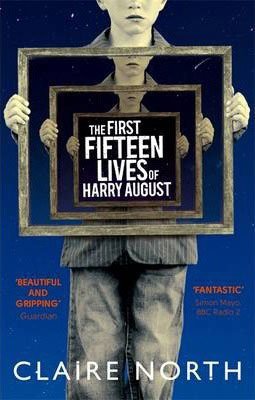
If you are looking for more suspenseful books about time travel and like Groundhog Day , check out The First Fifteen Lives of Harry August. However, this is not just one day on repeat; instead, this is a lifetime.
Harry August is repeatedly reborn into the same life, retaining his memories each time. No matter what Harry does or says, when he lands on his deathbed, he always returns back to his childhood, again and again. On the verge of his eleventh death, though, a girl changes the course of his life. He must use his accumulated wisdom to prevent catastrophe.
Read The First Fifteen Lives Of Harry August : Amazon | Goodreads
An Ocean of Minutes by Thea Lim
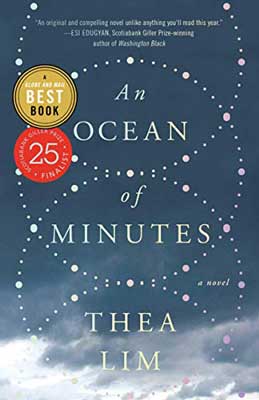
When it comes to time travel books, An Ocean of Minutes is one of the most original takes about time travel’s effects on alternate history.
Polly and Frank are deeply in love in 1981 when a pandemic devastates the planet. By the end of 1981, time travel (invented in this alternate reality in 1993) has been made available.
Because of this invention, individuals can sign on to work for the TimeRaiser corporation in order to escape or save their loved ones in the present. Due to a flaw in the technology, though, they can only transport people for 12 years. This prevents them from stopping the pandemic by just 6 months.
When Frank gets ill, Polly signs up, both agreeing they will meet back up in 1993. Now alone in the future, Polly has to learn to navigate a world she has less than zero preparation for. In this world, she is a time refugee, bonded to TimeRaiser without a physical cent to her name.
Lim uses the time travel mechanic to cleverly explore the subject of immigration, forcing the reader to follow Polly blindly into a world they should know, but don’t. This is what makes An Ocean of Minutes one of the most unique time travel novels on this reading list.
Read An Ocean of Minutes : Amazon | Goodreads
Time Travel In Science Fiction
For fantasy and sci-fi lovers, take a quantum leap into fictional worlds, quantum physics, possible futures, black holes, and endless possibilities. See if you can tell the difference between the real world and new dimensions.
Recursion by Blake Crouch
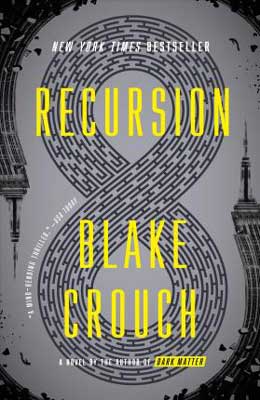
Recursion is one of our all-time favorite time travel books to gift to dads who love sci-fi. Can you tell what we gave our dad for Christmas one year?
In Recursion, no one actually physically time travels – well, sort of. Instead, memories become the time-traveling reality.
Detective Barry Sutton is investigating False Memory Syndrome. Neuroscientist Helena Smith might have the answers he needs. The disease drives people crazy – and to their deaths – by causing them to remember entire lives that aren’t theirs. Or are they!?
All goes to heck when the government gets its hands on this mind-blowing technology. Can Barry and Helena stop this endless loop?
Recursion is also a (2019) Goodreads Best Book for Science Fiction.
Read Recursion : Amazon | Goodreads
This Is How You Lose The War by Max Gladstone and Amal El-Mohtar
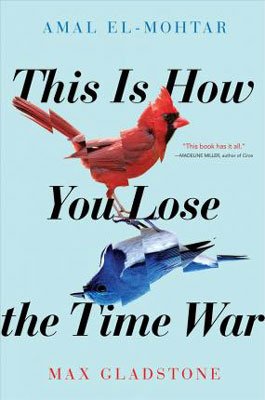
A Goodreads runner-up for one of the best science fiction novels (of 2019) – and one of the shortest time travel novels on this list – This Is How You Lose The Time War follows two warring time-traveling agents falling in love through a letter exchange.
Red and Blue have nothing in common except that they travel across time and space and are alone. Their growing and forbidden love is punishable by death and their agencies might be onto them.
In a somewhat beautiful yet bizarre story, we watch as Red and Blue slowly fall for each other and confess their love. They engage in playful banter and nicknames. Every shade of red and blue reminds them of each other.
The first half of the novel is a bit abstract. You might wonder what the heck you’ve gotten yourself into. However, once you get your feet planted firmly on the ground of the plot, the story picks up and starts making more sense.
We can’t promise you’ll love or even understand This Is How You Lose The Time War – we aren’t sure we do. However, this is truly one of the most unique sci-fi and LGBTQ+ time travel romance books on this reading list – written by two authors. Also, maybe crack out the dictionary…
Explore even more of the best LGBTQ+ fantasy books to read next.
Read This Is How You Lose The War : Amazon | Goodreads
All Our Wrong Todays by Elan Mastai
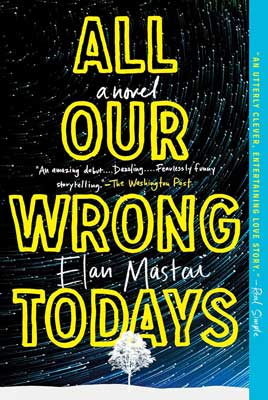
A debut novel, All Our Wrong Todays is both a humorous and entertaining time travel book that speaks to how we become who we are.
In 2016, technology perfected the world for Tom Barren. However, we all know that perfection doesn’t equate to happiness. Barren has lost his girlfriend, and he just happens to own a time machine… Now, Barren has to decide if he wants to keep his new, manipulated future or if he just wants to go back home to his depressing but normal life.
Read All Our Wrong Todays : Amazon | Goodreads
Here And Now And Then by Mike Chen
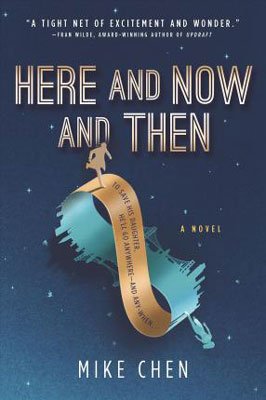
Imagine getting trapped in time and starting over. That’s exactly what happens to IT worker, Kin Stewart, in one of the bestselling science fiction time travel books, Here And Now And Then .
Stewart has two lives since he is a displaced time-traveling agent stuck in San Francisco in the 1990s. He has a family that knows nothing about his past; or, should we say future. When a rescue team arrives to take him back, Stewart has to decide what he is willing to risk for his new family.
Here And Now And Then is a time travel book filled with emotional depth surrounding themes of bonds, identity, and sacrifice. Find even more books set in San Francisco, California (and more!).
Read Here And Now And Then : Amazon | Goodreads
How to Live Safely in a Science Fictional Universe by Charles Yu
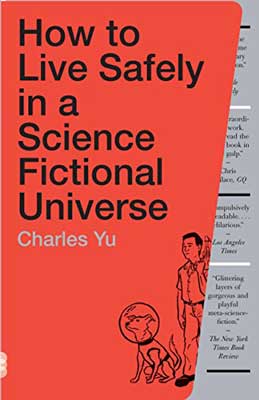
How to Live Safely in a Science Fictional Universe is one of the most unusual books about time travel out there.
Our protagonist Charles Yu lives in a world where time travel exists and is readily available to the average person. And yes, he is named after the author, and yes, it is as meta as it sounds; and yes, this is just the beginning of this speculative fiction time travel book.
Charles Yu’s day job is spent repairing time machines for Time Warner Time. But in his free time, he tries to help the people who use time travel to do so safely and to counsel them if things have gone wrong.
It’s no surprise that Charles’ entire life revolves around time travel since his father invented the technology many years ago. And then he disappeared. In fact, Charles is also trying to find out just what happened to his dad, and where – or when – he’s gone.
How to Live Safely in a Science Fictional Universe won’t be for everyone, but it’s one of the best time travel books if you want delightfully meta, fantastically non-linear, and very very weird.
Read How to Live Safely in a Science Fictional Universe : Amazon | Goodreads
The Vanished Birds by Simon Jimenez
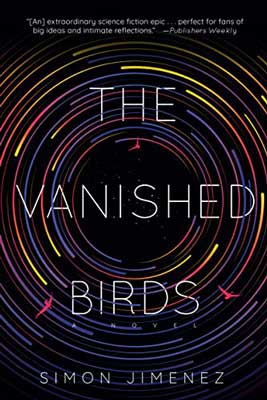
For beautiful, lyrical time travel novels about found family and love, The Vanished Birds is a must-read.
Nia Imani exists outside of time and space. She travels in and out of the world through a pocket of time with her space crew. They emerge to trade or sell goods every eight months. But eight months for them is 15 years for everyone else.
She has lived this way for hundreds of years. Though she has her crew, and there are people she shares connections with sporadically throughout their lives, she is lonely. And although she barely ages, she watches friends and lovers grow old and die.
One such person is Kaeda, who meets Nia for the first time when he is 7. The next time he sees her, he has aged 15 years, while she is only months older. She continues to come every 15 years of his life, always looking the same.
Then one day a mysterious, mute boy falls from the sky into Nia’s life. His name is Ahro, and there’s something extra special about him. Something that could revolutionize space travel forever. And now there might be people after Ahro who won’t love him the way Nia does.
If you love a character-driven book with exquisite prose – and a few time warps – this is one of the best time travel books for you.
Read The Vanished Birds : Amazon | Goodreads
Night Watch by Terry Pratchett
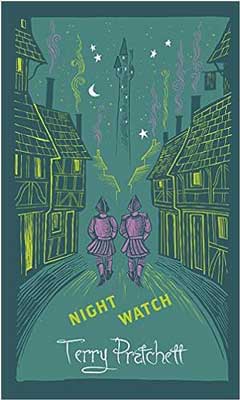
Night Watch is one of the most fun and thrilling books about time travel. It’s also a bit ridiculous and very very British.
Why can’t policing just be simple? All Sam Vimes wanted to do was capture and arrest a dangerous murderer. But thanks to those damned wizards and their experiments, he and the killer have both been accidentally thrown back in time thirty years.
And to top it off, the man who would have become a mentor to young Sam Vimes in the past has been killed in the process! How’s Vimes going to get this all sorted out?
The City Watch he’s spent years improving is just a bunch of semi-competent volunteers at this point. He’s got no money, no clothes, and no friends. But at least he’s making enemies fast. Can he catch the killer, stop history from not repeating itself, and get home to his family? Oh, and the city’s about to dissolve into civil war. Typical.
Night Watch is perfect if you prefer your time travel books to be fantasy-based.
P.S. There may be mild spoilers for previous books in the Discworld series, but this can be read as a standalone. And if you only ever read one Discworld novel, this is one of the best there is – and so far the only one of the Discworld books with time travel!
Read Night Watch : Amazon | Goodreads
The Future of Another Timeline by Annalee Newitz
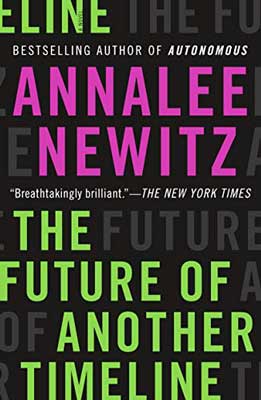
The Future of Another Timeline is one of the few time travel books to explore history through a feminist lens.
In 1992, Beth – a high school senior – and her friends Heather, Lizzy, and Soojin attend a riot grrl concert with Heather’s boyfriend Scott. But afterward, one of Scott’s not-so-funny sexist jokes gets out of hand and Lizzy accidentally kills him. Now they’re on the run, and the bodies just keep piling up.
Meanwhile, in 2022, Tess is part of a group of women and non-binary people working together to change history. They have the use of five time devices which only allow them to travel backward and back to the present day – but never forwards.
Beth and Tess come from two wildly different times (1992, and 2022, respectively). But, while Beth is busy making history, Tess is quite literally trying to change it. However, both of them want the same thing: a better world. When their worlds collide, will they be able to save each other – and the world?
The Future of Another Timeline is a time travel fiction celebration of feminism and queerness with lots of sci-fi and punk rock thrown in. This is one of the best time travel novels for those who enjoy stellar women making history .
Read The Future of Another Timeline : Amazon | Goodreads
The Kingdoms by Natasha Pulley
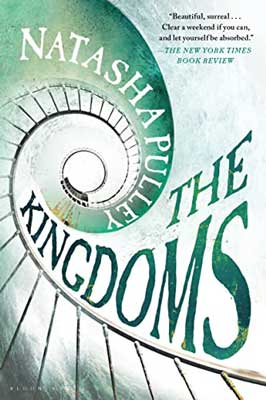
The Kingdoms is wildly imaginative and sure to enchant fans of time travel books, alternative history stories, and tales about parallel universes.
In 1898 Joe Tournier steps off a train and suddenly can’t remember anything that comes before that moment. The world he now finds himself in is as foreign to him as it is to us: an alternate history/reality where the UK lost the Battle of Trafalgar and is now a French colony.
In this world, the British are kept as slaves. Napoleon is a popular name for pets, and tartan is outlawed. Since Joe arrives on a train from Glasgow speaking English and wearing tartan, there is some speculation he might be from The Saints, a terrorist group based in Edinburgh fighting for freedom.
But all Joe remembers is the fading image of a woman and the name Madeline. Although he is identified by his owner and brought “home,” Joe is determined to find this Madeline. And his resolve is only strengthened when he receives a postcard signed ‘– M’ and dated 90 years in the past.
Discover even more books about Scottish culture, history, and everyday life.
Read The Kingdoms : Amazon | Goodreads
The Light Brigade by Kameron Hurley
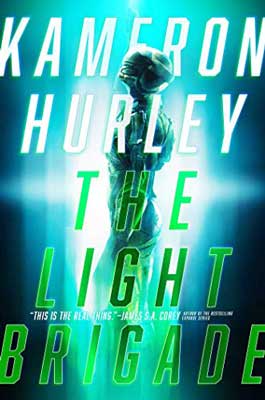
The Light Brigade is one of the best time travel stories for anyone who loves character-driven tales or books about war and conflict.
As war wages on Mars, the military has devised the perfect soldier to fight on the frontlines: being made of light. The Light Brigade, as they’re called back home, is made up of soldiers who have undergone a procedure that breaks them down into atoms capable of traveling at the speed of light. They are the perfect soldiers, but broken people.
The book follows one such soldier, Dietz, an eager new recruit who is experiencing battle out of sync with everyone else. Because of this, she – and we – see a different reality of the war than the one presented by the Corporate Corps. As Dietz becomes more and more unstuck in time, she becomes more and more unsure of her own sanity and the role she is playing in this war.
Read The Light Brigade : Amazon | Goodreads
The Umbrella Academy by Gerard Way
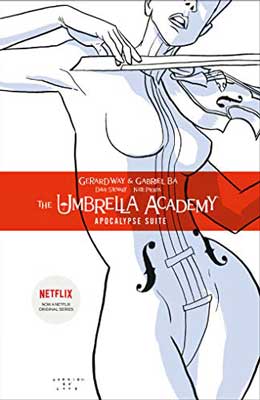
You Look Like Death Volume 1 | Now a popular (and excellent) Netflix TV show, The Umbrella Academy is one of the best time travel books of all time.
One day, forty-seven children are suddenly and inexplicably born to women who were not previously pregnant. Eccentric millionaire Reginald Hargreeves goes around the world buying as many of the surviving children as he possibly can. He is able to get seven.
These children, it turns out, all have superpowers (except, it seems, for the unremarkable Number Seven aka Vanya). They become the crime-fighting group: The Umbrella Academy.
Fast forward several years, and Number Five, whose special power is that he can travel in time a few seconds or minutes per go, has mysteriously appeared after Hargreeves dies. And now he brings warning of an apocalypse – one which he insists none of his siblings will survive.
The Umbrella Academy series currently has three volumes, all packed with tales of time travel, parallel worlds, family drama, and lots of epic battles. We’ve absolutely loved this time travel book series so far; we can’t wait to see what Gerard Way does with future installments.
Discover even more great books with music, musicians, and bands.
Read The Umbrella Academy : Amazon | Goodreads
Historical Fiction
Travel back in time to witness wars and history. See what happens if you try to rewrite the future. Many of these historical fiction books with time travel promise to teach you more.
The 7 1/2 Deaths of Evelyn Hardcastle by Stuart Turton
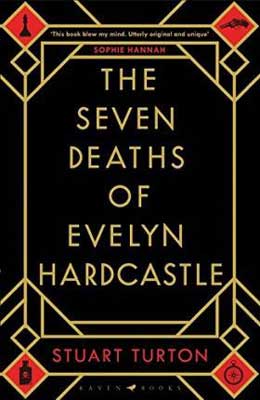
We have a plethora of Agatha Christie fans amongst our Uncorked Readers , and Turton’s The 7 1/2 Deaths of Evenlyn Hardcastle is inspired by Christie.
Similar to Levithan’s Every Day , each day, Aiden wakes up in a different body from the guests of the Blackheath Manor. Trapped in a time loop, Aiden must solve Evelyn Hardcastle’s murder to escape. In the process, he navigates the tangled web of secrets, lies, and interconnected lives of the guests. Can he identify the killer and break the cycle?
The 7 1/2 Deaths of Evelyn Hardcastle is an award-winning historical thriller and one of the best time travel novels if you enjoy Downton Abbey and Groundhog’s Day . Discover even more great books set at hotels, mansions, and more.
Read The 7 1/2 Deaths of Evelyn Hardcastle : Amazon | Goodreads
Outlander by Diana Gabaldon

Travel back in time to Scotland in one of the most well-known time travel book series (and now TV series) of all time. Outlander is a part of pop culture. A New York Times bestseller and one of the top 10 most loved books according to The Great America Read, get ready to enter Scotland in 1743.
Claire Randall, a former British combat nurse, walks through an ancient circle of stones and is transported into a world of love, death, and war. This is a place of political intrigue, clan conflicts, and romantic entanglements. Claire must navigate the unfamiliar landscape while grappling with her feelings for the dashing Jamie Fraser.
Encounter even more cult-classic books from the ’90s like A Game Of Thrones , which is perfect for fantasy map lovers .
Read Outlander : Amazon | Goodreads
11/22/63: A Novel by Stephen King
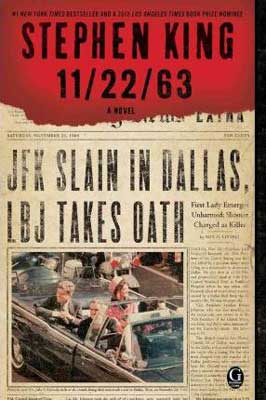
Written by bestselling author, Stephen King, 11/22/63 is one of the best award-winning time travel books for historical fiction lovers. Set in 1963 when President Kennedy is shot, 11/22/63 begs the question: what if you could go back in time and change history?
Enter Jake Epping in Lisbon Falls, Maine. Epping asks his students to write about a time that altered the course of their lives. Inspired by one of those haunting essays, Epping enlists to prevent Kennedy’s assassination. How is this time travel possible? With the discovery of a time portal in a local diner’s storeroom…
11/22/63 is one of the most thrilling and realistic books about time travel, according to both critics and readers.
Read 11/22/63 : Amazon | Goodreads
Kindred by Octavia E. Butler
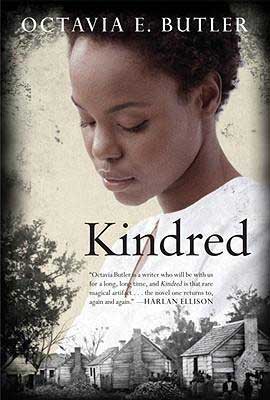
If you are looking for historical fiction novels about time travel that address slavery and racism, be sure to check out Butler’s Kindred. This is also one of the best books published in the 1970s .
One minute Dana is celebrating her birthday in modern-day California. The next, she finds herself in the Antebellum South on a Pre-Civil War Maryland plantation. Dana is expected to save the plantation owner’s son from drowning. Each time Dana finds herself back in this time period as well as the slave quarters, her stays grow longer and longer as well as more dangerous.
Examine the haunting legacy and trauma of slavery across time. For younger readers, there is also a graphic novel adaptation . Discover more books that will transport you to the South .
Read Kindred : Amazon | Goodreads
What The Wind Knows by Amy Harmon
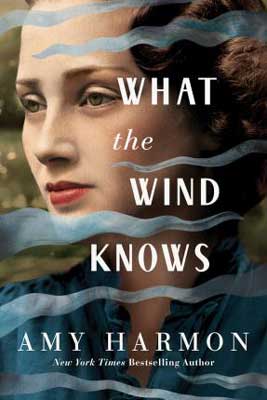
A bestseller and Goodreads top choice book, if you devour historical Irish fiction, What The Wind Knows will transport you to Ireland in the 1920s.
Anne Gallagher heads to Ireland to spread her grandfather’s ashes. Devastated, her grief pulls her into another time. Ireland is on the verge of entering a war, and Anne embraces a case of mistaken identity. She finds herself pulled into Ireland’s fight for Independence at the risk of losing her future life. She also falls for another main character and doctor, Thomas Smith.
What The Wind Knows is one of the best time travel novels that both romance and fantasy readers can appreciate. Witness connections that transcend time.
Read What The Wind Knows : Amazon | Goodreads
The Shining Girls by Lauren Beukes
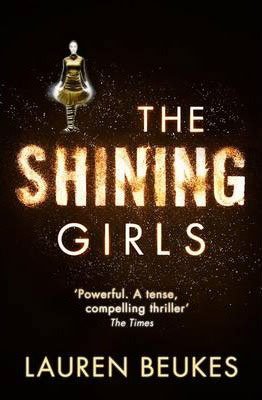
Known for being one of the best time travel books for thriller lovers, The Shining Girls also has the reputation as the spookiest novel on this reading list.
Kirby Mazrachi is the last shining girl – a girl with a future and so much potential. Harper Curtis is a murderer from the past meant to kill Mazrachi. However, Kirby is not about to easily go out without a fight, leading her on one violent quantum leap through multiple decades.
As Kirby races against time to track down a serial killer and unravel the mysteries of the House, encounter themes of resilience, fate, and the shining spirit that can transcend even the darkest forces.
Read The Shining Girls : Amazon | Goodreads
Time Travel Romance Books
We love a good time-travel romance novel, but we also understand how hard it can be to hold onto love when time is so unstable. From queer love stories set on trains to holiday celebrations, fall in love across time with these books.

One Last Stop by Casey McQuiston
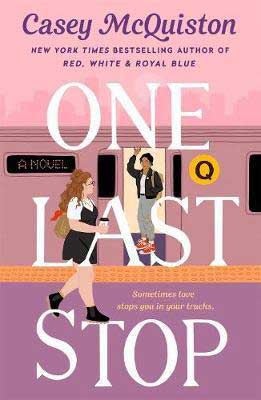
From bestselling author, Casey McQuiston of Red, White, & Royal Blue – one of our favorite LGBTQ+ books for new adults – don’t miss the most-talked-about book (from 2021), One Last Stop.
Twenty-three-year-old August is quite the cynic and living in New York City. Up until now, August has jumped schools and towns as often as you change a pair of socks. August has also never been in a serious relationship and wants to find “her person.” August’s life suddenly changes, though, when she meets a beautiful and mysterious woman on the train.
Jane looks a little…out of date… and for good reason; she’s from the 1970s and trapped in the train’s energy. August wants nothing more than to help Jane leave the train, but does that mean leaving her too?
A feel-good, older coming-of-age story, laugh out loud and be utterly dazzled as you follow love across time and space. You’ll cozy (and drink) up in the parties and community surrounding August. One Last Stop is one of the all-time best LGBTQ+ time travel books – and perfect if you enjoy books that take place on trains .
Read One Last Stop : Amazon | Goodreads
The Time Traveler’s Wife by Audrey Niffenegger
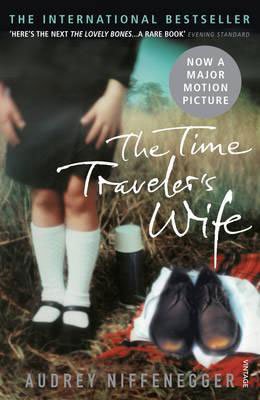
The Time Traveler’s Wife is one the top time travel romance novels – and not just because the story features a librarian . We are so biased.
Henry and Clare have loved each other pretty much forever. Unfortunately, Henry has Chrono-Displacement Disorder, sporadically misplacing him in time. Of course, this time-traveling dilemma makes Clare’s and Henry’s marriage and future together pretty darn interesting.
Grab some Kleenex as they attempt to live normal lives and survive impending devastation. The Time Traveler’s Wife has also been made into a romantic movie classic . Watch even more fantasy movies with romance .
Read The Time Traveler’s Wife : Amazon | Goodreads
In A Holidaze by Christina Lauren
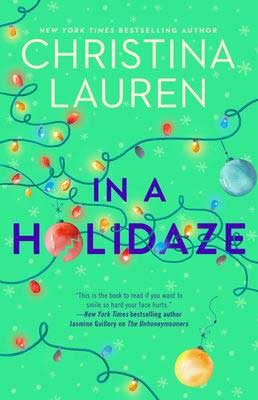
If you are looking for a sweet and sexy holiday rom-com set in Utah, grab In A Holidaze by Christina Lauren.
Mae leaves her family and friend’s Christmas vacation home after drunkenly making out with an old childhood friend. Blame the spiked eggnog. Unfortunately, Mae’s secretly in love with her best friend’s brother, Andrew. On the ride to the airport, Mae wishes for happiness just as a truck hits her parent’s car.
Mae lands in a time-travel loop where her dreams start coming true. Is it too good to last? What happens when she isn’t happy once again? Is she trapped?
For holiday books about time travel, this one is sure to put you in the Christmas spirit if you enjoy movies like Holidates or Groundhog’s Day . It’s light with a happy ending – typical of this author duo. We also recommend In A Holidaze if you are looking for Christmas family gathering books – a big request we see here at TUL.
P.S. Did you know that Christina Lauren is a pen name for a writing duo, Christina Hobbs and Lauren Billings? Christina Lauren also wrote The Unhoneymooners , which was also hilariously enjoyable and set on an island .
Read In A Holidaze : Amazon | Goodreads
A Knight In Shining Armor by Jude Deveraux

For cozy time travel romance books and a feminist tale set abroad, try A Knight In Shining Armor .
Dougless Montgomery is weeping on top of a tombstone when Nicholas Stafford, Earl of Thornwyck, appears. Although this armor-clad hunk allegedly died in 1564, he stands before her about to embark on a journey to clear his name. Convicted of treason, Montgomery vows to help her soon-to-be lover find his accuser and set the record straight.
Read A Knight In Shining Armor : Amazon | Goodreads
The Night Mark by Tiffany Reisz
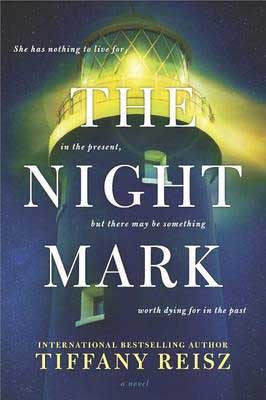
Set in South Carolina, if you love lighthouses and beach vibes, you’ll find something enjoyable in the time travel romance, The Night Mark .
After Faye’s husband dies, she cannot move on and recover. Accepting a photographer job in SC, Faye becomes obsessed with the local lighthouse’s myth, The Lady of the Light.
Back in 1921, the lighthouse keeper’s daughter mysteriously drowned. Faye is drawn into a love story that isn’t hers and becomes entangled in a passionate and forbidden love affair.
Read The Night Mark : Amazon | Goodreads
The Seven Year Slip by Ashley Poston
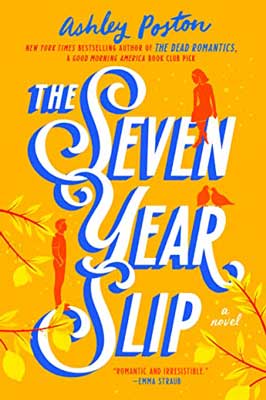
Anyone who likes their time travel books to have a magical love story should pick up The Seven Year Slip for their next read. It’s one of our favorite magical realism novels .
When Clementine’s aunt dies, she inherits her fancy New York apartment on the Upper East Side. Although Clementine would really rather have her aunt back and can’t imagine living in her home, she eventually forces herself to move in and inhabit her aunt’s space.
And not long after, she wakes up to discover a strange man in her living room… except it’s not her living room, it’s her aunt’s… from seven years ago. Clementine’s aunt always said her apartment held a touch of magic; sometimes it created time slips that brought two people together when they were at a crossroads.
But what happens when you start to fall for someone stuck seven years in the past? Clementine knows there’s no future together, but she also can’t let go of this link to her aunt.
Like her previous speculative fiction romance, The Dead Romantics , Ashely Poston’s unique time travel tale is full of heartache and grief. However, it will also make you swoon. Basically, this one is a must if you are a fan of time travel romance books.
Read The Seven Year Slip : Amazon | Goodreads
Classic Books
No time travel reading list would be complete without the classics. Below, uncover just a few great time travel novels that started it all.
The End of Eternity by Issac Asimov
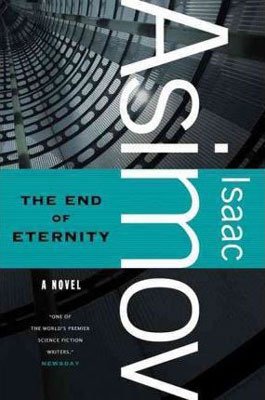
The End of Eternity is said to be one of Asimov’s science fiction masterpieces. This is also one of the most spellbinding books about time travel – although some criticize the story for its loopholes.
Harlan is a member of the elite future known as an Eternal. He lives and works in Eternity, which like any good time travel novel, is located separately from time and space.
Harlan makes small changes in the timeline in order to better history. Of course, altering the course of the world is dangerous and comes with repercussions, especially when Harlan falls in love.
Read The End of Eternity : Amazon | Goodreads
A Christmas Carol by Charles Dickens
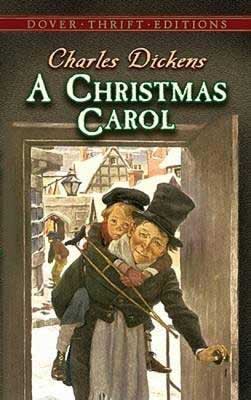
It goes without saying that Charles Dickens’s A Christmas Carol is one of the most famous and best time travel books for classic lovers – and a literary canon-worthy Christmas novel.
Ebenezer Scrooge is a greedy, lonely, and cruel man who truly has no Christmas spirit. Haunted by the ghosts of the past, present, and future, Scrooge must find the ultimate redemption before it’s too late. Does he have a heart?
Find even more classic and contemporary ghost books , including a few unique takes on ghosts.
Read A Christmas Carol : Amazon | Goodreads
Slaughterhouse-Five by Kurt Vonnegut
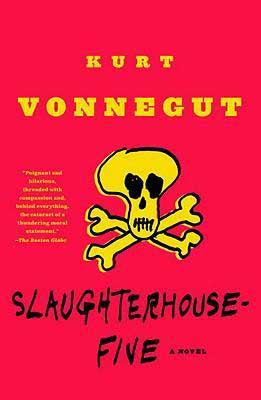
Slaughterhouse-Five is a somewhat bizarre time travel book about finding meaning in our sometimes fractured and broken lives. It’s also one of the most popular books published in the ’60s .
Similar to The Time Traveler’s Wife, Billy Pilgrim is “unstuck” in time in Kurt Vonnegut’s Slaughterhouse-Five. Drafted into World War II, Pilgrim serves as a Chaplain’s assistant until he is captured by the Germans. He survives the bombing at Dresden and ultimately becomes a married optometrist. Things get a little wild…
Suffering from PTSD, Billy claims that he is kidnapped by aliens in a different dimension. Like most time travel novels, the story is out of order and Billy travels to different parts of his life.
Aliens come in all shapes and sizes; have more alien encounters with this reading list .
Read Slaughterhouse-Five : Amazon | Goodreads
A Connecticut Yankee In King Arthur’s Court by Mark Twain
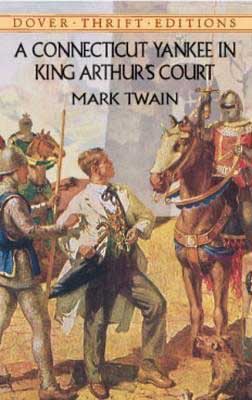
First published in 1889, A Connecticut Yankee in King Arthur’s Court is one of the most popular classic and satirical time travel novels that’s set close to our childhood home. Having grown up in CT close to the old Colt factory, this story makes us smile.
Hank Morgan supervises the gun factory and is knocked unconscious. Upon waking, he finds himself in Britain about to be executed by the Knights of King Arthur’s Round Table in Camelot.
Morgan uses his future knowledge to his advantage, making him a powerful and revered wizard, which unfortunately doesn’t quite save him as he hopes. Not to mention that Morgan tries to introduce modern-day conveniences and luxuries to a time period that isn’t quite ready for them.
Read A Connecticut Yankee In King Arthur’s Court : Amazon | Goodreads
The Time Machine by H.G. Wells
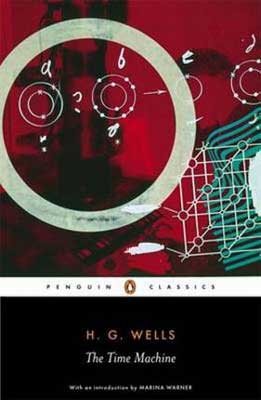
The Time Machine is one of the best frontrunner time travel books of all time. Published in 1895, the Time Traveler recalls his exhausting time travel adventures to incredulous believers. He even disappears in front of them.
Blended with fantasy and science fiction over the course of 800,000 years, the Time Traveler battles “bad guys.” He also loses his time machine, debatably falls in love, and meets the underground dwelling Morlocks.
Read The Time Machine : Amazon | Goodreads
Young Adults Books
For young adults and teens – plus adults who appreciate YA – read the best middle-grade and high school time travel books. We’ve included more time travel graphic novels and manga here too.
Displacement by Kiku Hughes
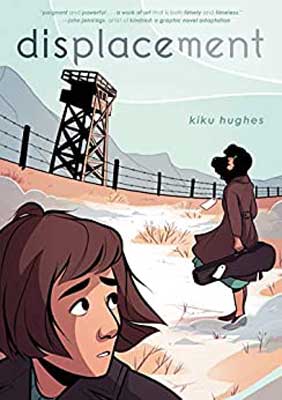
For historical YA graphic novels , Displacement is one of the must-read books about time travel that will teach young readers about generational trauma, racism, politics, and war.
Follow Kiku, who is displaced in time, back to the period of U.S. Japanese incarceration [internment] camps – essentially glorified prisons – during WW2. Kiku begins learning more about her deceased grandmother’s history, which mirrors the horrid actions under former President Donald Trump. How can Kiku help stop the past from repeating itself, and more so, how can we?
In a simplistic but powerful style of storytelling, Hughes’s emotional YA WW2 book is accessible to young readers. Displacement is also one of the shorter and quicker books with time travel on this list. Find even more LGBT+ graphic novels to read – one of our favorite genres.
Read Displacement : Amazon | Goodreads
The Girl From Everywhere by Heidi Heilig
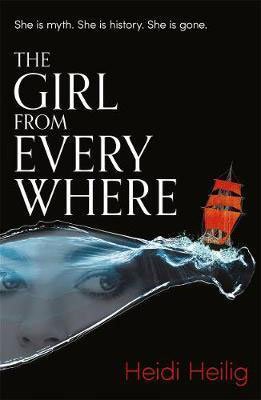
Changing the past can be pretty tempting. We’ve even seen that The Flash cannot resist. However, altering the course of history can be dangerous…
The first of two YA time travel books, Nix is the daughter of a time traveler. Her dad can sail anywhere on his ship, The Temptation. Her dad has his own temptation, though: to travel back to Honolulu in 1868, the year before her mom dies in childbirth. Nix’s father threatens to possibly erase her life and destroy a relationship with her only friend.
Discover even more great books about maps. Or, travel via armchair with these ship books.
Read The Girl From Everywhere : Amazon | Goodreads
Ruby Red by Kerstin Gier
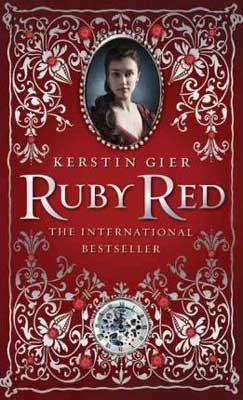
Translated by Anthea Bell | If you are looking for time travel in books and enjoy YA historical fiction, try Ruby Red , which is the first in the Ruby Red Trilogy.
Gwyneth Shepherd quickly learns that she can easily time travel, unlike her cousin who has been preparing her entire life for the feat. Gwyneth wants to know why such a secret was kept from her. There are so many lies. Gwyneth time travels with the handsome Gideon back and forth between modern-day and 18th-century London to uncover secrets from the past.
Back in our MLIS and library days, Ruby Red was one of our favorite YA time travel books to recommend since so few knew about the series. Just a small warning that this enemies-to-lovers trope is a tad sexist, though. Find books like Ruby Red on our books with red (and more colors) in the title reading list .
Read Ruby Red : Amazon | Goodreads
Miss Peregrine’s Home For Peculiar Children by Ransom Riggs
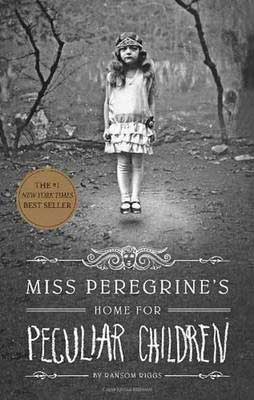
A little creepier for young adult time travel novels, Miss Peregrine’s Home for Peculiar Children is all about time loops. We’ve only read the first in this eerie series that mixes manipulated vintage photography with a suspenseful and chilling story.
Jacob discovers a decaying orphanage on a mysterious island off the coast of Wales. Known as Miss Peregrine’s Home for Peculiar Children, the building isn’t exactly abandoned… Jacob runs into peculiar children who might be more than just ghosts.
If you are looking for Kurt Vonnegut-esque time travel books for teenagers, Miss Peregrine’s Home for Peculiar Children is for you. Find even more great adult and YA haunted house books to add to your reading list .
Read Miss Peregrine’s Home For Peculiar Children : Amazon | Goodreads
A Wrinkle In Time by Madeleine L’Engle
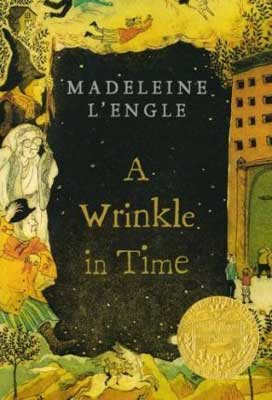
One of the most well-known books about time travel for families – made even more popular by Oprah and Mindy Kaling, A Wrinkle In Time , is the first book in The Time Quintet .
Although a time travel book series for elementary and middle-grade students – and also a 1963 Newbery Medal winner – adults will love the lessons and whimsical sci-fi quality of A Wrinkle In Time.
Meg Murray and her brother, Charles Wallace, go on an adventure in time to find and rescue their father. Their dad disappeared while working for the government on a mysterious tesseract project.
Watch this thrilling time travel adventure mixed with a coming-of-age story and a little girl power, too.
Read A Wrinkle in Time : Amazon | Goodreads
Orange by Ichigo Takano

Translated by Lasse Christian Christiansen and Amber Tamosaitis | This YA sci-fi romance manga is one of the most endearing time travel books you’ll ever read.
On the first day of 11th grade, Naho oversleeps for the first time ever. She also receives a letter that claims to be sent from herself 10 years in the future. The letter tells her both of the two big things that will happen to her that day as proof of sender: she will be late, and there will be a new kid in class named Naruse Kakeru from Tokyo who will sit next to her.
Naho is unsure if she trusts the letter, or whether or not she should heed its warnings – especially since it talks about past regrets and trying to undo them.
Orange is an adorable, but heartbreaking time travel manga that teaches us the meaning of friendship, love, regret, and so much more. If you’re looking for the best books about time travel for teens, Orange is the perfect option (and adults will love it too).
Read Orange : Amazon | Goodreads
If you devour the time travel genre, don’t miss these great movies…
If you enjoy books that take you back in time, you might also appreciate these top movies with time loops . Would you be able to fix past mistakes, fall in love, and you know, maybe not die this time? Find out if these protagonists succeed.
Travel Back In Time With These Reading Lists:
- Best ’90s Books
- Iconic ’80s Books
- Best WWII Historical Fiction

Christine Frascarelli
Christine (she/her) is the owner, lead editor, and tipsy book sommelier of The Uncorked Librarian LLC, an online literary publication showcasing books and movies to inspire travel and home to the famed Uncorked Reading Challenge. With a BA in English & History from Smith College, an MLIS from USF-Tampa, and a U.S. Fulbright Fellowship in Christine's back pocket, there isn't a bookstore, library, or winery that can hide from her. Christine loves brewery yoga, adopting all of the kitties, and a glass of oaked Chardonnay. Charcuterie is her favorite food group.

Dagney McKinney
Dagney (pronouns: any) is a neurodivergent writer and book nerd who is drawn to all things weird and macabre. She also loves anything to do with fast cars, unhinged anti-heroes, and salt. When she isn’t working or reading, you’re likely to find her eating Indian food, playing board games, or hiding out somewhere dark and quiet, stuck down an internet rabbit hole. The easiest way to win her over is through cats and camels.
45 Comments
Hi, nice list but just FYI you have one of the novels named incorrectly: it should be All Our Wrong Todays, not All Our Wrongs Today.
Thanks for letting us know! Every year, this list grows, and sometimes we miss a few mistakes.
The Things Are Bad Series by Paul L Giles is the funniest, most insightful time travel books I’ve ever read. It has everything!
Thanks so much for the review and rec!
Dream Daughter by Diane Chamberlain is an engrossing time travel book that I enjoyed immensely.
Our readers and contributors are big Diane Chamberlain fans. Thanks!
A huge time travel fan. A great list. Another time travel book recommendation: Oona Out of Order by Margarita Montemore. Wonderful story.
Thank you so much for the kind words and recommendation! We’ll have to check it out.
Great list, thanks. I also love seeing all the recommendations in the comments. I would add the Chronos Files series to your list. And, of course, the film ABOUT TIME, which is fantastic!
Thanks so much for the recommendations. We appreciate it!
Leave a Reply Cancel reply
Your email address will not be published. Required fields are marked *
A beginner's guide to time travel
Learn exactly how Einstein's theory of relativity works, and discover how there's nothing in science that says time travel is impossible.
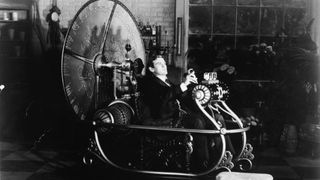
Everyone can travel in time . You do it whether you want to or not, at a steady rate of one second per second. You may think there's no similarity to traveling in one of the three spatial dimensions at, say, one foot per second. But according to Einstein 's theory of relativity , we live in a four-dimensional continuum — space-time — in which space and time are interchangeable.
Einstein found that the faster you move through space, the slower you move through time — you age more slowly, in other words. One of the key ideas in relativity is that nothing can travel faster than the speed of light — about 186,000 miles per second (300,000 kilometers per second), or one light-year per year). But you can get very close to it. If a spaceship were to fly at 99% of the speed of light, you'd see it travel a light-year of distance in just over a year of time.
That's obvious enough, but now comes the weird part. For astronauts onboard that spaceship, the journey would take a mere seven weeks. It's a consequence of relativity called time dilation , and in effect, it means the astronauts have jumped about 10 months into the future.
Traveling at high speed isn't the only way to produce time dilation. Einstein showed that gravitational fields produce a similar effect — even the relatively weak field here on the surface of Earth . We don't notice it, because we spend all our lives here, but more than 12,400 miles (20,000 kilometers) higher up gravity is measurably weaker— and time passes more quickly, by about 45 microseconds per day. That's more significant than you might think, because it's the altitude at which GPS satellites orbit Earth, and their clocks need to be precisely synchronized with ground-based ones for the system to work properly.
The satellites have to compensate for time dilation effects due both to their higher altitude and their faster speed. So whenever you use the GPS feature on your smartphone or your car's satnav, there's a tiny element of time travel involved. You and the satellites are traveling into the future at very slightly different rates.
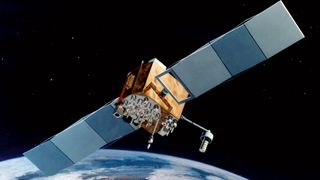
But for more dramatic effects, we need to look at much stronger gravitational fields, such as those around black holes , which can distort space-time so much that it folds back on itself. The result is a so-called wormhole, a concept that's familiar from sci-fi movies, but actually originates in Einstein's theory of relativity. In effect, a wormhole is a shortcut from one point in space-time to another. You enter one black hole, and emerge from another one somewhere else. Unfortunately, it's not as practical a means of transport as Hollywood makes it look. That's because the black hole's gravity would tear you to pieces as you approached it, but it really is possible in theory. And because we're talking about space-time, not just space, the wormhole's exit could be at an earlier time than its entrance; that means you would end up in the past rather than the future.
Trajectories in space-time that loop back into the past are given the technical name "closed timelike curves." If you search through serious academic journals, you'll find plenty of references to them — far more than you'll find to "time travel." But in effect, that's exactly what closed timelike curves are all about — time travel

This article is brought to you by How It Works .
How It Works is the action-packed magazine that's bursting with exciting information about the latest advances in science and technology, featuring everything you need to know about how the world around you — and the universe — works.
There's another way to produce a closed timelike curve that doesn't involve anything quite so exotic as a black hole or wormhole: You just need a simple rotating cylinder made of super-dense material. This so-called Tipler cylinder is the closest that real-world physics can get to an actual, genuine time machine. But it will likely never be built in the real world, so like a wormhole, it's more of an academic curiosity than a viable engineering design.
Yet as far-fetched as these things are in practical terms, there's no fundamental scientific reason — that we currently know of — that says they are impossible. That's a thought-provoking situation, because as the physicist Michio Kaku is fond of saying, "Everything not forbidden is compulsory" (borrowed from T.H. White's novel, "The Once And Future King"). He doesn't mean time travel has to happen everywhere all the time, but Kaku is suggesting that the universe is so vast it ought to happen somewhere at least occasionally. Maybe some super-advanced civilization in another galaxy knows how to build a working time machine, or perhaps closed timelike curves can even occur naturally under certain rare conditions.

This raises problems of a different kind — not in science or engineering, but in basic logic. If time travel is allowed by the laws of physics, then it's possible to envision a whole range of paradoxical scenarios . Some of these appear so illogical that it's difficult to imagine that they could ever occur. But if they can't, what's stopping them?
Thoughts like these prompted Stephen Hawking , who was always skeptical about the idea of time travel into the past, to come up with his "chronology protection conjecture" — the notion that some as-yet-unknown law of physics prevents closed timelike curves from happening. But that conjecture is only an educated guess, and until it is supported by hard evidence, we can come to only one conclusion: Time travel is possible.
A party for time travelers
Hawking was skeptical about the feasibility of time travel into the past, not because he had disproved it, but because he was bothered by the logical paradoxes it created. In his chronology protection conjecture, he surmised that physicists would eventually discover a flaw in the theory of closed timelike curves that made them impossible.
In 2009, he came up with an amusing way to test this conjecture. Hawking held a champagne party (shown in his Discovery Channel program), but he only advertised it after it had happened. His reasoning was that, if time machines eventually become practical, someone in the future might read about the party and travel back to attend it. But no one did — Hawking sat through the whole evening on his own. This doesn't prove time travel is impossible, but it does suggest that it never becomes a commonplace occurrence here on Earth.
The arrow of time
One of the distinctive things about time is that it has a direction — from past to future. A cup of hot coffee left at room temperature always cools down; it never heats up. Your cellphone loses battery charge when you use it; it never gains charge. These are examples of entropy , essentially a measure of the amount of "useless" as opposed to "useful" energy. The entropy of a closed system always increases, and it's the key factor determining the arrow of time.
It turns out that entropy is the only thing that makes a distinction between past and future. In other branches of physics, like relativity or quantum theory, time doesn't have a preferred direction. No one knows where time's arrow comes from. It may be that it only applies to large, complex systems, in which case subatomic particles may not experience the arrow of time.
Time travel paradox
If it's possible to travel back into the past — even theoretically — it raises a number of brain-twisting paradoxes — such as the grandfather paradox — that even scientists and philosophers find extremely perplexing.
Killing Hitler
A time traveler might decide to go back and kill him in his infancy. If they succeeded, future history books wouldn't even mention Hitler — so what motivation would the time traveler have for going back in time and killing him?
Killing your grandfather
Instead of killing a young Hitler, you might, by accident, kill one of your own ancestors when they were very young. But then you would never be born, so you couldn't travel back in time to kill them, so you would be born after all, and so on …
A closed loop
Suppose the plans for a time machine suddenly appear from thin air on your desk. You spend a few days building it, then use it to send the plans back to your earlier self. But where did those plans originate? Nowhere — they are just looping round and round in time.
Sign up for the Live Science daily newsletter now
Get the world’s most fascinating discoveries delivered straight to your inbox.
Andrew May holds a Ph.D. in astrophysics from Manchester University, U.K. For 30 years, he worked in the academic, government and private sectors, before becoming a science writer where he has written for Fortean Times, How It Works, All About Space, BBC Science Focus, among others. He has also written a selection of books including Cosmic Impact and Astrobiology: The Search for Life Elsewhere in the Universe, published by Icon Books.
If alien life exists on Europa, we may find it in hydrothermal vents
China opens Chang'e 6 return capsule containing samples from moon's far side
Earth from space: Green River winds through radioactive 'labyrinth of shadows'
Most Popular
- 2 China opens Chang'e 6 return capsule containing samples from moon's far side
- 3 Neanderthals cared for 6-year-old with Down syndrome, fossil find reveals
- 4 2,000 years ago, a bridge in Switzerland collapsed on top of Celtic sacrifice victims, new study suggests
- 5 Self-healing 'living skin' can make robots more humanlike — and it looks just as creepy as you'd expect
- 2 "The beauty of symbolic equations is that it's much easier to … see a problem at a glance": How we moved from words and pictures to thinking symbolically
- 3 Self-healing 'living skin' can make robots more humanlike — and it looks just as creepy as you'd expect
- 4 This robot could leap higher than the Statue of Liberty — if we ever build it properly
- 5 Zany polar bears and a '3-headed' giraffe star in Nikon Comedy Wildlife Awards

Not Your Usual Time Travel Story Ideas (2024)
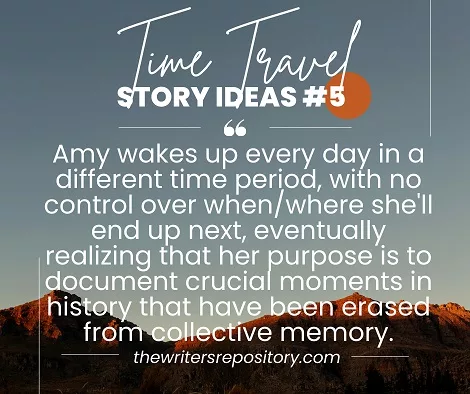
Looking for unusual time travel story ideas and writing prompts? You’ve come to the right place!
Read on for ideas like a world where time flows differently in different regions, a person with an ability to travel in their dreams, and more!
Jump to Section
- S tory ideas
Picture prompts
The time travel trope.
This post may contain affiliate links, which means that I may receive a commission, at no cost to you, if you make a purchase using these links.
Related posts: Tragic Love Story Ideas (2023) The Most Enticing Forbidden Love Story Ideas (Updated in 2023) 40+ Sad Backstory Ideas for Your Character (2023) 17+ Enticing Soulmate Story Ideas (2023)
Time Travel Story Ideas & Writing Prompts
Time travel has long been a captivating concept in storytelling, transporting us to narratives of endless possibilities. Now, let’s explore some unique and unconventional story ideas!
Please note that the genders in these prompts and story ideas are just placeholders and do not mean to enforce any hurtful stereotypes nor offend anyone.
Story ideas
From unexpected time travelers to unconventional methods of traversing through time, embark on a thrilling, time-bending adventure with these exciting ideas.
- Lost Time A group of explorers stumbles upon an alien-made, time-traveling elevator that can transport them to different moments within their own lifetime, at the cost of reduced longevity.
- Reversed A scientist makes a mistake in their time travel machine, which sends them spiraling into an alternate reality where time operates in reverse.
- Past and Future Memories In a post apocalyptic world, a person finds that they can jump into the past as well as potential future memories of others. Then, they navigate through different people’s experiences in the hope of finding a way to undo the effect of the apocalypse.
- Time is Money In a world where time flows differently in different regions, a society formed where time travelers exist and time itself can be a commodity. (Originally appeared in my post The Most Mesmerizing Fantasy World Ideas (2023) )
- Chronicler of Lost History A person wakes up every day in a different time period, with no control over when or where they’ll end up next. As they try to find out why, they realize that their purpose is to witness and document crucial moments in history that have been erased from collective memory.
- Time-Traveling Detective In a time when time travel is possible, a time-traveling detective agency specializes in solving crimes and incidents that occur across different points in time.
- Network of Selves There’s a new invention that allows people to split their consciousness into multiple timelines, creating a network of parallel selves.
- Tour Across Time Time travel is a regulated industry, and a tour guide accidentally takes a group of tourists to a time period that never existed, causing a ripple effect that alters the course of history.
- Time-Traveling Companion There’s a peculiar type of animals that have the innate ability to traverse time. Once they form a unique bond with a human, the bond will allow that human to time travel along with said animal.
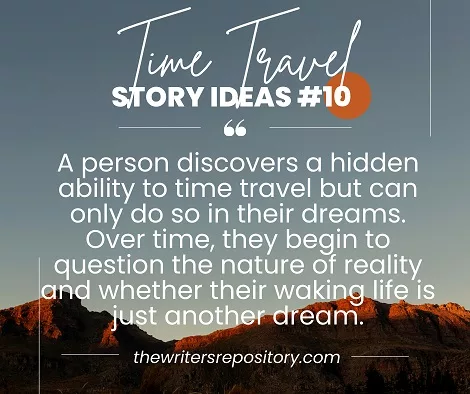
- The Time Capsule After unearthing a long-forgotten time capsule, a tight-knit group of friends is transported back to their younger selves. (A similar concept appeared in my post Beyond the Mundane: Captivating Slice of Life Story Ideas (2023) )
- The Time Thief A physicist accidentally creates a device that allows them to move between parallel universes. They exploit this power to commit crimes across dimensions, staying one step ahead of authorities.
- The Reversed Time Traveler A time traveler’s machine malfunctions, causing them to experience life in reverse. Frustrated by their reversed existence, they seek to disrupt the flow of time itself.
- Cheering Through Time An alien with the ability to explore different time periods gets stranded on earth and befriends a cheerleader. But as the two jump between time periods, they unwittingly start a chain of event that might spell catastrophe for both of their home planets.
- Happy Days Specific emotional triggers can create a quantum leap, launching individuals through time to a moment in the past or future when a similar emotional event occurred.
Here are some time travel picture prompts, because a picture speaks a thousand words! What kind of time travel prompt or story jumps out at you when looking at the picture prompts below?

The concept of time travel has fascinated storytellers for generations, offering endless possibilities and narrative intrigue, allowing writers to explore the complexities of cause and effect, challenge the boundaries of linear time, and delve into the profound impact of altering the past or glimpsing into the future.
In time travel stories, protagonists often find themselves in paradoxes and moral dilemmas as they attempt to correct past mistakes, change the course of history, or prevent catastrophic events where the smallest alteration can have far-reaching repercussions.
Time travel narratives also provide a fertile ground for exploring themes of identity, self-discovery, and the relentless march of time, prompting characters and readers alike to ponder the nature of free will and the fragility of existence.
If you need more story ideas and prompts, please browse our Story Ideas & Writing Prompts category!
Have any question or feedback? Feel free to contact me here . Until next time!
Related Posts

Crime Thriller Story Ideas That Captivate Us (Updated in 2024)

Tragic Love Story Ideas We’re Rooting For (Updated in 2024)
Enjoy this blog? Please spread the word :)

10 Time Travel Story Ideas with a Mystery
- Posted on 29 Dec, 2023
- Leave a comment
The Missing Artifact: In the year 3023, a renowned historian discovers an ancient relic rumored to possess time-traveling capabilities. Desperate to uncover its secrets, they embark on a journey through different eras, tracing the artifact’s origins. However, each leap through time reveals cryptic clues and unsolved mysteries, leading them on a perplexing trail where the artifact’s true purpose and the enigmatic figures behind its creation remain elusive.
The Time Loop Enigma: A physicist accidentally triggers a temporal loop, reliving the same day in various historical periods. As he navigates through different epochs, strange anomalies and clues emerge, suggesting a hidden pattern in the loop’s occurrences. The mystery deepens as they encounter echoes of their actions across time, uncovering a web of interconnected events that may hold the key to breaking free from the loop.
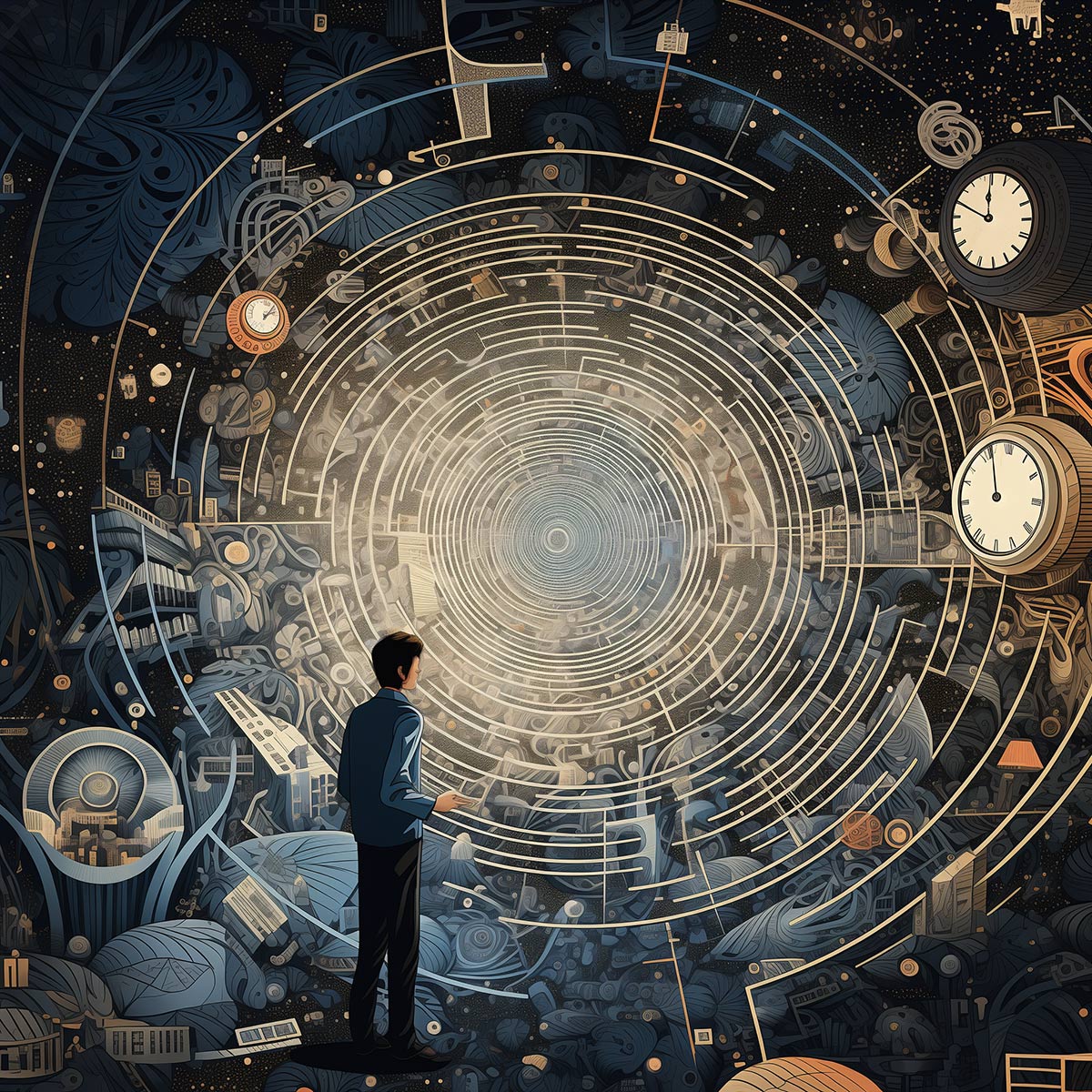
The Vanishing Colony: A group of time-traveling explorers visits an early American colony only to find it inexplicably deserted. Unraveling the mystery leads them through a series of temporal jumps, encountering clues left behind by the vanished settlers that hint at a secret society practicing temporal manipulation. Pursuing the truth puts them in a race against time as they navigate through history to prevent a catastrophic alteration of the timeline.
The Ghost Ship Expedition: A team of historians discovers an ancient maritime vessel that vanished without a trace centuries ago. As they investigate the ship’s disappearance, they find themselves inadvertently transported back to the ship’s final voyage. The eerie atmosphere and spectral occurrences hint at a temporal anomaly, forcing them to solve the mystery of the ship’s fate before they become trapped in the past.

The Time Traveler’s Journal: A researcher stumbles upon a journal filled with detailed accounts of time travel experiences. The journal’s author remains a mystery, but their accounts depict visits to pivotal moments in history. As the researcher follows the journal’s clues, they uncover a clandestine organization guarding the secrets of time travel, facing moral dilemmas and paradoxes along the way.
The Anachronistic Artifacts: An archaeologist unearths ancient artifacts that seemingly belong to different time periods. Each artifact possesses advanced technology far beyond its era, hinting at a time-traveling civilization. Investigating further, the archaeologist discovers a clandestine society manipulating history for their gain, prompting a high-stakes confrontation across multiple timelines.
The Time Crime Investigation: In a future where time travel is regulated, a detective specialized in temporal crimes investigates anomalies disrupting the timeline. They follow a trail of paradoxes and anomalies, uncovering a rogue time traveler manipulating historical events for personal gain. Pursuing the culprit leads the detective through a maze of altered realities, challenging their understanding of cause and effect.
The Temporal Conundrum: A group of friends accidentally discovers a device that allows brief jumps through time. However, their experiments spiral out of control, causing rifts in the temporal fabric. As they struggle to mend the fractures, they encounter versions of themselves from alternate timelines, forcing them to confront the consequences of their actions and the existential mysteries of multiple realities.
The Time Heist: In a daring attempt to rectify historical injustices, a team plans a heist across different eras to retrieve stolen artifacts and return them to their rightful place in history. As they navigate through various time periods, they uncover a hidden agenda behind the thefts, leading to a confrontation with a shadowy figure manipulating the timeline for personal gain.
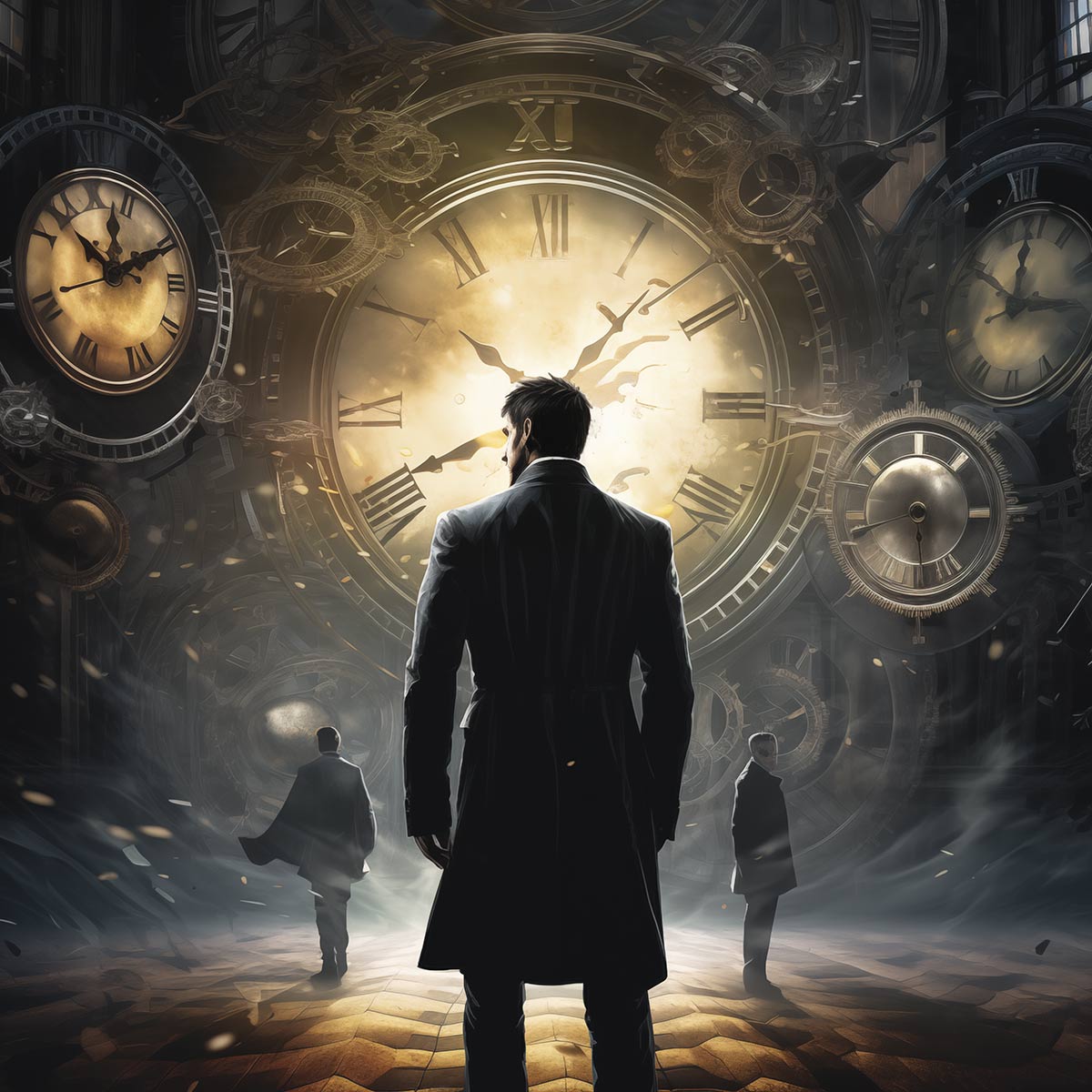
The Time-Traveling Detective Agency: Operating under the radar, a clandestine detective agency specializes in solving cases that transcend time. They receive cryptic requests for assistance from across different historical periods, investigating crimes with connections across centuries. Each case unravels a deeper conspiracy linked to a mysterious figure manipulating events from the shadows, challenging the agency’s resolve and ethical boundaries.
Let us know what you think about our ideas! Comment below to give us your opinion, add onto an existing idea, or submit one of your own!
Related Post

50 Climate Change Science Fiction Story Ideas

5 of the Best Podcasts For Science Fiction Writers (or really writers in general)

8 improvements to existing Science Fiction movies

5 Books to help you write better science fiction
Recent Posts
- 100 Important Comic Book Terms
- 40 of the best Time Travel novels of the past 40 years
- 10 Best Science Fiction Novels Everyone Should Read
- 140 Alien Story Ideas
- 100 Worldbuilding Tips For Your Next Sci-fi Story
30 Popular Science Fiction Themes
200 science fiction themes to kick off 2024, 30 memory manipulation science fiction story ideas, 10 interviews or speeches from the best science fiction authors of the past 30 years, help support this blog.

If you've enjoyed this blog or used it as a resource in your own creative writing, please feel free to help support the continued efforts of this blog by making a small donation.
You can make a donation by visiting my buymeacoffee.com page. Click Here to donate.
Sciencefictionideas.com is a blog I created as a place to brainstorm and share science fiction ideas, as well as a place to share things I learn in my efforts to become a published author.
I love connecting with fellow writers, so feel free to drop me an email with any feedback, questions, or just to introduce yourself! MORE ABOUT ME
JOIN OUR NEW FACEBOOK GROUP!
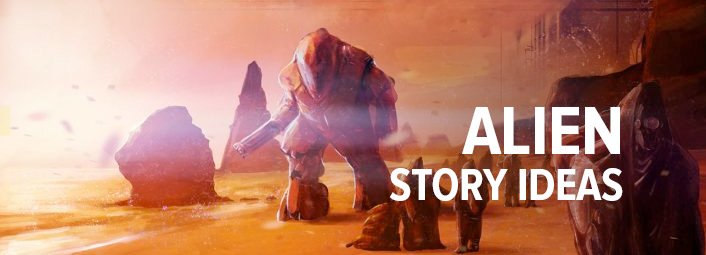
Request our Free PDF Guide to Developing Sci-fi Ideas
Most liked ideas/stories.
- The Time Stopper (860)
- 20 Sci-Fi Story Ideas (519)
- The Tiny Aliens and the Forest (369)
- The Android Planet (329)
- 10 Time Travel Science Fiction Ideas (270)
- 25 Science Fiction Short Story Ideas (256)
- A Time Travel Story - Part Four (252)
- The end of earth. (244)
- 4 Space Travel Writing Prompts (231)
- Friday Fright Night - 6 Horror Story Writing Ideas (230)
- 35 Alien Story Ideas (172)
- 9 Horror Story Ideas (171)
- 6 Alien Story Ideas (164)
- A Time Travel Story - Part Two (163)
- 10 Science Fiction Writing Ideas (151)
Sci Fi Ideas Newsletter
Sign up to receive our story ideas, writing prompts, and more!
Your Email (required)
- Aliens (16)
- Androids (8)
- Apocalyptic (8)
- Artificial Inteligence (7)
- Dystopian (1)
- End of Earth (3)
- Eternal Life (1)
- Fantasy Writing Prompts (1)
- Fountain of Youth (1)
- Frozen Planet (2)
- Future Inventions (9)
- Future Story Ideas (13)
- Gift Ideas (15)
- Invisibility (1)
- Life on Mars (3)
- Mad Scientist (2)
- Nanotechnology (5)
- Posters (6)
- Reviews (3)
- Sci Fi Civilizations (16)
- Science Fiction Book Ideas (53)
- Science Fiction News (2)
- Science Fiction Themes (13)
- Science Fiction Weapons (1)
- Short Story Ideas (6)
- Space Racing (1)
- Space Travel (11)
- Spaceships (5)
- Steampunk Stories (1)
- Story Ideas (60)
- Teleportation (1)
- Time Travel Story Ideas (12)
- Uncategorized (45)
- Virtual Reality (5)
- Writing Prompts (23)
- Writing Tips (4)
- Zombies (1)
- February 2024
- January 2024
- December 2023
- January 2023
- December 2022
- November 2022
- February 2021
- February 2020
- January 2020
- January 2019
- December 2018
- November 2018
- October 2018
- August 2018
- August 2016
- September 2015

Kimberly Van Ginkel
Author and avid reader. I love sharing interesting research and promoting other authors.
9 Rules for Writing Time Travel

I’m a sucker for time travel stories. I’ll read any book or short story, watch any movie or TV show, if it has a time travel element. I can’t get enough.
As a connoisseur of the art form – and as a novelist myself – I’ve developed these story-building tips for writing time travel
1. Give us the Shock & Awe
Writers are always told to start each story in media res , so it’s tempting to skip over the typical set-up scenes. With a time travel story, however, it’s best to introduce us to the characters before learn that time manipulation is possible. Why? Because if we watch them travel for the first time, we get to experience it with them.
Sure, we’ve seen hundred variations of this already, where the character who knows time travel doesn’t exist gradually comes to accept that it is real. It may be hard to find a fresh take. On the other hand, mastering the 4th dimension is a mind-blowing concept, so it ought to take a while to process.
The original draft of Groundhog’s Day opened with Phil Connors already trapped in his loop of repeating days. Had they filmed that version, we’d have been robbed of all the great build-up scenes where the tiny details of Phil’s day start to build, hinting at him that something is very, very wrong.
We’d have skipped past the catalyst of the story and the audience would be struggling to keep up.
Picture Marty McFly walking through 1955’s Hill Valley for the first time in Back to the Future . He has already been told that Doc invented time travel. The writers might have had him immediately accept that fact and jump straight toward some decisive action to change his predicament. Instead, they allowed him a little time for confusion, a period of denial, which also gave us time to look around with him and spot the changes in the town. With every new person or building he sees, we feel his sense of awe growing, taking in the enormity of where he is and what has happened to him. These few moments immerse us in the world with him.
It’s worth mentioning that in Palm Springs , Nyles has been repeating this day for years, but this works because we, the audience, get to watch the other main character, Sarah, enter the time loop for the first time.
This is the magic of a time travel story. Think of it as your “Dorothy opens the door to Oz” moment. Don’t rush it. This is often the most captivating scene of any time travel story.
2. Pick Your Method
Every time travel story has to have something that functions as the device, portal, or catalyst to time travel.
In H.G. Well’s The Time Machine , it was a literal machine that the hero climbed into, and that set the standard for decades of time travel stories. Poul Anderson’s Time Patrol stories employ hover-motorcycles that can jump through time. Doc Brown used a Delorean. Time Travelling with a Hamster (a very funny middle-grade book) uses a metal washtub wired to an old Mac computer.
Just like the wardrobe leading to Narnia, portals are a specific location that allows you to pass between times. In Stephen King’s 11.22.63 the portal is simply a staircase that they refer to as “the rabbit hole.” Star Trek TNG often utilizes worm holes for its time jumps.
Sometimes there is nothing mechanical involved, nothing that would give our characters any control of their destination. Any number of stories involve a character getting a concussion or struck on the head and waking up in another time. In The Time-Traveller’s Wife , Henry has a chromosome disorder that randomly catapults him through time; before each occurrence, he can feel the sensation of an impending jump.
3. Anything goes, as long as you explain it.
The important thing is to show the audience what your method looks like so that we know what to watch for during the story. Even if the character doesn’t know what caused it, if we witnessed him falling asleep and waking up in a different time, we have a framework for the story. We don’t know how the person will get home, but we realize something similar will have to happen to return them to their own time.
No matter what means you use to allow your characters to time travel, the important thing is to show the audience how it happened – at least, as much as your characters know – then give us the rules that govern it .
Doc Brown explains how to set the target date, load the plutonium, and get the car going 88 mph to trigger the time jump. When we see Marty doing exactly those steps a few minutes later, we know before he does that he’s about to travel to 1955. It also sets up the rules for bringing him back home.
In The Edge of Tomorrow , we learn that it’s the blood of the “Alphas” that allows the hero to loop through time. Therefore, if he gets a blood transfusion he will lose the ability. Until then, every time he dies the day resets. All of this is explained to him in the first act of the story, and is repeated again so the audience knows the rules and the way to end it.
It’s OK to keep the explanation brief, and even to leave out critical information, if that’s what your plot requires. But when you skip the explanation altogether, you’ll leave your audience wondering. You don’t want them to be distracted throughout the story, looking for clues that you haven’t dropped, as they try to understand how the hero is going to get back home.
4. Create Your Own Rules
Can the characters change the past? If so, can they make changes to their own future? How does the cause/effect work? There are a million permutations to this, and the most wondrous thing about his genre is that since time travel doesn’t really exist, your logic can never be wrong . How freeing is that?
The only thing your audience will expect is that you stay consistent with whatever version of time travel you set up initially.
Some of the most common time travel tropes are:
- “I know what I’m doing.” – the time-traveller knows both the original time line and the new version because he is immune to the effects of the change – see Jodi Taylor’s Chonicles of St. Mary’s series.
- “I used to know what was going on.” – as soon as the hero interacts with the time line, he is changing the past, including his own memories – see Looper , Quantum Leap (Sam and Al’s memories of events differ after a major change, as Sam is remembering only the original time line. For example: Watergate.)
- “There is no cause and effect.” – anything the traveller does are events that always existed. The past changes him as he changes the past, so there are no alternate time lines. – See The Time-Traveller’s Wife .
- “Nothing is able to change.” – the time-traveller is forbidden from making changes (not just a rule, but a law of physics) so they are viewing the past only. Alternately, they can make only minor changes that have no lasting effects. – See To Say Nothing of the Dog .
- “I’m only looking” – our heroes cannot move through time, but they can send technology that allows them to see the future or past – See Pastwatch: The Redemption of Christopher Columbus .
- “Time corrects itself.” – attempts at major changes are thwarted as the universe finds its own ways of staying on track. – See Night Watch (Sam’s mentor is killed when he visits the past and he is forced to take the man’s place, thereby making himself a major influence in his own young life.)
- “Everything changes.” – any large-scale disruptions in the time stream will completely disrupt everything “downstream” from that event. See Anderson’s Time Patrol series (These time cops base their operations a million years B.C. so that if anything upsets the time stream, their patrol can still exist to fix it.)
Know which type of story you are writing and stay true to the cause/effect rules you have created.
If your character goes back in time, confident that the past cannot be changed, then kills his own grandfather and blinks himself out of existence, both you and the audience are now in quite a pickle. This character who no longer exists was never there to kill the grandpa. Oops. You’ve introduced a paradox that is going to hurt everyone’s brain unless you have an amazing trick up your sleeve to get us out of it.
Paradoxes suck for everyone. Give your readers an expected structure and then stick to it so that we’re not left arguing with the screen that, “that makes no sense!”
5. Or Give Yourself an “Out” to Break the Rules
Because it’s difficult to write time travel without flirting with paradoxes, some writers give themselves a work-around — a way of breaking their own rules in a way that feels as though it’s still consistent.
You can cheat.
Avengers: Endgame is a brilliant movie. It’s so good, in fact, that it gets a pass on blatantly breaking its own rules about time travel constraints. The Hulk gives a short lecture explaining why they can’t change the past, they then go on to twist time in ways that make no sense against the structure of time travel in this movie (remember the scene where AntMan is turned into a baby, then an old man, then himself again in what appears to be seconds for him?). But all these discrepancies get glossed over by explaining that the Quantum Realm is mysterious. Ah, Quantum Realm, the magical spackle for filling in plot holes.
You can play dumb.
Ever notice how the main character in these stories is rarely ever the brilliant scientist who developed time travel? Not only is it easier to relate to an everyman character, it saves us all from having to understand the science. You can have your extremely smart person introduce it and explain the rules, then let your hero accept it on faith without thoroughly understanding it.
I love this method because it gives you, the author, the freedom to include as much or as little science as you want to. Gloss over as much as you want to and have the scientist say, “Just push this button” and you can forge ahead with your plot. It’s enough for the audience to know that someone in this world understands it all.
You can yell “Hey, look over there!”
One of my favorite “nevermind my rules” moments is from Grand Tour: A Disaster in Time . Our hero, Ben, has jumped through time to break himself out of prison. The viewer immediately has to wonder how the universe will reconcile this, as Ben has now changed his past and there are suddenly two of him living in town. The writer must have felt trapped in a corner as well, because he threw in this beautiful bit of dialogue:
Original Ben: “How can we both be in the same place at the same time?”
Time-Travelling Ben: “(Forget) the physics, Ben! By the time you figure out whether it’s possible or not, we’re gonna be dead. Twice!”
Easy as that! The paradox doesn’t really matter because we’re now diving back into the action.
Which brings me to:
6. Keep the Clock Ticking
When you have time at your command, why panic, right? Why rush anything?
Because stories need tension. And a great way to add tension is to give your hero a ticking clock. As the wise Rufus once said (in Bill and Ted’s Excellent Adventure ), “No matter what you do, no matter where you go … the clock in San Dimas is always running.” They had only 24 hours to get to their history exam, despite being able to hop through time.
A less silly example is King’s 11.22.63 , where his time portal leads him to the year 1958. In order to prevent the JFK assassination, Jake must spend 5 years in the past. Because of that time commitment, the idea of doing it more than once becomes nearly impossible. Thus, in the countdown to November 22nd, his time is as short as everyone else’s. The time portal can’t help him anymore. And the tension is every bit as high as if he had never discovered time travel.
7. Flip the Script to Make it Difficult
We are rooting for people, not gods of time. It’s cool that they have this wonderful ability, but your story is more gripping if something happens to make them unable to use it. We want them to be able to suffer setbacks, something they can’t easily undo.
Perhaps there is something inherent in your rules of time travel that will constrain the hero. In the Time Patrol stories, one unbreakable rule is that a traveller can never visit the same time twice. So if they make a mistake, they can’t return to that same time to undo it. In About Time , Tim can travel at will to any day within his own lifetime. Just as he’s getting used to this ability, he discovers that changing anything that happened before his children were born will cause them not to exist.
Sudden reversals are even better. In Time Bandits , our heroes have a map of every time portal in world history … so, of course, they lose the map!
8. Choose a Global Background, Then Make it Personal
Give in to the temptation to choose huge moments in world history. Why not? That’s the lure of time travel — the great question of “Where would you visit if you could go anywhere at any time?”
The birth of Christ? The signing of the Declaration of Independence? Woodstock? Pompeii? The assassination of Lincoln? The birth of Rock & Roll?
The history books are open to you. Pick something awesome.
But here’s the thing – as cool as all of those are, the best time travel books are the ones that focus on people . The bigger your background event, the more important it is to show it through the eyes of the people living there.
Connie Willis set The Doomsday Book in the middle of the Black Plague. Instead of showing the cities, she sent her hero to live with a small family out in the safety (uh-oh) of the country. She also created a 2-book series, Blackout and All Clear , set during the blitzkreig of London. Her plucky historians mix with civilians and military personnel, forging relationships that make us care about the fate of those individuals.
King’s 11.22.63 is ostensibly about the JFK assassination, but the characters our hero meets along the way are so wonderful that, to be honest, I wanted the hero to give up on trying to save Kennedy and settle into his fake life in the ’60s.
Diana Gabaldon’s Outlander series stretches from the Jacobite Uprising in Scotland through the American Revolution. We see wonderful scenery, experience famous events, and encounter great figures from history. But no one reads those books just for the historical details. The heart of that story is the romance of Claire and Jamie.
Remember that time-travel is a means of telling your story, not the entire story itself. Make your characters matter .
9. Be Unique
Time travel has been the source of some of the most creative sci-fi works ever made. Keep twisting it to create your own rules and your own wonderful stories.
Remember that it does not have to be linear time travel. Though most of the stories I’ve mentioned involve a person being displaced from his own time, there are other permutations to explore.
The Restaurant at the End of the Universe involved a bubble existing outside of space-time so that elite diners could watch the death of the universe while enjoying cocktails.
Groundhog’s Day introduced such a charming notion of 24-hour time loops that it created a whole sub-genre, including the comedic horror film Happy Death Day .
And The Girl, The Gold Watch, and Everything allows its main character to stretch time, living an entire hour in the space between seconds. This gives him the superpower of incredible speed, as viewed by other people. Since we’re living in the time gaps with him, it makes for an intriguing notion of time travel.
One last thought … if you are looking for inspiration for a new type of time travel story, I recommend the book Einstein’s Dreams , a quick read with beautiful vignettes that illustrate different time theories.
Share this:
11 thoughts on “ 9 rules for writing time travel ”.
Hi. Releif. Im trying to be Mr. Spock as it pertains to my time travel rules. Doubably difficult for me as the ‘ Brain’ of the bunch needs to spew out some plausabile sounding techno babble. I need to be acurate too as Im postulating relativity theory. I think though I have a device to get arround that. And what doesnt fit, fits a quantum paradigm Im saving ( if I ever get to the writing part) for book three. Im going to definitly not abuse the priveledge of the readers crudility.
When you’re done, make sure to post a link here so we can all read it.
Thanks for a great article. Just starting to write my first time travel novel.
Like Liked by 1 person
Thank you, this was a great article! I’m planning to write a time travel story for NaNoWriMo.
Best of luck! NaNo is a wonderful challenge.
Wow, love the article Kimberly. Really glad that in addition to covering the different models of time travel and making sure the character story is more important than the time travel aspect — you gave great tips on how to get yourself out of a paradox. I tend to paint myself into a corner even when not writing about time travel. But those are some handy examples of how and why to break the rules, very freeing!! I wish I could go back in time and tell all this to my younger self. But then, I wouldn’t need to!!
Amazing article! It has helped me so much. Thank you!
This was a very helpful article. Thanks so much for posting it. I am trying to write a handful of time-travel short stories, keeping them under 5,000 words. I’m finding it difficult to develop the characters properly while operating in such a limited length.
I’m so glad you liked it. Let me know how you do with your stories. I have always had a harder time with short stories than with novels, myself.
Thanks so much! I will try to keep you updated. I learned a few lessons when I wrote my first and only (so far) book, “Nineteen for Lincoln”, which is a time travel novel set in Civil War Missouri, and then Tudor England. I did not market the book at all, even though it’s available on Amazon, B & N, etc. in print and Kindle. Sort of a shameless plug there, but I’m not looking to make money–I just love time travel. 🙂
I changed my name from “Anonymous” to DJoseph, by the way.
Leave a comment Cancel reply
Follow the author.
Kimberly Van Ginkel is an internationally-published author living in the Midwest.
Her debut novel, “ In the Sleep of Death ,” has been described as “Jonathan Strange and Mr. Norrell” meets “The Ten Thousand Doors of January.”

Blog at WordPress.com.

- Already have a WordPress.com account? Log in now.
- Subscribe Subscribed
- Copy shortlink
- Report this content
- View post in Reader
- Manage subscriptions
- Collapse this bar

30 Time Travel Writing Prompts
Ever feel stuck in the present moment?
Wishing you could grab a pizza with Cleopatra, mastermind a plan with Machiavelli, or explore a future city filled with gadgets we can’t even imagine ?
Hold onto your hats because we’re about to blow the doors off time travel stories!
Forget boring timelines, paradoxes are your new BFFs. These prompts will have you rewriting reality, jumping through history , and making the rules of time as bendy as a pretzel.
Let’s check them out.
Time Travel Writing Prompts and Story Ideas
- Winds of the Lost Era: A gust of wind has the unique ability to transport anyone it touches to a different time for just one hour. When a young woman gets caught in this wind, she finds herself in the midst of a pivotal historical event. She has exactly sixty minutes to observe, interact , or possibly change history. What event does she witness? And what choices does she make?
- The Last Sunset Before Eternity: The world’s leading scientists discover that there’s only one sunset left before the earth stops rotating, plunging half the world into perpetual day and the other half into eternal night . They’ve also created a one-time-use machine that can send one person back in time to prevent this. Who is chosen? And what historical point do they go back to to make things right?
- Messages Across Time: A young woman discovers she can send messages to her younger self through dreams . Each message can only be a short sentence, but it’s enough to give her past self clues or warnings about the future. However, every change she makes creates ripples in her present, and sometimes, the outcomes are not what she expects. What message does she send first? And what unforeseen consequences emerge?
- The Day the Clocks Stopped: Time everywhere freezes, except for one city. Its inhabitants live through days, months , and years while the rest of the world remains static. As they advance technologically and culturally at a rapid rate, they prepare for the day time might resume for everyone. How do they plan to reintroduce their city to the world, which is now centuries behind?
- Chrono-Tourists: A company starts offering ‘Time Travel Tourism’. You can’t change major events, but you can witness them. A young couple decides to go on their honeymoon to witness a peaceful, beautiful moment from the past. But when they arrive, they realize it’s the eve of a significant, unrecorded disaster . How do they reconcile their experience with the joy they were expecting?
- The Museum of Moments: In the future, there are no traditional museums. Instead, there’s a museum where people can experience any moment from the past in full sensory detail. A teenager decides to relive the ‘most peaceful day on Earth’, only to realize that peace is often a matter of perspective. What does he truly witness on this so-called peaceful day?
- Time’s Locket: A locket passed down through generations in a family doesn’t just contain pictures ; it allows the wearer to briefly live in the moments the pictures were taken. A young girl decides to experience a day in her great- grandmother ’s life , hoping to understand her better. However, she discovers a family secret that has been hidden for decades, changing her understanding of her lineage.
- Letters in the Sands of Time: In a small coastal town, messages mysteriously appear at sunrise on the beach , always addressed to someone present there. These are letters from their future selves. A man, skeptical at first, starts reading a letter addressed to him and discovers details of a choice he’ll soon have to make. What decision looms in his future, and how does this knowledge affect him?
- The Two Lifetimes of Ms. Daniels: On her 30th birthday , Ms. Daniels wakes up to find herself back in her 10- year -old body but with all her memories intact. She lives her life again, making different choices based on her memories, until she reaches 30 again. And then, she’s back in her original timeline. How do her dual experiences shape her perspective? Which life felt more real to her?
- Echoes of the Time Vortex: A cavern hidden in the mountains is said to echo not sounds from the present, but conversations from the past and whispers of the future. When a grieving mother enters the cave, she hears the voice of her departed child from a future that never happened. What message does she receive, and how does it change her healing process?
- The Train at Midnight: There’s a legend of a train that passes through a town at midnight. Those who board it are taken to any point in time they desire, but they can only observe and feel emotions —they can’t interact. A woman boards to revisit a day she considers her life’s biggest mistake. What day does she return to , and what closure does she seek?
- Chronicles of the Hourglass City: In a city shaped like an hourglass, the top half lives in the past and the bottom half in the future. A bridge connects the two, and citizens are allowed a single journey across it. A young woman from the future decides to cross into the past. What or who is she seeking, and what challenges await her in this duality?
- Diary from Tomorrow: A man finds a diary on his doorstep, and to his astonishment, it’s filled with detailed entries from the next year of his life. Each day he reads about tomorrow, and each time he’s faced with the moral dilemma of acting on or ignoring the knowledge. What major revelation does the diary hold, and does he dare to change its course?
- The Timestream Weaver: In an old attic, a loom is found that doesn’t weave fabric but moments in time. When operated, it can merge moments from different times into one. A curious teenager weaves together a day from her childhood and one from her elder years. What harmonies or conflicts emerge from this singular day?
- Guardians of the Temporal Oasis: Deep in the desert lies an oasis where every drop of water lets you relive a moment from your past. But, you can’t choose the moment—it chooses you. A traveler, seeking refuge, drinks from the oasis and is thrust into a forgotten memory. What long-buried moment resurfaces, and how does it change his path forward?
- The Timeless Town Square: A secluded town has a central square where time doesn’t flow linearly. Every day at dawn, the square chooses a random day from the past or future to reflect. Townspeople can enter to relive memories or see snippets of what’s to come. One day, the entire town gathers as the square displays a date significant to all. What date is shown , and how does it bind the community ?
- Candles of Yesteryears: A boutique sells candles, each corresponding to a year in history. When lit, the room transforms, enveloping the person in the ambiance of that year. An elderly woman buys a candle corresponding to a year she wants to forget. As it burns, what secret memory unfolds, and what catharsis does it bring?
- Threads of Time: In a mystical land, there are multiple threaded structures that showcase the entire timeline of the universe . When touched, a person can feel the emotions of any moment stitched into it. A young prince touches a seemingly insignificant thread and is overwhelmed by its intensity. What hidden moment did he discover, and how does it reshape his understanding of history?
- The Mirror of Moments Past: A mirror in an antique store doesn’t show the present but a past version of whoever stands before it. A woman sees herself as a child, interacting with someone she doesn’t remember from her childhood. Who is this mysterious figure , and why have her memories of them been erased?
- Temporal Tunes of the Old Gramophone: An old gramophone has the power to play not just songs but also ambient sounds from specific moments in time. A listener can immerse themselves in the atmosphere of that moment. A man hears the background noise of a place and time he never visited but finds strangely familiar. Where does this sound take him , and what lost connection does he rediscover?
- The Garden of Future Blooms: In a secret garden, flowers bloom showing visions of potential futures. One rare flower is said to bloom only once every century, showing a vision crucial for humanity. As it blossoms, many gather to witness its vision. What future does the flower reveal , and how do those who see it react?
- Clockwork of Cosmic Consequences: A clockmaker designs a timepiece that can turn back time, but for every minute turned back, it fast-forwards another person’s timeline by a year. The creator, desperate to rectify a personal mistake, uses it, but at what cost? Whose life gets fast-forwarded , and how does this unintended consequence play out?
- Whispers of the Time-Touched Tree : A tree in a forest is said to be touched by time. Those who sleep under it dream of a moment from their past, but from the perspective of someone else who was there. A soldier, burdened by guilt, sleeps under the tree, hoping to understand a decision he made in battle. Whose eyes does he see through , and how does this new perspective aid his quest for forgiveness?
- Shadows of the Sundial: In an abandoned village, there’s a sundial said to cast shadows not of the current time but of times gone by. When a researcher places her hand where the shadow falls, she’s momentarily transported to the moment the shadow represents. She inadvertently touches a shadow that takes her to a day the village wishes to forget. What dark secret is unveiled, and how does she reconcile with the truth?
- Temporal Café: A café opens downtown where each table is set in a different era. Patrons can’t interact with the past or future directly but can witness and hear conversations. A detective sits at a table set in the future, trying to solve a case that’s stumped him. What revelation about the case does he overhear, and how does it change the course of his investigation?
- The Time-Torn Map: An explorer discovers a map that doesn’t just lead to places but to times. Marking a location and date transports the holder to the specified moment. The explorer chooses a date and place where a famous artifact went missing. What happens when he arrives , and how does this journey reshape historical narratives?
- Waves of the Temporal Beach: There’s a beach where each wave that crashes ashore comes from a different era. Collecting items brought by the waves can provide glimpses into various moments in time. A historian finds an item linked to her family’s past. What story does the item tell , and how does it redefine her family’s legacy ?
- Melodies from the Time-Touched Violin: A violin is found that, when played, doesn’t produce sound but images from the past or future. A musician plays a tune, and a series of events unfold before her, hinting at a future personal dilemma. What decision does she foresee , and how does she prepare for it?
- Stairs of the Epoch Tower: An ancient tower’s stairs are said to ascend through time. With each floor representing a different era, climbers can observe, but not interfere. A writer ascends, seeking inspiration , but finds himself on a floor mirroring a future event of his own life. What event does he witness , and how does it inspire his next work ?
- The Time Capsule’s Promise: A school ’s time capsule is unearthed not by students from the present but by visitors from the future. They leave behind a message for the current generation about an impending global challenge. What warning do they give , and how does the world rally in response?
Founder and Chief Content Curator @ Digital Phrases
I'm a writer, words are my superpower, and storytelling is my kryptonite.
- Commenting Policy
- Advanced Search
Dear Author
Romance, Historical, Contemporary, Paranormal, Young Adult, Book reviews, industry news, and commentary from a reader's point of view
CONVERSATION: Time Travel Questions
Sirius had some questions for us—and you—about time travel stories. This discussion will run in two parts, with today’s focusing on the questions below and Monday’s reserved for discussing Outlander and for our book recommendations. -Janine

kinopoisk.ru
1. Do you enjoy time travel as a trope in a book? If you do, when do you consider such a plot twist successfully executed?
2. There are usually several different means of time travel in the books. The character may get into another time by accidentally or deliberately walking into the place which is a connection between our time and the other time, the character may use some time travel device, the character may be forced to time travel by another character. Do you have a favorite one? If you do, which one and why do you prefer it?
3. Do you actually care if the time travel consequences make sense? I am talking about the idea that many authors use and some don’t that the time traveler may influence the events of their present time by appearing in the past. I am not even talking about radical influences (killing Hitler kind of thing), but simply suggesting to somebody that doing something is not a good idea).

Janine: I do enjoy time travel in books and movies. As with all tropes it depends on execution and sometimes I like it better than others.
Since you mention your early experiences with time travel, Sirius—one of my earliest was a book called Can I Get There by Candlelight? by Jean Slaughter Doty. It was sold out of a Scholastic catalog at school, does anyone remember those?
Jayne: Yes, I remember Scholastic books! I used to love to peruse the catalog in school.
Janine: Can I Get There by Candlelight? was about a girl with a horse named Candlelight who took her to an earlier time (19th century, I’d guess) where she met another girl. The ending was bittersweet but the way she discovered time travel felt magical (in the figurative sense). I remember being entranced and I read the book more than once.
Kaetrin: I love time travel books but I think I’m finicky about them. I do look for internal consistency.

I remember when I got back into reading romances in the late 90s and early 2000s, TT was a fairly popular part of the SFF subgenre. At first, it was interesting to me and I read quite a few – though I’d struggle to remember titles now. At this honeymoon stage, I didn’t really notice how well the TT was done but later I became more discerning especially if the time difference was in the hundreds or thousands of years. If the author didn’t include reasons why no one would notice the out-of-time time traveler (if the character was supposed to blend in) then it started to irritate me. I’d be thinking “why does no one notice this 20th C person’s strange speech in 16th C England or this 12th C person’s gobsmacked reaction to modern tech?” If the TT character wasn’t supposed to blend, I worried they’d end up in a mental asylum or arrested.
Janine: That’s a great point, Jayne, about how the time travelers are treated by the characters in the other time period. I don’t think anyone from the present could successfully impersonate someone from 1800 or the Middle Ages, but I want some nod to the fact that they have to think about how to pull it off and make an effort.
For me successful execution depends on multiple factors. Is the way the main character feels about the period they’ve traveled to believable? Does it take them time to adjust? Do they miss the comforts and technologies of the 21st century in the past, or see our twenty-first century society and technologies as primitive if they are from the future? Do they miss their relatives and friends back home? Is the time travel utilized in the plotting in ways that are interesting and fresh? Are there surprising obstacles in the character’s path how does the fact that they are from the future or the past play into overcoming those obstacles?

Jayne: I agree with Sirius about the depth of detail in books regarding time travel. Deliberately vague is fine for me. What irritates me is when the author starts with detailed descriptions and rules and then later hand waves away their own rules.
Means of Time Travel Janine: I don’t know if I have a favorite means of time travel, it all depends on execution, but accidental time travel and being forced to time travel are both more interesting to me than using a device on purpose because they suggest some kind of conflict. It’s more important to me that it be surprising and compelling than what it is, though.
Sirius: I think time travel machine built by future scientists is one of my favorite means to time travel. I don’t know why but somehow it always *legitimizes * time travel in my head or so to speak. If device can be built so there is a justification for it to work (never mind that such justification is completely made up).
Janine: I like it when the means of time travel is one I would never expect. To give an example of something similar, when Lucy travels to Narnia through a wardrobe, you don’t expect that. She is hiding so she heads toward the back of the wardrobe through the coats in the dark and then the coats slowly give way to trees and snow. That’s not time travel, but that’s the kind of thing I mean. In “Dr. Who”, the TARDIS can look like a phone booth on the outside and is a lot bigger than that on the inside. That was also surprising when I first saw it.
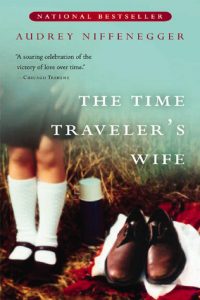
When Henry time travels, he always arrives naked and has to steal clothes and money or get someone to give them to him and to survive in the cold and escape being arrested for his nudity in public. Through reading that book I realized how much I like it when time travel presents real difficulties for the traveler and when it haunts the reader.
Sirius: In that movie I mentioned, “Guest from the Future” (and the series of kids’ books by Soviet writer Kir Bulychev), the main character is a girl from the future something like a hundred years ahead from the 1970s-1980s. She often gets to travel to the past for whatever various reasons (in time travel machine). In the movie though before Alisa ends up in “our time” the boy from “our time” ends up in the future. Why you say? His mom sends him on an errand. On the way he runs in the school mate who is observing a strange woman always disappearing into the old building. Of course the twelve-year-old boys have to investigate the mystery and it turns out that the woman is a time traveler who avoids them just in time to go back to her future. Our hero though sees a machine which could not / would not / didn’t have to be properly secured and goes to check it out because of course he would! And then all the mayhem and adventures both in past and present to follow.

Layla: I don’t care if the time travel makes sense, and I prefer it when the time travel happens accidentally. What I enjoy most is the fish out of water element like I said earlier–I like when a modern heroine has to navigate in a space that is unfamiliar. I think there is lots of room for humour and comedy and also that there is a fantastical element–dressing in beautiful clothes, being an aristocrat, and most of all, meeting or falling in love with a handsome chivalrous guy. There is an element of chivalry and romance and also courtship that can unfold in a historical setting that isn’t present in the same way in a contemporary context.
Consequences Jayne: There was one book, A Stitch in Time by Amanda James, where the travel was deliberate and meant to change things – but change them back to the things that needed to have happened but which had somehow got messed up. But beyond a neat premise, everything about it was wobbly including all the rules the author invented. It’s been years since I read it but I still remember this annoyed me.
Janine: In one of the most excellent books I’ve read in recent years, a science fiction thriller called The Gone World by Tom Sweterlitsch, the heroine has to travel to the future to find out more about an event that will annihilate all human life, her own included. She can only go to possible futures, not to the actual future, because by visiting them and bringing back information to the present, she causes the future to alter. She has to be on guard from other people in the future because if they figure out that she is a time traveler they may capture her to keep their timeline intact. All that was innovative and really well-executed.

Janine: I have mixed feelings about the trope about changing the past to change the future. It can be really engaging if but it’s also an eye roller. Your parents might not meet if you change things, and then you wouldn’t exist. Is the main character really that selfless? It takes some suspension of disbelief, so I need a strong motive.
One of the things I loved about The Time Traveler’s Wife is how it deals with the paradoxes of time travel. Henry can encounter himself and he uses that in useful ways, for example, his adult self trains his child self in pickpocketing so that he’ll be able to survive as a kid. He remembers the incident from both perspectives. It happens in Chicago’s Natural History Museum, which the child Henry loved, and at first it was really magical for him. When he realized what he was actually there to happen and that there was no solution to his involuntary time travel, little Henry was disillusioned. Adult Henry remembers this experience well even as he is disillusioning Henry the boy by teaching him these skills.
Time in the book functions like a mobius strip. Henry can buy a winning lottery ticket or Microsoft stock because his future self tipped him and told him that his profiting from these things will happen, but he can’t prevent anything if it is already a fact in any portion of the timeline, even if it lies ahead. The rules are entirely consistent.

See above, I don’t want for time traveler to influence anybody if they travel to the past. We’d love to hear from you on these topics. Do you like to read about time travel and what makes it successful for you? What is your favorite means of time travel in books? How important to you is it that the rules be consistent and the consequences make sense?
Share this:
Sirius started reading books when she was four and reading and discussing books is still her favorite hobby. One of her very favorite gay romances is Tamara Allen’s Whistling in the Dark. In fact, she loves every book written by Tamara Allen. Amongst her other favorite romance writers are Ginn Hale, Nicole Kimberling, Josephine Myles, Taylor V. Donovan and many others. Sirius’ other favorite genres are scifi, mystery and Russian classics. Sirius also loves travelling, watching movies and long slow walks.
As a kid and young adult I read tons of time-travel books. But then I disliked Outlander and stopped, until years later I picked up and was entranced as I read The Time Traveler’s Wife. I hated its ending so much that I haven’t read another time travel novel since.
And oh, do I remember Scholastic Books! Among the best memories of my childhood.
@ LML : I did not grew up with Scholastic Books. Harry Potter was my first introduction to them :). I was not a fun of The time Traveler’s Wife ending myself .
@ LML : @ Sirius : I’ve heard enough people say negative things about TTTW that I’ve never been interested in reading it.
I’ve never been much of a fan of time-travel (whether romance or straight-up SF). Oddly enough, about the only time-travel romance that ever worked for me (and, coincidentally, about the only one of her books that ever worked for me) was a very early Lisa Kleypas book, GIVE ME TONIGHT. It’s set in Depression-era Texas where the heroine lives with her older aunt, who often talks about a big family tragedy that happened about 50 years before. Somehow, the heroine is transported back to a big ranch in 1880s Texas, where she inhabits the body of her great-aunt. She is there to help avert the tragedy, and she falls in love with the ranch foreman in the process. I liked everything about the book, but I’m not sure Kleypas even acknowledges it anymore. It’s certainly never been available as an ebook.
Time travel is not one of my favorite tropes. In other words, I don’t seek out time travel books for the trope, but will pick them up for other reasons or if I’ve gotten a lot of good feedback from trusted sources. And, yes, I want the consequences and internal logic to make sense or at least be executed in a way that I can suspend belief.
I do remember those Scholastic book catalogues and looked forward to ordering from them when I was a youngster. One of my favorite children’s classics with time travel is Tom’s Midnight Garden by Philippa Pearce. It’s a great book for all ages!
@ DiscoDollyDeb : After you mentioned the Kleypas book before, I went to Amazon and saw they only had paperback copies for more than I wanted to pay.
@ Jayne : I tried reading it and couldn’t stand Henry so I never joined the fan club !!
I do love time travel and in a total aside, because of this post and discussion I started watching the outlander series and omg it’s so good!!!! The costumes and the castles!
Also— I enjoy the shock when time travelers encounter others who are but who are integrated or hiding it. I remember the shock of that revelation in Outlander. Usually, in romance at least, the heroine goes back alone and it’s a very singular and mysterious process. I enjoy that too of course
I was a big fan of books featuring time travel and similar tropes and read many of them when I was younger. I still read them from …pun intended… time to time. Most recently I’ve read The Gone World (mentioned above) and Yesterday Is History by Kosoko Jackson.
I don’t have a favorite means of time travel. I enjoyed Jack Finney’s Time and Again where the characters dress in clothes of the day and surround themselves with things of that time and basically think themselves back in time. I’ve also enjoyed books where the characters use equipment to travel in time such as (inadvertently in) Shay Savage’s Transcendence or (deliberately in) the Out of Time series by C.B. Lewis. I’ve also enjoyed books that use magic as a means of time travel such as the Lost in Time series by A.L. Lester. If the author writes a good book, I’m happy to read it!
I look forward to the next post!
@ Kareni : Thanks for reminding me about Out of time series. Must go check what I liked and what not, because I remember mostly nothing right now :)
@ Jayne : To be sure I mostly disliked the ending. Thought the book okay otherwise.
I wish that I still liked time travel stories, but I’ve learned through painful experience that they are usually dark/poignant/bittersweet/dystopian/horror or illogical, so that I cannot enjoy them.
That said, I’m enough of a sff aficionado to be able to know that Outlander began as a Doctor Who fan-fic (on the 2nd Doctor’s “Companion”, Jamie), and that the storyline of River Song in Doctor Who was blatantly based on tTTWife.
Will I pick up a time travel book again? It would need to be extraordinary.
Thanks for the conversation!
P.S. – IIRC, Jude Deveraux wrote a time travel romance. Did anyone else read it?
I’m fine with time travel and don’t think too hard about whether it makes sense or not, but I really haven’t read that many and it’s not something I seek out. A few I have liked are: Linda Howard’s Son of the Morning (have not read in a really long time), Susannah Kearsley’s The Rose Garden, and Kelley Armstrong has recently written A Stitch in Time and A Twist of Fate that I thought were fine, but I like some of her other writing a lot better.
I love time travel books – I like the what if? theme. What would it really be like to go back in time? I loved Son of the Morning and The Rose Garden. TT Wife not so much – I really disliked the ending.
One thing I’m not fond of is having lots of connected people going backwards and forwards to the same place, so that the past becomes almost a cosy commonplace destination. I think it was Lynn Kurland who had several like that.
I very much liked Nicola Cornick’s The Phantom Tree, which is unusual in having a heroine who’s come forward in time (Tudor times to contemporary). I’d love recommendations for any others like that.
I don’t seek time-travelling stories out, but I will read them if the plot interests me. I’m not interested in how the time travel happens (that I feel is a mere McGuffin to get the plot rolling) – but I do want fairly consistent rules about what can or can’t happen while the protagonist(s) are travelling. Thinking about it, I realize that overall I’ve read and enjoyed more science-fiction based TT stories than romance ones. I’m not sure why I prefer science fiction over romance when it comes to TT – maybe because if I am consciously choosing a TT story, I’m going to want the TT aspect and its possible paradoxical consequences to be central to the plot. In a lot of the romance TT stories that I’ve read, the TT aspect seems to serve more as a way for the MCs to meet cute.
Back in 90s when time travelling was a big romance trope I read a fair number (e.g., Devereaux’s A Knight in Shining Armor, Linda Howard’s Son of the Morning, some category ones by Nora Roberts). I’m not sure how well most of thoseTT romances would hold up – certainly I don’t remember a lot of details about them and am not interested in tracking any down. (The one thing I do remember is that I was fine with the ending of AKISA, but I know lots of people hated it.) Outlander never worked for me, I DNF it several times, before I finally gave up on it.
Unlike Outlander I did finish TTTW. I wanted to like it (part of it was set near where I grew up), but I found it too melodramatic and problematical. Also at one point in the book Henry runs along the shore of Lake Michigan at low tide – but Lake Michigan (like all of the Great Lakes) does not have tides. (Emily Henry I believe makes the same mistake in Beach Read – why do authors, who have actually lived near Lake Michigan, make this mistake? Do they not ever go down to the beach and watch the lake? This is one of those errors that always, always knocks me out of a story.)
One TT book I think that straddles the romance/science fiction divide is The Jane Austen Project by Kathleen Flynn – the time travellers, a medical doctor and a literary scholar, go back to the year 1815 (they are from the distant future era and possibly also from an alternative timeline to ours). Their mission is to befriend Austen so that they can find and save a rumoured unpublished manuscript of hers and if they can, they are suppose to diagnose the illness that will lead to Austen’s death in 1817. Of course befriending Austen makes it harder and harder for the doctor to ignore the fact that she might be able to save Austen from a premature death, but at the cost of altering her own chance to return to her own time. Both the romance and time travel plot lines are equally important to the story.
On the clear science fiction side – Connie Willis has done a loosely connected series of time-travelling books and short stories around a group of Oxford historians at an underfunded university time-travelling institute. The stories range from fairly serious (Doomsday Book, All Clear, Blackout) to fairly light-hearted (To Say Nothing of the Dog). There is usually a light thread of romance, but not always a happy ending.
Some of my favourite science-fiction TT stories from my tween and teen years are A Wrinkle in Time, which isn’t about time travel in the way that most people think of it – but instead uses “folds” in the time/space continuiuum as a way to travel great distances through the universe extremely quickly; Kindred by Octavia Butler, about a 26 year-old African American woman, who inexplicably travels from 1970s America to the antebellum south; and Ray Bradbury’s short story, “A Sound of Thunder,” which is literally about the butterfly effect.
And I loved Scholastic Books Service – my battered childhood edition of Wrinkle in Time was just one of the many books I purchased from them.
@ Jayne : I hated the movie. Hated.
@ Misti : Kearsley’s are my favourite time travel books. The Rose Garden and Mariana are fantastic. The Winter Sea is time-travel adjacent I think but my favourite of her books.
I loved your discussion, as Time Travel has always fascinated me, but I was often disappointed by the execution. Not in the science of it, as I don‘t need it to be very accurate, but I want to be able to believe it, for it to make sense to me. Also I am very much a happily ever after reader, so some Time Travel stories are just too sad for me. I did an episode on my own podcast on the subject – here is the link to my page with the books and movies I mention in it. https://notjustcheeseandchocolate.wordpress.com/2021/11/21/episode-09-on-time-travel/
@ Suzanna : Have you tried Cornick’s “House of Shadows”? Kaetrin reviewed that one.
https://dearauthor.com/book-reviews/overall-b-reviews/b-minus-reviews/review-house-of-shadows-by-nicola-cornick/
@Hilly: I believe the Jude Devereux book is A KNIGHT IN SHINING ARMOR. I’d totally forgotten that one! Back in the day, I read a ton of her books, including that one. The heroine gets transported back in time (Elizabethan England?) and falls for the lord of the manor. Then he comes to the present with the heroine (where he’s fascinated by pencil sharpeners and Playboy magazine). This one has a very bittersweet ending: the heroine and hero do not stay together and there is no HFN/HEA, but the heroine does manage to alter events and salvage the hero’s historical reputation.
I love Groundhog Day style time travel romances where the character gets the chance to repeat a certain day or time period and influence the outcomes (or just to figure out how to stop the loop and escape!). Eventually I even wrote my own and had so much fun working out all the twists. I’ve loved the concept of time travel since I saw the old “Connecticut Yankee in King Arthur’s Court” movie with Bing Crosby on late night TV as a kid. I thought IN A HOLIDAZE by Christina Lauren was quite fun and a wonderful example of this romance trope within the time travel genre. It’s one of my favorites!
@ DiscoDollyDeb : We’re going to talk a bit about AKISA on Monday’s part II post. ☺
@ DiscoDollyDeb and @Jayne: I’m swamped this week and can’t comment much but yes, we discuss many of the books that have been brought up here, and some others tomorrow in Monday’s post. Since we don’t go into the ending of the book in detail, though, I just want to amend what DDD said briefly. Whether or not the hero and heorine end up together in A Knight in Shining Armor is debatable since
SPOILER . . . . . . . . . . .
The hero is reincarnated and the heroine meets him in the last scene.
. . . . . . . . . . . END OF SPOILERS
Since I believe that in RL most scientists say time travel, other than the standard forward movement we all experience, is impossible, I’m willing to suspend disbelief and usually don’t care too much about the method an author chooses to move her characters backward and/or forward in Time. I did find the Jack Finney method, however, just a little too far-fetched, as it left unexplained why re-enactors don’t move backward in time. Linda Howard was a hugely popular author when I began to read Romance, but the first book of hers I read was “An Independent Wife” (not a TT, about a woman who was more doormat than independent), and I despised it. But I then read and loved “Son of the Morning”. Didn’t have a problem with the way Devereaux brought her couple together in AKISA since it seemed that if I could accept TT I could accept reincarnation (or the possibility that the hero was a many-generations descendent of the original hero). IIRC, “The Changling Bride” by Lisa Cach has the heroine travel back to Georgian England when the fairies repay a debt owed to one of her female ancestors — so not only do you need to believe in TT, you need to believe in fairies. I’ve not read it in years but I remember I liked it at the time.
A recent TT book that is “Before the Coffee Gets Cold”, by Toshikazu Kawaguchi. It is romantic, poignant, bittersweet as it relates the stories of 4 people who get the opportunity to TT by sitting in a special chair in a Tokyo cafe. There are rules to be followed, the present isn’t changed, and the visit lasts only until the coffee gets cold. It’s different and an interesting take on what TT can, and can’t, achieve.
@ Susan/DC : “before the coffee gets cold “ sounds interesting will check it out thank you .
For a recent twist on this, try Totally Rad Wormhole by Douglas J. Eboch. Two nerds from the ’80s accidentally open a wormhole to today and meet their adult selves at their 30th high school reunion. They don’t like the future they see, so they go back and try to change the future from their end.
The most “believable” and best time travel books I have read are Connie Willis’ To Say Nothing of the Dog and Doomsday Book. In that world, time travel is a discipline and there are rules to how to behave when people go back in time (rather like on a field trip), and a time travel machine. I suppose another aspect of time travel in science fiction is when characters are frozen, and then reanimated many years later in the future – such as in Ann Leckie’s Ancillary Justice. I had forgotten about Linda Howard’s Son of the Morning, which I enjoyed back in the day.
@ msaggie : Interesting that time travel machines make it more believable for you and for Sirius. They actually make it less believable for me. My dad is a physicist so I know a little about this and I don’t see how one could ever be made. So a machine just makes me more aware that the author is making this up.
@Jayne – I’ve read most of Cornick’s books and enjoyed them. I like dual time lines, too, and she does those well. But The Phantom Tree is distinctive in having the heroine come forwards in time. Seems like a theme which could be used much more.
@ msaggie : To Say Nothing of the Dog was great. Funny and even has a romance thread with a HEA! :)
@ Janine : In Jodi Taylor’s Chronicles of St. Mary’s series, there’s a time travel machine but the technology is totally handwaved. There’s a brief bit in the first book where Max gets an explanation of the tech but she doesn’t relate it to the reader. I find less information is better for me in these circumstances so I thought it was a clever choice by the author.
@ Kaetrin : In almost all of the books I’ve read with time machines the technology is handwaved. It has to be handwaved anyhow because it’s such an implausible technology. Time machines don’t ruin the books for me or anything, they’re only a bit jarring. I mostly brought it up because Sirius and Msaggie’s take on them was very different than mine.
FTC Disclaimer
We do not purchase all the books we review here. Some we receive from the authors, some we receive from the publisher, and some we receive through a third party service like Net Galley . Some books we purchase ourselves. Login
Discover more from Dear Author
Subscribe now to keep reading and get access to the full archive.
Type your email…
Continue reading

Paragraph on Time Travel
Students are often asked to write a paragraph on Time Travel in their schools. And if you’re also looking for the same, we have created 100-word, 200-word, and 250-word paragraphs on the topic.
Let’s take a look…
Paragraph on Time Travel in 100 Words
Imagine going back or forward in time like magic! Time travel means moving through time to visit the past or future. If we could time travel, we could see dinosaurs, meet famous people, or even solve mysteries. But time travel is just a fun idea for now. We can’t really do it yet. Time keeps moving forward, second by second. We can remember the past but can’t change it. So, enjoy the present moment and make the most of it. Who knows, maybe one day someone will discover how to travel through time for real!
Paragraph on Time Travel in 200 Words
Time travel is a really cool idea where someone can go backward or forward in time. Imagine being able to see dinosaurs or visit the future where there might be flying cars! Scientists and writers have thought a lot about time travel, but no one has done it yet. In movies and books, characters use special machines or magic to travel through time. They can meet historical figures like Albert Einstein or even change events in the past. Time travel is like a big adventure through history and the future. But some people say that if we change things in the past, it could make big problems in the present. So, it’s important to be careful with time travel. Even though we can’t time travel now, it’s fun to imagine all the amazing things we could see and do if we could! Maybe one day, someone will figure out how to make time travel real, and then we can all explore different times together. But until then, we can enjoy dreaming about the exciting possibilities of time travel!
Paragraph on Time Travel in 250 Words
Time travel is a fascinating idea where people can go to the past or future. Imagine being able to visit historical events like seeing dinosaurs or meeting famous people like Abraham Lincoln. Scientists think time travel might be possible, but it’s really tricky. One way is the wormhole theory, which suggests creating shortcuts through space and time. Another idea is the theory of relativity, where time can slow down or speed up based on how fast you’re moving. However, time travel also brings up paradoxes, which are like puzzles that can’t be solved. For example, if you went back in time and stopped your grandparents from meeting, would you still exist? It’s all very confusing! Time travel is a popular topic in movies and books, like “Back to the Future” and “Doctor Who,” where characters zip through time in exciting adventures. While time travel sounds cool, we have to remember that it’s still just a theory for now. Who knows, maybe one day we’ll crack the code and zip through time like characters in our favorite stories!
That’s it! I hope the paragraphs have helped you.
Explore other popular paragraph topics:
- Paragraph on Tourist Spots In Bangladesh
- Paragraph on Tourist Destination
- Paragraph on Traffic Education
Apart from these, you can look at all the essays by clicking here .
Happy studying!
Leave a Reply Cancel reply
Your email address will not be published. Required fields are marked *
Save my name, email, and website in this browser for the next time I comment.

2024 Presidential Election
Biden blames international travel for poor debate performance, says he nearly 'fell asleep on stage'.

At a campaign fundraiser in McLean, Virginia, on Tuesday evening, President Joe Biden -- for the first time -- attributed his poor debate performance last week to the amount of foreign travel he did in June, according to pool notes.
"I decided to travel around the world a couple of times," he said, referring to recent trips, including his visit to France for the 80th anniversary of D-Day.
"I didn't listen to my staff," he continued, adding he nearly "fell asleep on stage."
Biden also apologized, saying he was sorry for the performance but stressed that it was "critical" to win the election.
MORE | President Joe Biden to sit down with ABC News on Friday for first interview since debate

This is a developing story. Check back for updates.
Related Topics
- 2024 PRESIDENTIAL ELECTION
- DONALD TRUMP

Biden is not considering dropping out of the race, White House says
- 2 hours ago

President Biden privately signals "open mind" on path forward

Dems pressure Biden to answer questions after faltering in 1st debate

Biden to sit down with ABC News for first interview since debate
Top stories.

Beryl still a powerful cat. 4 storm, Impacting Jamaica Wednesday
- 3 hours ago

Police officer hit by AT&T truck near IH-610 South Loop, HPD says
- 17 minutes ago

3 people killed in span of 6 hours across Houston area, police say

Man recalls encounter with Galveston PD officer in pool party brawl

Rain chances inch up Wednesday as we await clarity on Beryl's track
- 11 minutes ago
City leaders discuss safety measures for Shell Freedom Over Texas
75-year-old woman charged in neighbor's shooting death identified
- Election 2024
- Entertainment
- Newsletters
- Photography
- AP Investigations
- AP Buyline Personal Finance
- AP Buyline Shopping
- Press Releases
- Israel-Hamas War
- Russia-Ukraine War
- Global elections
- Asia Pacific
- Latin America
- Middle East
- Election Results
- Delegate Tracker
- AP & Elections
- Auto Racing
- 2024 Paris Olympic Games
- Movie reviews
- Book reviews
- Financial Markets
- Business Highlights
- Financial wellness
- Artificial Intelligence
- Social Media
Planning on traveling for the Fourth of July holiday? Here’s how to avoid the rush
FILE - Motorists head southbound in the local and express lanes on Interstates 90-94 in slow and thickening traffic as a CTA train enters a station on the first day of the Fourth of July holiday weekend, July 1, 2022, in Chicago. Millions of Americans are preparing to get out of town sometime in the coming Fourth of July holiday week, which will likely mean busy roads as well as packed airports and train stations. (AP Photo/Charles Rex Arbogast, File)
FILE - Travelers walk with their luggage through Union Station in Washington ahead of the Fourth of July holiday, July 1, 2023. Millions of Americans are preparing to get out of town sometime in the coming Fourth of July holiday week, which will likely mean busy roads as well as packed airports and train stations. (AP Photo/Stephanie Scarbrough, File)
- Copy Link copied
NEW YORK (AP) — The Fourth of July is right around the corner, and the travel rush is already heating up.
Millions of Americans are preparing to get out of town sometime in the coming holiday week. That will likely mean busy roads, as well as packed airports and train stations.
Motor club AAA projects that some 70.9 million travelers will head 50 miles (80 kilometers) or more from their homes over a nine-day Independence Day travel period — surpassing pre-pandemic numbers for the U.S. holiday. And the Transportation Security Administration expects to screen over 32 million individuals in airports from this Thursday through July 8, up 5.4% from last year’s numbers.
Are you traveling for the Fourth? Here’s a rundown of what you need to know.
When is the best time to hit the road for July Fourth?
Smooth sailing for travel around any holiday is never a given. But avoiding the most hectic times, when others are rushing out of town, is a good way to start.
If you’re traveling by car for the Fourth of July, it’s best to hit the road in the morning, according to transportation data and insights provider INRIX. Peak traffic congestion varies by location, INRIX data published by AAA shows, but the worst times to drive on, or leading up to, the holiday are generally between 2 p.m. and 7 p.m. Either way, be prepared for the roads to be jammed.
“Road trips over the holiday week could take up to 67% longer than normal,” Bob Pishue, transportation analyst at INRIX, said in a prepared statement.
This story is featured in our One Notable Number series , which spotlights the key numbers leading our coverage.
Take a look at more Notable Numbers here.
You can also read more ONEs:
- One Extraordinary Photo
- One Must Read
- One Tech Tip
July Fourth falls on a Thursday this year, and many travelers will likely take Friday July 5th off to extend their trip into a four-day weekend. Drivers in large metro areas can expect the biggest delays on Wednesday July 3 and Sunday July 7 — as travelers leave and return to town, Pishue added.
And if you’re renting a car ahead of July Fourth, the busiest pickup days will be Friday, Saturday and Wednesday before the holiday, AAA notes.
When will airports be busiest?
Airports will also likely be packed all week long — but the TSA expects most people will take to the skies on Friday.
It anticipates that it will screen more than 3 million individuals Friday. That would surpass the agency’s current record for most people screened on a single day, which reached just under 3 million last Sunday.
“We expect this summer to be our busiest ever,” TSA Administrator David Pekoske said, adding that travel typical peaks around Independence Day.
Last year, the busiest day for Fourth of July air travel was also the Friday ahead of the holiday, TSA data shows. If past trends hold, travel will likely be higher on the days before and after the Fourth — particularly closer to the weekend. In 2023, for example, more than 2 million people were screened on the Fourth, which landed on a Tuesday last year, down from 2.88 million the Friday before.
What should I do if my flight is delayed or canceled?
Flights can be delayed or canceled for an array of reasons — from plane-specific mechanical problems to major storms impacting popular travel paths.
If your flight is canceled, airlines are required to provide refunds for customers, even if the cancellation is due to weather . Delays are trickier, because they typically have to meet certain criteria for relief, such as refunds or compensation — but carriers will often give customers to chance to switch to alternative flights, if available, at no cost.
In April, the Biden administration issued final rules that include requiring airlines to provide automatic cash refunds within a few days for canceled flights and “significant” delays. Those rules are set to take effect over the next two years, but the Department of Transportation has a site that lets consumers see the commitments each airline has made for refunds and covering other expenses when flights are canceled or significantly delayed.
Always check your itinerary before leaving home
It’s better to be stuck at home than locked in hourslong traffic or stranded in an airport terminal. Before heading out the door this holiday week, do yourself a favor and check the status of your travel plans.
Was your flight, train or bus ride delayed? Are there are traffic incidents set to disrupt your drive? And what about the weather? A quick look through your itinerary — such as trip updates on a carrier’s website — checking weather forecasts and monitoring traffic safety through services like the 511 hotline or your phone’s navigation apps can go a long way toward avoiding travel misery.
Here are a few more tips to keep in mind:
— Leave early: There are more people everywhere during a holiday week, so lines will be longer and roads will be busier. Give yourself more time to get to your destination or to make your way through airport security.
— Keep an eye on the weather — and not just for your destination: Look at the weather for your entire travel path. Even if it’s sunny skies both at home and the place you’re headed, it’s important to keep an eye out for any storms in between. You may need to do some rerouting.
— Be kind: A trip delay or cancellation can be really frustrating — but if you’re running into disruptions, chances are others are too. Customer service agents have a lot on their plate at this time of year, and it’s important to be patient and respectful as they try to help you.
Mountain View, CA
Mountain View
Around the Globe
Hurricane tracker, severe weather, radar & maps, news & features, winter center, news / travel.
The world’s most liveable cities for 2024
The ranking of the world’s most liveable cities for 2024 has just been released by the Economist Intelligence Unit (EIU), and a European city has come out on top.
By Tamara Hardingham-Gill, CNN
Published Jul 3, 2024 7:12 AM PDT | Updated Jul 3, 2024 7:12 AM PDT

Vienna has been named the most liveable city in the world on the EIU’s Global Liveability Index. (Emmanuele Contini/NurPhoto/Getty Images via CNN Newsource)
(CNN) — It’s considered among the most beautiful cities in the world to visit, and it seems that Vienna may also be an unbeatable place to live.
The Austrian city has been crowned the most liveable city in the world yet again in the annual list from the Economist Intelligence Unit (EIU), which was released today.
The EIU, a sister organization to The Economist , ranked 173 cities across the globe on a number of significant factors, including health care, culture and environment, stability, infrastructure and education.
Vienna topped the list for the third consecutive year, receiving “perfect” scores in four out of five of the categories — the city was marked lower for culture and environment due to an apparent lack of significant sporting events.
Perfect scores
Just behind the Austrian capital, Denmark’s Copenhagen retained its second place position, while Switzerland’s Zurich moved up from sixth place to third on the list.

Swiss city Zurich scored impeccably in the education and health care categories. (Gaetan Bally/Zürich Tourismus via CNN Newsource)
Australia’s Melbourne fell from third to fourth place, while Canadian city Calgary tied for fifth place with Swiss city Geneva.
Canada’s Vancouver and Australia’s Sydney were in joint seventh place, and Japan’s Osaka and New Zealand’s Auckland rounded out the top 10 in joint ninth place.

Vancouver ranks No. 7 on this year's list. (Drazen Zigic/iStockphoto/Getty Images via CNN Newsource)
While Western Europe performed well, with 30 cities scoring an average score of 92 out of 100, the region saw an overall decline in stability scores, which was attributed to “increasing instances of disruptive protests” and crime.
In 23rd place, Honolulu, Hawaii was the highest US city on the list, while Atlanta, Georgia moved up four places to number 29.
Los Angeles was further down the list in 58th place, while New York came in at No. 70.
‘Acute housing crisis’
North America achieved the highest average score for education. However, marks for infrastructure were lower than the previous year in Canada due to “an acute housing crisis,” which has affected several regions.

Canada's Toronto dropped out of the top 10 most liveable cities list this year, coming in 12th. (Destination Toronto via CNN Newsource)
“The situation is particularly worrying in Australia and Canada, where the availability of rental properties is at an all-time low and purchase prices have continued to rise despite interest-rate increases,” reads the report.
Vancouver fell backwards while remaining in the top 10, and Toronto (ninth on the list in 2023) dropped out of the top 10 to 12th place.
UK capital London was ranked as the 45th most liveable city in the world.
Over in Asia, Hong Kong saw the largest score improvement since last year, climbing from 61st place to 50th thanks to an improvement in its stability and health care scores.
UAE cities saw some of the biggest score increases this year, with Abu Dhabi and Dubai climbing up the list, and Saudi Arabia’s Riyadh, Jeddah and Al Khobar also making significant gains.
Meanwhile, Israel’s Tel Aviv experienced one of the biggest declines, dropping 20 places to 112th due to the Israel-Hamas war.
Stability decline
“Global liveability has risen fractionally over the past year but risks to stability remain,” said Barsali Bhattacharyya, deputy industry director at EIU.
“Still-high inflation accompanied by high interest rates and other economic headwinds led to another year of frequent protests across the world.”
There was little change at the bottom of the list, with Damascus, Syria still ranking as the least liveable in the world, with Libya’s Tripoli, Algeria’s Algiers and Nigeria’s Lagos ranking just above.
The study noted that none of the bottom four cities had seen any improvement in its overall score since 2023.
“Since we conducted our survey, there have been more instances of civil unrest and demonstrations around the world, such as the campus protests across the US, suggesting continuing stress on liveability that is unlikely to ease in the near future,” said Bhattacharyya.
2024’s Global Liveability Index: The top 10
1. Vienna, Austria
2. Copenhagen, Denmark
3. Zurich, Switzerland
4. Melbourne, Australia
5. Calgary, Canada
5. Geneva, Switzerland
7. Sydney, Australia
7. Vancouver, Canada
9. Osaka, Japan
9. Auckland, New Zealand
More To Explore:

The-CNN-Wire ™ & © 2024 Cable News Network, Inc., a Warner Bros. Discovery Company. All rights reserved.
Weather News

Temperatures to challenge all-time highs in California, Nevada

Who's hot, who's not for the Fourth of July 2024

Flash drought grips Mid-Atlantic states
Accuweather early.
Top Stories
Heat Wave Alert
Trending today, hurricane center, forecast victories.
Dangerous Hurricane Beryl to make landfall in Mexico before eyeing sou...
55 minutes ago

'The situation is grim': Deadly Beryl pummels Windward Islands
6 hours ago

Weather Forecasts
2 hours ago

Thousands evacuated amid wildfire in California as heat builds
5 hours ago

'Dog days of summer' owes its namesake to the stars, not summer heat

Featured Stories
Meteor showers to return as July brings new slate of astronomy events

Denali National Park closed as rare wildfire burns outside entrance

13,000 families in this pocket of America live without electricity

How butterflies flew 2,600 miles without stopping

We have updated our Privacy Policy and Cookie Policy .
Get AccuWeather alerts as they happen with our browser notifications.
Notifications Enabled
Thanks! We’ll keep you informed.
Eye of 'dangerous' Hurricane Beryl approaching Jamaica: Live updates
All of Jamaica was about to feel the power of Hurricane Beryl on Wednesday as the eye of the Category 4 storm approached the island of 3 million people, the National Hurricane Center (NHC) said in its 2 p.m. ET advisory.
The hurricane's outer bands had lashed Jamaica earlier Wednesday after hurtling across warm waters in the Caribbean, forcing residents and tourists to brace for a massive storm that devastated the southern Windward Islands earlier this week. By early afternoon, Beryl and its 140-mph winds had closed to within 45 miles south of the Jamaican capital of Kingston.
Beryl is forecast to pass over Jamaica as a major hurricane before unloading "devastating hurricane-force winds, life-threatening storm surge and damaging waves" across the Cayman Islands as early as Wednesday night, according to the NHC.
The storm is projected to drench Jamaica with 4 to 8 inches of rain, and 12 inches are forecast in some places, which could cause "life-threatening flash flooding and mudslides," the NHC said. On the coast, storm surge could raise water levels by as much as 6 to 9 feet. Prime Minister Andrew Holness declared all of Jamaica a "disaster area" and imposed an islandwide curfew Wednesday from 6 a.m. to 6 p.m.
Haiti is expected to get 4 to 6 inches of rain Wednesday, triggering flash-flood and mudslide warnings. The Cayman Islands could get up to half a foot of rain through Thursday. Weather officials are also warning about life-threatening surf and rip currents along parts of western Cuba, the Yucatan Peninsula and the coast of Belize.
Forecasters say Beryl will remain a hurricane later this week, when it's projected to pass over the Yucatan Peninsula on Friday and emerge over the Gulf of Mexico.
On Monday, Beryl made landfall in Grenada's Carriacou island as a Category 4 hurricane, ravaging the southern Caribbean Islands, flattening hundreds of buildings and causing the deaths of at least six people. On Monday night, Beryl became the earliest Category 5 hurricane on record. Driven by record hot ocean temperatures, Beryl's rapid strengthening has stunned experts.
Amazing drone footage: As Hurricane Beryl tears through Caribbean, a drone sends back stunning footage
Developments:
∎ National Hurricane Center Director Michael Brennan said hurricane-force winds were “just off shore” of the eastern tip of Jamaica. He described the conditions as "extremely dangerous."
∎ The Meteorological Service of Mexico issued a hurricane warning for the coast of the Yucatan Peninsula from Puerto Costa Maya to Cancun, a popular tourist destination, according to the NHC. Tropical storm warnings were also issued for other parts of the Yucatan Peninsula.
∎ At least four people have died on smaller islands in the eastern Caribbean after Beryl reached Carriacou on Monday, officials said. Heavy rainfall also affected northern Venezuela, where officials reported three deaths.
∎ Venezuela's vice president, Delcy Rodriguez, and senior officials in her traveling party were injured by a falling tree Tuesday night while surveying an area near the country's Caribbean coast where the Manzanares River overran its banks after heavy rainfall caused by Beryl.
Hurricane Beryl tracker: See projected path of storm
Will Hurricane Beryl hit Texas?
Portions of South Texas are now within the forecast cone of Hurricane Beryl , which meteorologists say could arrive to the state over the weekend or early Monday.
However, forecasters remain unsure of what Beryl will do and how strong it will be as it approaches the Gulf Coast after hitting Mexico: "High uncertainty remains with both the track and intensity of Beryl," the National Weather Service said Wednesday.
"From Panama City, Florida to New Orleans, there is a low risk of direct impacts from Beryl, but from about Corpus Christi to Brownsville, Texas, the risk increases significantly due to the potential for Beryl to have more direct impacts," AccuWeather meteorologist Jonathan Porter said. "That southern portion of the Texas coast is the zone we have to really watch."
Coastal threats could begin this weekend, Weather.com warned: "Well ahead of Beryl, onshore winds could lead to increasing surf, rip currents and coastal flooding along parts of the Gulf Coast from eastern Mexico to Texas and western Louisiana beginning as soon as Saturday, and continuing until just after Beryl's final landfall, Weather.com said. The rip current threat could also even extend farther east along the northern Gulf Coast.
Brennan said Tuesday that "folks in the Texas coast, as we go into the holiday weekend, you're going to want to make sure you check back on the forecast and make sure you're ready for any potential impact. If we were to see tropical storm conditions affect those areas in the far western Gulf of Mexico, it could be during the day Saturday."
– Doyle Rice
Airlines waive fees for some in Hurricane Beryl's path
Six major U.S. airlines said they're waiving various fees for travelers who have flights booked in Beryl's path. In most cases, flights booked before July 1 are eligible for the changes. The listed flights include departures from or arrivals in airports in Mexico, Jamaica, the Cayman Islands and Belize.
American , JetBlue , United , Delta , Southwest and Spirit airlines are offering a variety of different fee waivers because of the hurricane. Passengers are encouraged to check directly with the airlines on what amended policies are applicable to them.
The U.S. Department of Transportation said on its website travelers on international flights may be able to recover expenses from a delayed or cancelled flight by filing a claim with the airline.
"If the claim is denied, you may pursue the matter in court if you believe that the carrier did not take all measures that could reasonably be required to avoid the damages caused by the delay," the agency said.
− Krystal Nurse
Resort manager in Jamaica maintains composure as Hurricane Beryl approaches
The coming hurricane doesn't scare scare Tamar Atkinson, the manager of a small resort in Hanover, a community on Jamaica's northwest coast.
"The way I look at it, I can't stop it," she told USA TODAY. "If the hurricane is going to blow your house down, it's going to blow the house down."
Atkinson, 42, who moved back to Hanover a year ago after she lived in the U.S. for 20 years, already has her sea legs in weathering Jamaica's hurricanes. She remembers facing Hurricane Gilbert, a Category 5, as a little girl – the storm blew the roof off her aunt's house, where she sheltered, but left her mother's house in "perfect condition."
When Hurricane Ivan hit two decades ago, Atkinson sheltered at a nearby school. Once again, the storm blew out the school's windows, but left Atkinson's house untouched.
"I'm not leaving my house, and I'm not going to go crazy like the rest of the people," she said, adding that she's told her guests to "relax their nerve."
Jamaica closes all international airports as Hurricane Beryl nears island
The Jamaica Tourist Board announced Wednesday that the Sangster, Norman Manley and Ian Fleming international airports were closed as Hurricane Beryl approaches the island.
Jamaica's travel website, VisitJamaica.com, doesn't list a reopening time for the airports and encouraged travelers to contact their travel agents and/or airlines for flight updates. The website also encourages travelers to heed any instructions from their hotel or private accommodation on sheltering.
"We also encourage you to register with your Embassy for country specific guidance and support," the board said on the website.
The U.S. Embassy in Jamaica is open on a limited basis and encouraged Americans to not visit the embassy for shelter and instead seek a government-run shelter. Citizens in Jamaica are encouraged to call the embassy at (876) 702-6486 if they need assistance.
– Krystal Nurse
Ahead of Hurricane Beryl, Jamaicans prepare their homes
Donae Maye stocked up on water, candles and food earlier this week, before supermarkets across her hometown of Montego Bay, a city on Jamaica's northern Coast, emptied.
"There was no bread, no essentials that you actually need, no candles, very few tin products," she said on Wednesday, after a recent visit to some local grocery stores.
Maye, 27, also prepped her home, where she will shelter with her fiance, her son and his father. "We cleared away any trees that might be blocking any electrical wires and stuff like that that might fall and break the window," she said.
She's confident that her house, which is made of concrete, will stand up to the storm better than many buildings did to Hurricane Ivan 20 years ago. Back then, more structures were made of board, which didn't fare well in the storm, she said. Today, "most structures are built to withstand the winds and the hurricane," she said.
Is Cancun in the path of Hurricane Beryl?
Among the parts of Mexico's Yucatan Peninsula and surrounding areas under hurricane warnings were Cancun and the island of Cozumel, two popular tourist destinations packed with luxury resorts and cruise ship ports.
The hurricane warnings were issued by the Meteorological Service of Mexico as forecasters warned residents and tourists of the projected impact of Hurricane Beryl.
Brennan, the director of the NHC, said in a YouTube livestream on Wednesday that the eastern coast of Mexico's Yucatan Peninsula, including Cancun, faces 3 to 5 feet of storm surge as well as up to 8 inches of rain.
The record-breaking hurricane is expected to make landfall along the Yucatan Peninsula on Thursday night or early Friday, NHC said.
In Jamaica, tourists shelter in hotel ballroom from Hurricane Beryl
Cecilia Garcia and her family initially planned to weather the beginning of the hurricane in the bathroom of their hotel room in Ocho Rios, on Jamaica's northern coastline. "We do have windows in our room, so I think the safest option would probably be to go in our restroom," she said.
Moon Palace Jamaica, where Garcia, 25, is staying with her parents, brother, sister and two kids, told hotel guests to evacuate to a ballroom. When Garcia and her family first visited the shelter, they found it too chaotic. "We ended up back in our room because it was very crowded," she said. "It was very hot in there."
But later on Wednesday morning, as the winds picked up, the family returned to the packed ballroom, where thin cots were arranged in rows, according to a video Garcia shared with USA TODAY.
Garcia and her family's flight back to their home of Houston, Texas, isn't until Saturday – the hurricane will strike at the midpoint of their week-long vacation. Garcia said if they chose to end their stay earlier, they wouldn't get a refund.
Looking out at skies still partially clear on Wednesday morning, Garcia said the family was keeping calm ahead of the storm. "We're kind of used to bad weather and floods like that in Houston," she said. "But again, it's different when you're not at home, so that's the only scary part."
Hurricane Beryl spoiling graduation trip
Mona Parhar, 23, and Arezoo Rafkhani, 24, didn't start searching for early return flights from their vacation to Jamaica until Tuesday night, less than 24 hours before Hurricane Beryl was expected to sweep across the island. By then, they learned airports had closed.
"We really have no choice but to stick it out," Parhar said on Wednesday from their hotel room at the Hotel Riu in Montego Bay on the island's northern side.
The two Toronto natives booked their trip to celebrate their recent graduations – Rafkhani from Toronto Metropolitan University and Parhar from York University. "We've never experienced something like this as Canadians," Rafkhani said. "It's kind of nerve-wracking."
The pair were comforted by the hotel staff, who kept guests informed and safe. "Since last night, they've been sending us messages about how to get prepared, what they're doing and will be doing this morning," Rafkhani said. "They've been keeping us calm," Parhar said.
Jamaica braces for Hurricane Beryl
Jamaican officials warned residents to stock up on food, batteries, candles, and drinking water. Residents in flood-prone areas were also advised to prepare for evacuation.
"Secure your critical documents and remove any trees or items that could endanger your property," the Office of the Prime Minister in Jamaica said on X on Tuesday. "Everyone, including those living alone, should take these necessary steps now."
As a precaution, Jamaica's Prime Minister Andrew Holness said Tuesday night that electricity and water services will likely be shut off "if the storm reaches a serious threshold" to prevent fires and protect equipment.
"Only one hurricane has ever affected Jamaica during July," according to AccuWeather meteorologist Jesse Ferrell. "Category 4 Hurricane Dennis in 2005 did not make landfall but killed one person and caused a lot of damage."
Record-breaking path: Hurricane Beryl tears through the Caribbean
Hurricane Beryl breaks records
Forecasters have projected 2024 to be one of the busiest hurricane seasons on record. Beryl has already surprised forecasters and broken records since it formed, including becoming the earliest Category 4 or 5 storm on record.
Beryl broke the previous record set by Hurricane Emily on July 17, 2005 for the strongest Category 5 hurricane. Beryl rapidly strengthened from a tropical storm to a major hurricane in about 48 hours.
The storm is also the earliest Category 4 or larger storm by more than a week, breaking the record set by Hurricane Dennis, a Category 4 storm on July 8, 2005.
It was fueled by much warmer than normal ocean temperatures in the Atlantic and aided in that development by light winds that allowed it to build a strong inner core.
— Jennifer Borresen, Dinah Voyles Pulver and Ramon Padilla
Hurricane Beryl tracker: See projected path of Category 5 storm
Smaller islands hit hard by Beryl
Beryl hit St. Vincent and the Grenadines especially hard, according to Prime Minister Ralph Gonsalves.
"The hurricane has come and gone, and it has left in its wake immense destruction," he said, adding that Union Island had 90% of homes "severely damaged or destroyed."
After making landfall in Grenada's Carriacou Island on Monday, strong winds and high water levels smashed fishing boats in Barbados, downed power lines in Grenada and St. Vincent, and knocked out drinking water in St. Lucia, according to officials.
Grenada's Prime Minister Dickon Mitchell noted on Tuesday that the islands of Carriacou and Petite Martinique were significantly impacted by the hurricane. In addition to downed power lines, roads were also remained impassable and fuel stations were destroyed.
"The situation is grim. There is no power. There is almost complete destruction of homes and buildings," Mitchell said.
Contributing: Dinah Voyles Pulver, USA TODAY; Reuters ; Cheryl McCloud, USA TODAY Network-Florida

IMAGES
VIDEO
COMMENTS
Learn how Einstein's theory of relativity explains how time and space are linked and how they affect clocks on airplanes, satellites and GPS. Find out why we can't travel back in time, but we can use time-travel calculations in everyday life.
Time traveling to the near future is easy: you're doing it right now at a rate of one second per second, and physicists say that rate can change. According to Einstein's special theory of ...
Find inspiration for your time travel stories with these creative prompts. Explore different genres, scenarios, and twists with time travel devices, characters, and consequences.
Time Travel. First published Thu Nov 14, 2013; substantive revision Fri Mar 22, 2024. There is an extensive literature on time travel in both philosophy and physics. Part of the great interest of the topic stems from the fact that reasons have been given both for thinking that time travel is physically possible—and for thinking that it is ...
Learn about the concept of time travel, its mythical and scientific origins, and its exploration in literature and media. Explore the theories, paradoxes, and challenges of traveling to the past or future.
Learn about the science behind time travel, the challenges and paradoxes, and the theoretical possibilities of wormholes and relativity. Find out how telescopes are a form of time travel and why Stephen Hawking threw a failed dinner party.
An observer traveling at high velocity will experience time at a slower rate than an observer who isn't speeding through space. While we don't accelerate humans to near-light-speed, we do send ...
According to NASA, time travel is possible, just not in the way you might expect. Albert Einstein's theory of relativity says time and motion are relative to each other, and nothing can go ...
Events are predetermined to still occur regardless of when and where you travel in time. Suppose you time travel to the past to talk Alexander the Great out of invading Persia, but he hadn't even considered this until you mentioned it. By traveling to the past to prevent Alexander's conquest, you caused it.
Here are 10 quick ideas for a time travel story, including everything from colonies in the distant past and future, to time traveling Jews, Jesus, and jealous husbands. If one of these ideas inspires you to create a time travel story of your own, let us know and we'll share it with out community! 1. Future War.
Travel back in time to Scotland in one of the most well-known time travel book series (and now TV series) of all time. Outlander is a part of pop culture. A New York Times bestseller and one of the top 10 most loved books according to The Great America Read, get ready to enter Scotland in 1743.
Einstein found that the faster you move through space, the slower you move through time — you age more slowly, in other words. One of the key ideas in relativity is that nothing can travel ...
In a world where time flows differently in different regions, a society formed where time travelers exist and time itself can be a commodity. (Originally appeared in my post The Most Mesmerizing Fantasy World Ideas (2023)) Chronicler of Lost History. A person wakes up every day in a different time period, with no control over when or where they ...
The Time Traveler's Journal: A researcher stumbles upon a journal filled with detailed accounts of time travel experiences. The journal's author remains a mystery, but their accounts depict visits to pivotal moments in history. As the researcher follows the journal's clues, they uncover a clandestine organization guarding the secrets of ...
As a connoisseur of the art form - and as a novelist myself - I've developed these story-building tips for writing time travel. 1. Give us the Shock & Awe. Writers are always told to start each story in media res, so it's tempting to skip over the typical set-up scenes.
This may seem relatively obvious, but many Sci-Fi writers fall into the trap of writing about their concepts over their characters. A story about a character will help your readers relate to the story and the characters in your story should be the focus. The technology, advancements, and in this case the time travel, should all remain secondary ...
Time Travel Writing Prompts and Story Ideas. Winds of the Lost Era: A gust of wind has the unique ability to transport anyone it touches to a different time for just one hour. When a young woman gets caught in this wind, she finds herself in the midst of a pivotal historical event. She has exactly sixty minutes to observe, interact, or possibly ...
CONVERSATION: Time Travel Questions. Sirius had some questions for us—and you—about time travel stories. This discussion will run in two parts, with today's focusing on the questions below and Monday's reserved for discussing Outlander and for our book recommendations. -Janine.
On this site you can explore of a variety of topics related to time travel and philosophy. (All of the topics can also be accessed through the menu at the top of the page.) The Grandfather Paradox; The Self-Visitation Paradox; The Double-Occupancy Problem; The Nowhere Argument; No Loop in LOOPER; Causal Loops; Relativity and Time Travel; Multi ...
Interstellar - Landing in the Tesseract Scene 1080p HD. The movie Interstellar showed time travel in multiple different ways. The characters traveled through a wormhole and orbited around a black hole. This movie also showed how higher dimensions of time could cause time travel to a degree.
Showing 5 of 67 topics — 745 comments total. The Time Traveler's Almanac. * THE TIME TRAVELER'S ALMANAC: Rate as You Read. By Amy , Queen of Time · 15 posts · 212 views. last updated Aug 24, 2015 02:55AM. * THE TIME TRAVELER'S ALMANAC: Reading Schedule. By Amy , Queen of Time · 32 posts · 216 views.
Time travel is a popular topic in movies and books, like "Back to the Future" and "Doctor Who," where characters zip through time in exciting adventures. While time travel sounds cool, we have to remember that it's still just a theory for now. Who knows, maybe one day we'll crack the code and zip through time like characters in our ...
At a campaign fundraiser in McLean, Virginia, on Tuesday evening, President Joe Biden-- for the first time -- attributed his poor debate performance last week to the amount of foreign travel he ...
If past trends hold, travel will likely be higher on the days before and after the Fourth — particularly closer to the weekend. In 2023, for example, more than 2 million people were screened on the Fourth, which landed on a Tuesday last year, down from 2.88 million the Friday before.
The ranking of the world's most liveable cities for 2024 has just been released by the Economist Intelligence Unit (EIU), and a European city has come out on top.
Amarillo residents will vote on a so-called abortion travel ban in November, marking the first time Texas voters have had a say in abortion rights since Roe v. Wade was overturned in 2022.
Jamaica's travel website, VisitJamaica.com, doesn't list a reopening time for the airports and encouraged travelers to contact their travel agents and/or airlines for flight updates.